This brief discusses the experiences of early career Black, Latina, and Afro Latina women in the trades. The COVID crisis has put a spotlight on the concentration of Black, Latina, and Afro-Latina women in low-wage jobs, including in many essential healthcare and retail jobs. The skilled construction trades have given many women an alternative to the poorly paid jobs in the service sector that many had to turn to before finding the trades. Skilled construction trades provide opportunities to build careers that are both challenging and fulfilling, pay a family sustaining wage with benefits, and can be accessed through ‘learn as you earn’ apprenticeships.
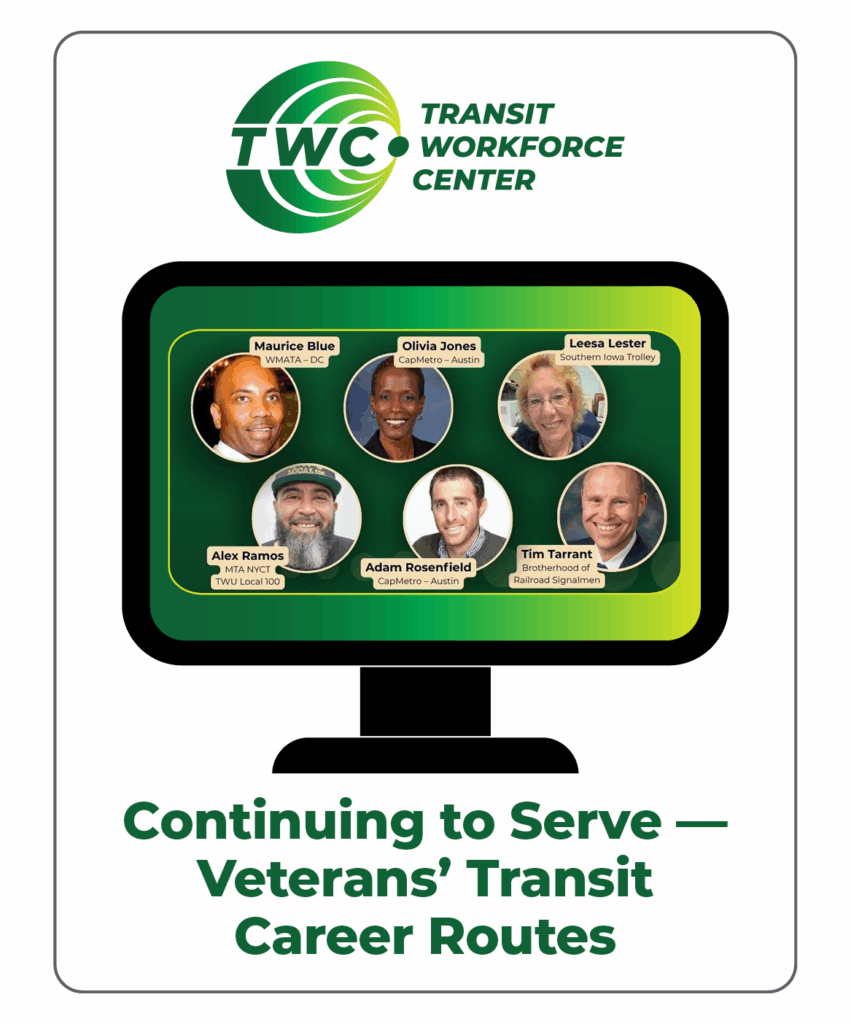
Continuing to Serve — Veterans’ Transit Career Routes
Transit Workforce Center
November 2025
In celebration of Veterans Day, TWC and external partners hosted a webinar exploring public transportation workforce pathways and opportunities for veterans. Check out the webinar recording below to hear from transit agencies and veterans about the experience veterans bring to public transportation, the various career trajectories they can follow in the industry, and how to launch veteran-focused outreach and recruitment programs. Several of the veterans and agencies were also represented in the Transit Career Story, Continuing to Serve — Veterans’ Transit Career Routes.
- Maurice Blue — Senior Sourcing Officer, Proactive Sourcing, Washington Metropolitan Area Transit Authority (WMATA)
- Olivia Jones — Director, Operations Control Center and Training, CapMetro
- Leesa Lester — Transit Director, Southern Iowa Trolley
- Alex Ramos — Outreach Coordinator, Transport Workers Union Local 100/Training Upgrade Fund; Light Maintainer, Metropolitan Transportation Authority–New York City Transit
- Adam Rosenfield — Program Manager, Workforce Outreach, CapMetro
- Tim Tarrant — Vice President for Commuter/Passenger, Brotherhood of Railroad Signalmen
Recording:

Streamlining Operator Hiring Practices — Key Takeaways from TWC’s Review of Existing Research
TWC is launching a new research effort aimed at documenting current transit agency hiring processes for operators and producing new resources to support agencies’ operator hiring efforts. The first part of the initiative is this introductory brief which reviews prior research on operator hiring practices in the transit industry, including best practices and lessons from other industries.
Transit Workforce Center
November 2025
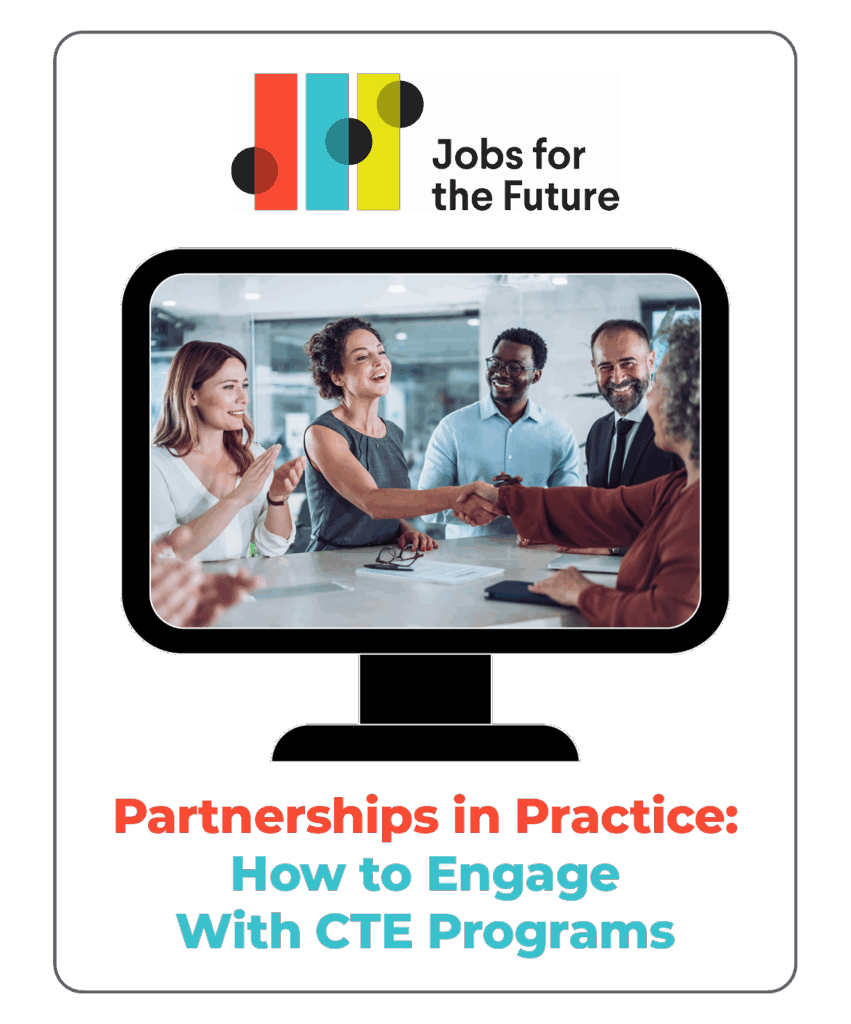
Partnerships in Practice: How to Engage With CTE Programs
This guide outlines a range of ways employers can engage with community college career and technical Education (CTE) programs, which are shown to be local sources of skilled workers. Offering strategies, tools, and advice for employers, it’s a companion piece to the JFF Power Your Workforce playbook.
Jobs for the Future
September 2025
Check out TWC’s college partnership case study for examples from transit of agencies engaging with their local college partners.

Power Your Workforce
This playbook introduces the business value of partnering with CTE, explains how these programs prepare learners with in-demand skills, and shows how employers can tap into this pipeline to meet current and future workforce needs. It explains how community college CTE programs work and provides a clear path to collaboration. It’s companion piece, Partnerships in Practice, offers strategies, tools, and advice for working with local colleges.
Jobs for the Future
September 2025
Check out TWC’s college partnership case study for examples from transit of agencies engaging with their local college partners.
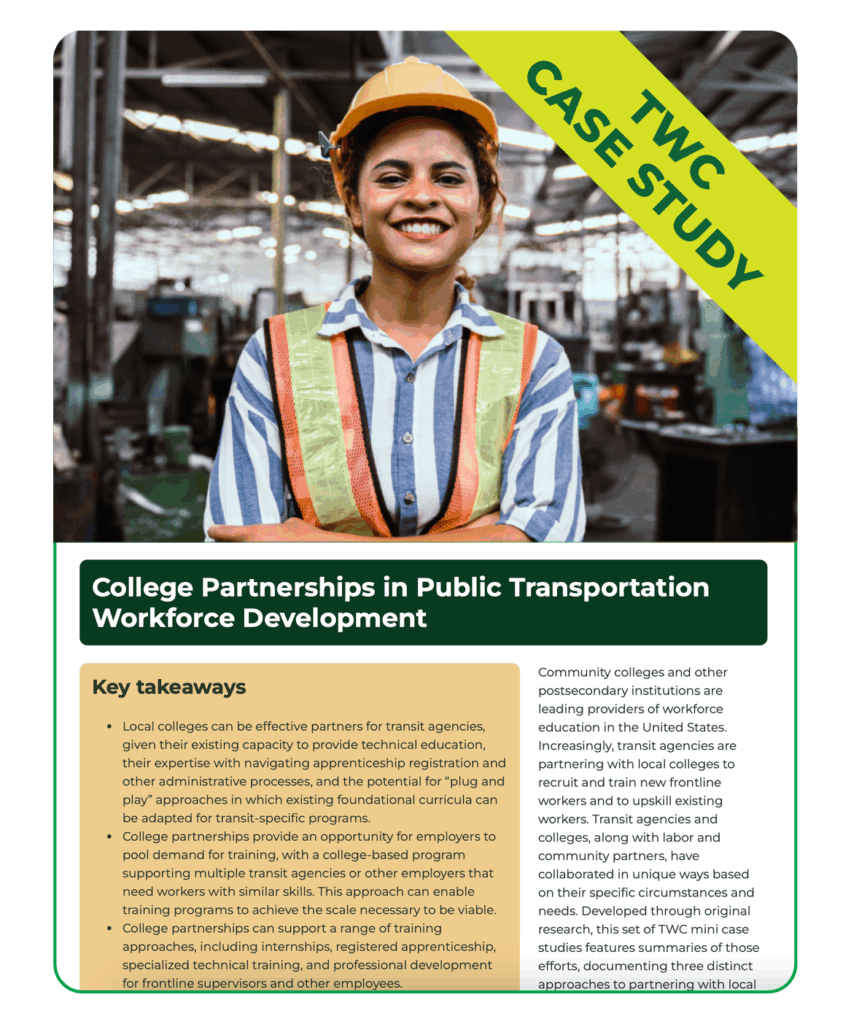
College Partnerships in Public Transportation Workforce Development
Community colleges and other postsecondary institutions are leading providers of workforce education in the United States. Increasingly, transit agencies are partnering with local colleges to recruit and train new frontline workers and to upskill existing workers. Transit agencies and colleges, along with labor and community partners, have collaborated in unique ways based on their specific circumstances and needs. Developed through original research, this set of TWC mini case studies features summaries of those efforts, documenting three distinct approaches to partnering with local colleges.
Transit Workforce Center
September 2025
TOPICS: Apprenticeship , Career Pathways , Community Engagement , Hiring and Recruitment , Training
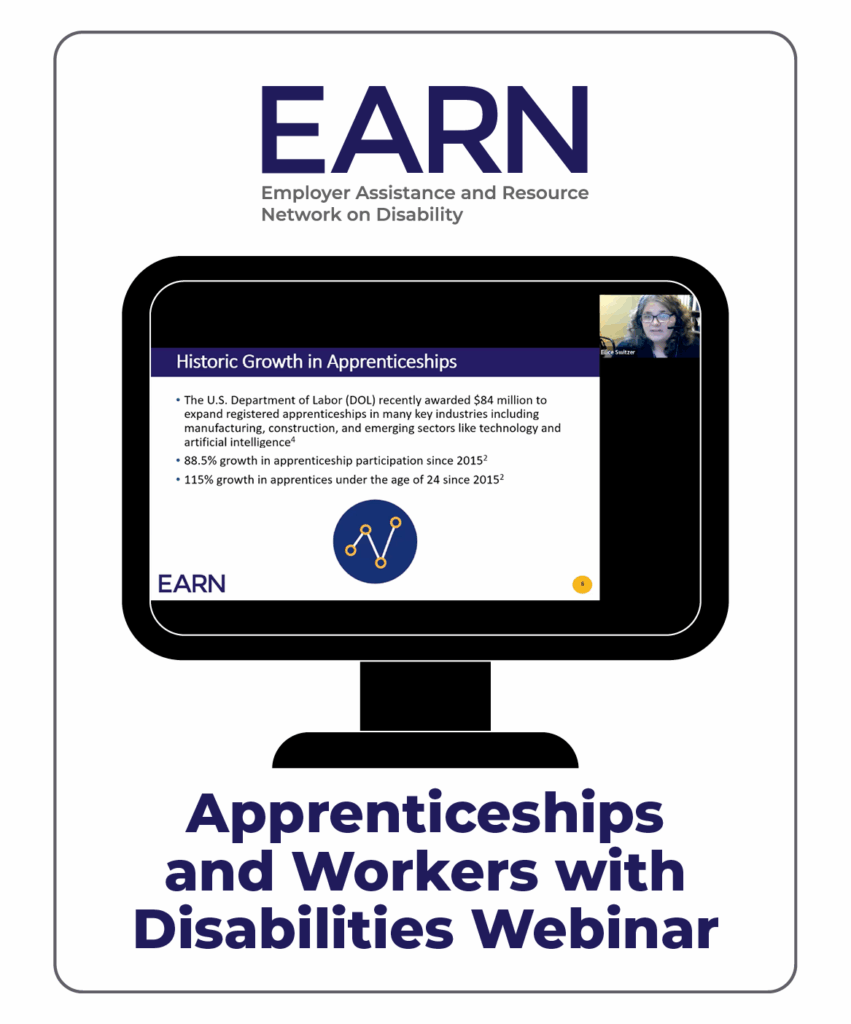
Apprenticeships and Workers with Disabilities Webinar
Employer Assistance and Resource Network on Disability
August 2025
Paid apprenticeships combine education and on-the-job training to prepare workers for long-term career success. By ensuring that all qualified candidates, including those with disabilities, have an opportunity to access apprenticeship opportunities, employers benefit from a broader pool of qualified workers. This webinar recording details practical strategies for recruiting and supporting apprentices with disabilities, as well as where to find recruitment resources and how to develop partnerships to build a talent pipeline. It also highlights a case example of a manufacturing business that credits its partnership with a local community-based organization serving jobseekers with disabilities with saving the local business.
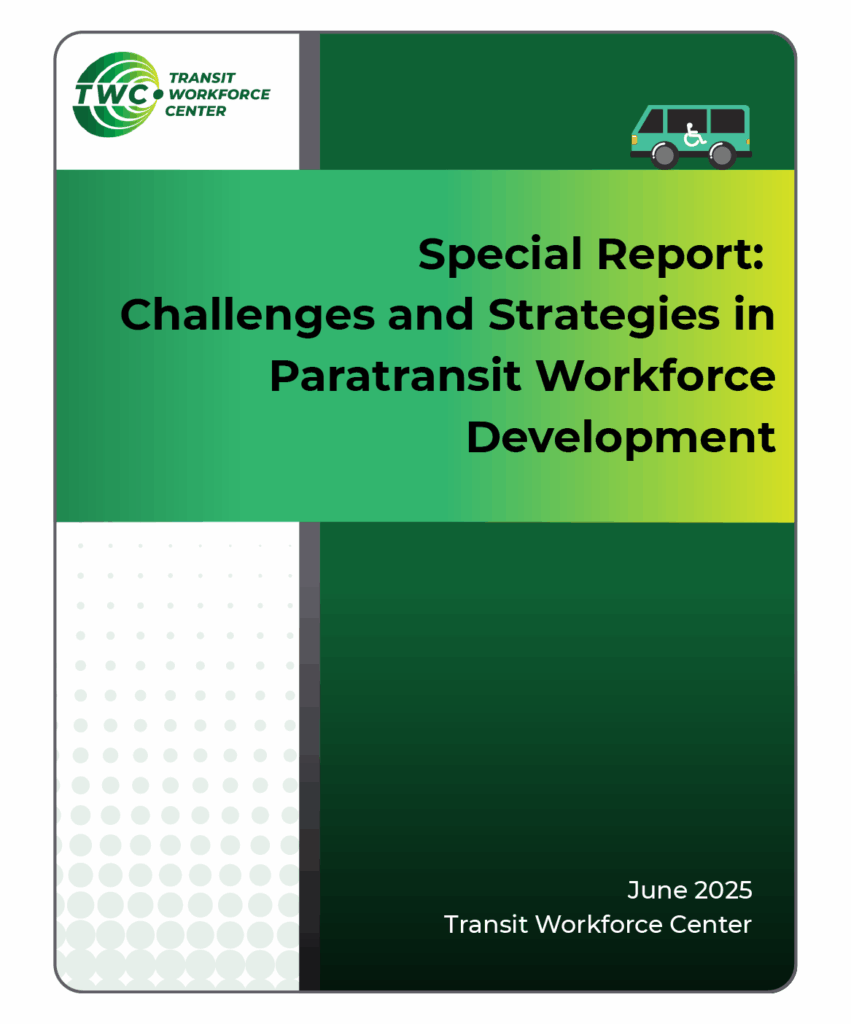
Special Report: Challenges and Strategies in Paratransit Workforce Development
Transit Workforce Center
June 2025
TOPICS: Hiring and Recruitment , Policy and Planning , Retention , Training , Workforce Shortage
Since the passage of the Americans with Disabilities Act (ADA) in 1990, paratransit has been a staple component of public transportation systems across the United States. ADA complementary paratransit provides transportation to people who, because of a disability, cannot use fixed-route service independently. Despite the importance of this mode in the overall health of urban transportation infrastructure, very little research has focused on the development of the paratransit workforce since a seminal 2010 study on paratransit operator recruitment and retention. This report aims to provide a brief update to the 2010 study, focusing not just on operators but on the entire paratransit workforce, including a range of frontline roles. To learn more about the unique workforce challenges of this modal context, as well as what successful strategies paratransit providers have used to combat those challenges, the Transit Workforce Center (TWC) research team conducted interviews involving 22 individuals across 13 paratransit systems in nine states. This report documents our learning from those interviews.
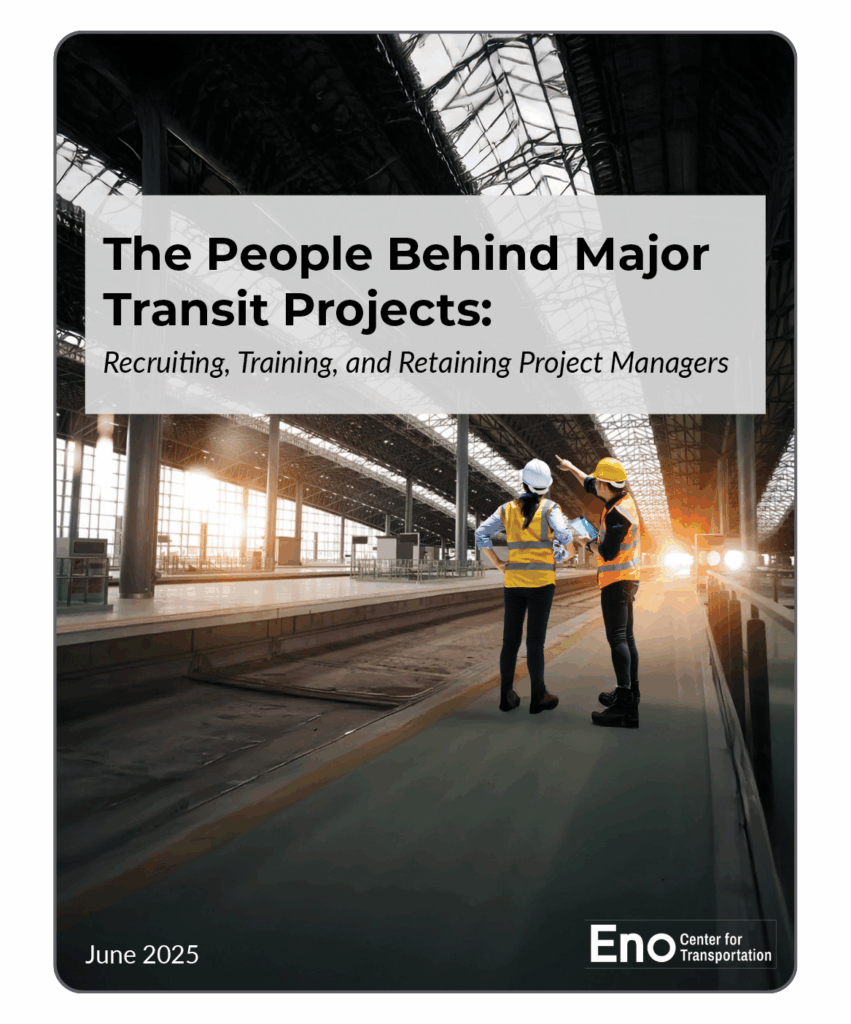
The People Behind Major Transit Projects
The People Behind Major Transit Projects explores strategies to help agencies better recruit, train, and retain project managers for large transit projects. It examines the challenges these managers face, and highlights the skills, experience, and support they need to succeed.
Eno Center for Transportation
June 2025
TOPICS: Hiring and Recruitment , Policy and Planning , Retention
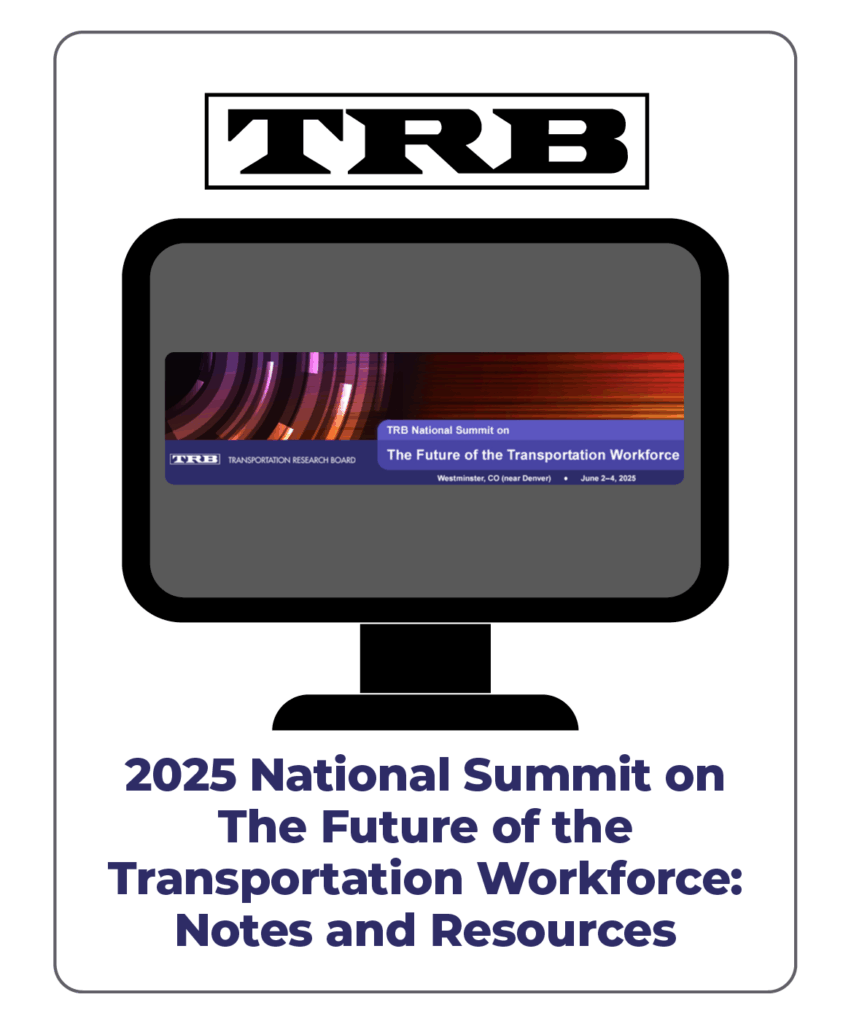
2025 National Summit on The Future of the Transportation Workforce: Notes and Resources
TRB held the National Summit on the Future of the Transportation Workforce on June 2-4, 2025 in Westminster, CO. This was the first national conversation on this critical issue since 2012. Thought leaders in transportation workforce recruitment, training, retention, and knowledge management met to discuss and address the challenges faced in each step of the workforce life cycle. Attendees included representatives from federal, state, and local transportation agencies; Metropolitan Planning Organizations; public transit agencies; academia; and private industry. Notes and resources from the conference can be found on this landing page.
Transportation Research Board
June 2025
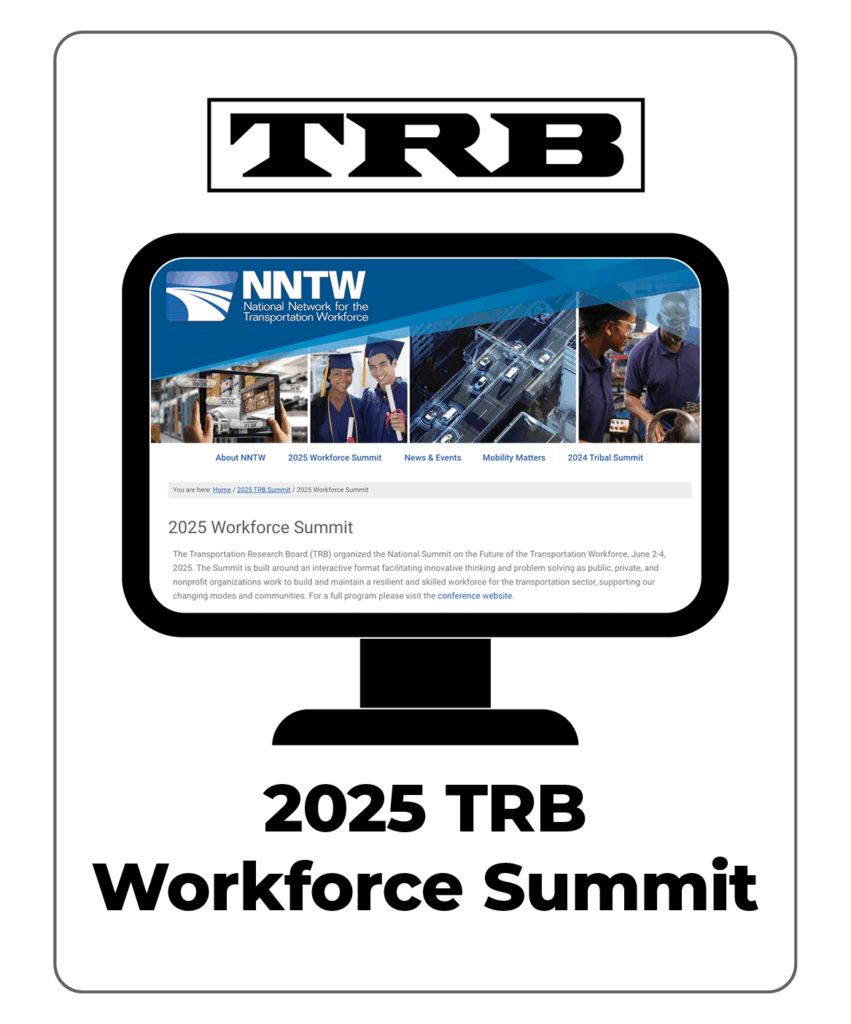
2025 TRB Workforce Summit
The Transportation Research Board (TRB) organized the National Summit on the Future of the Transportation Workforce, June 2-4, 2025. The Summit is built around an interactive format facilitating innovative thinking and problem solving as public, private, and nonprofit organizations work to build and maintain a resilient and skilled workforce for the transportation sector, supporting our changing modes and communities. This landing page provides links to pre-conference webinars and briefing papers from summit sessions.
Transportation Research Board
June 2025
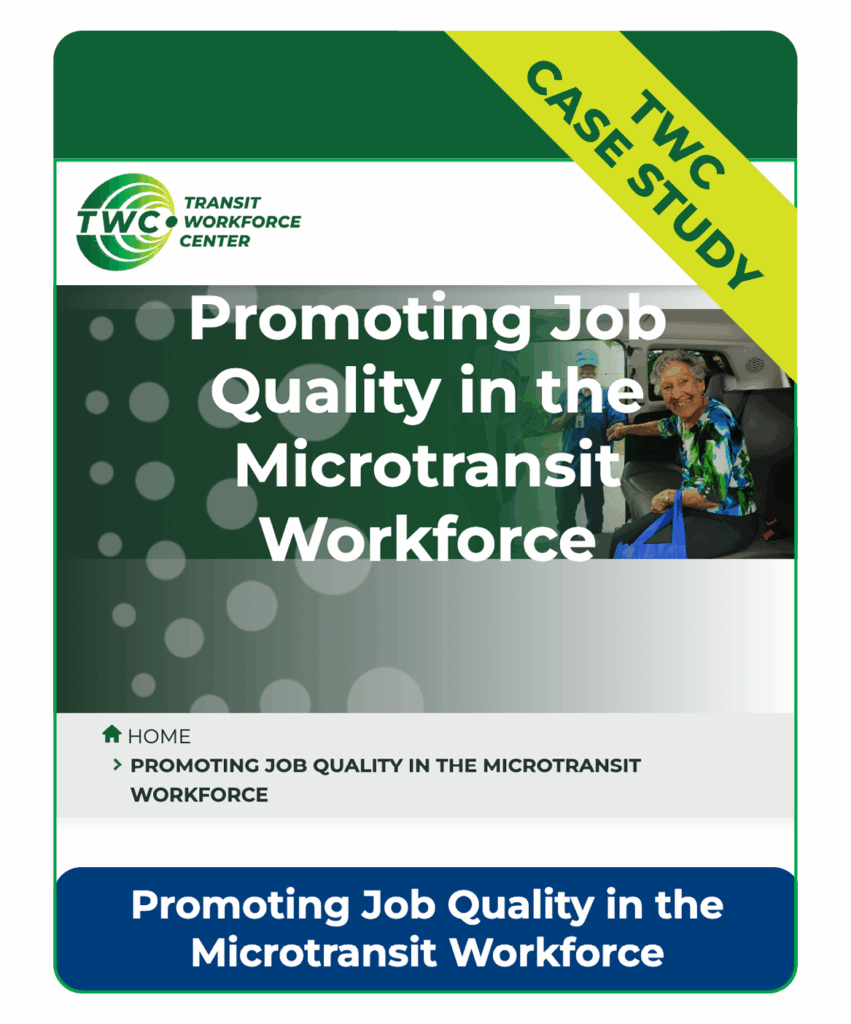
Case Study: Promoting Job Quality in the Microtransit Workforce
Microtransit, a relatively new form of demand response public transportation, is on the rise. TWC’s new set of microtransit case studies provides various perspectives on microtransit that include examples of how it has successfully been provided in-house and with a union-represented workforce. The case studies share experiences from four transit locations that are implementing microtransit service in ways that promote job quality for operators, technicians, and others, while also providing greater control over the quality of the service.
Transit Workforce Center
May 2025
TOPICS: Career Pathways , Hiring and Recruitment , Policy and Planning , Retention , Training
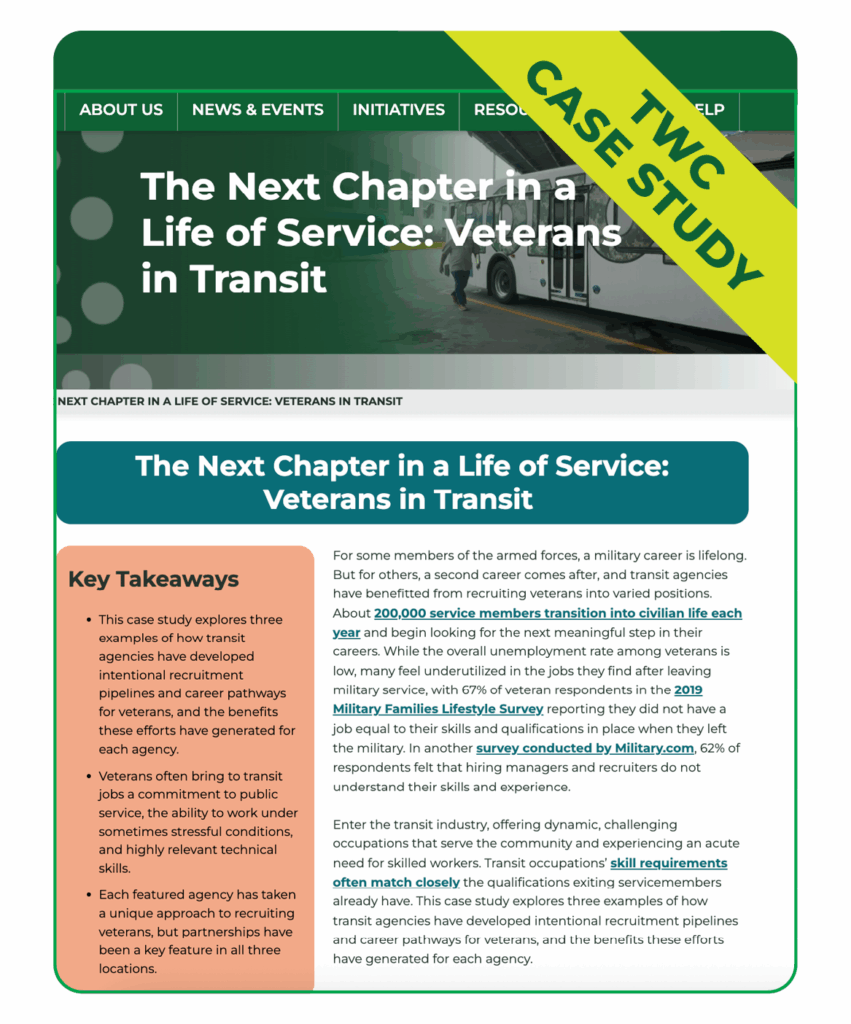
Case Study—The Next Chapter in a Life of Service: Veterans in Transit
For some members of the armed forces, a military career is lifelong. But for others, a second career comes after, and transit agencies have benefitted from recruiting veterans into varied positions. About 200,000 service members transition into civilian life each year and begin looking for the next meaningful step in their careers.
The transit industry offers dynamic, challenging occupations that serve the community and is experiencing an acute need for skilled workers. Transit occupations’ skill requirements often match closely the qualifications exiting servicemembers already have. This case study explores three examples of how transit agencies have developed intentional recruitment pipelines and career pathways for veterans, and the benefits these efforts have generated for each agency.
Transit Workforce Center
March 2025
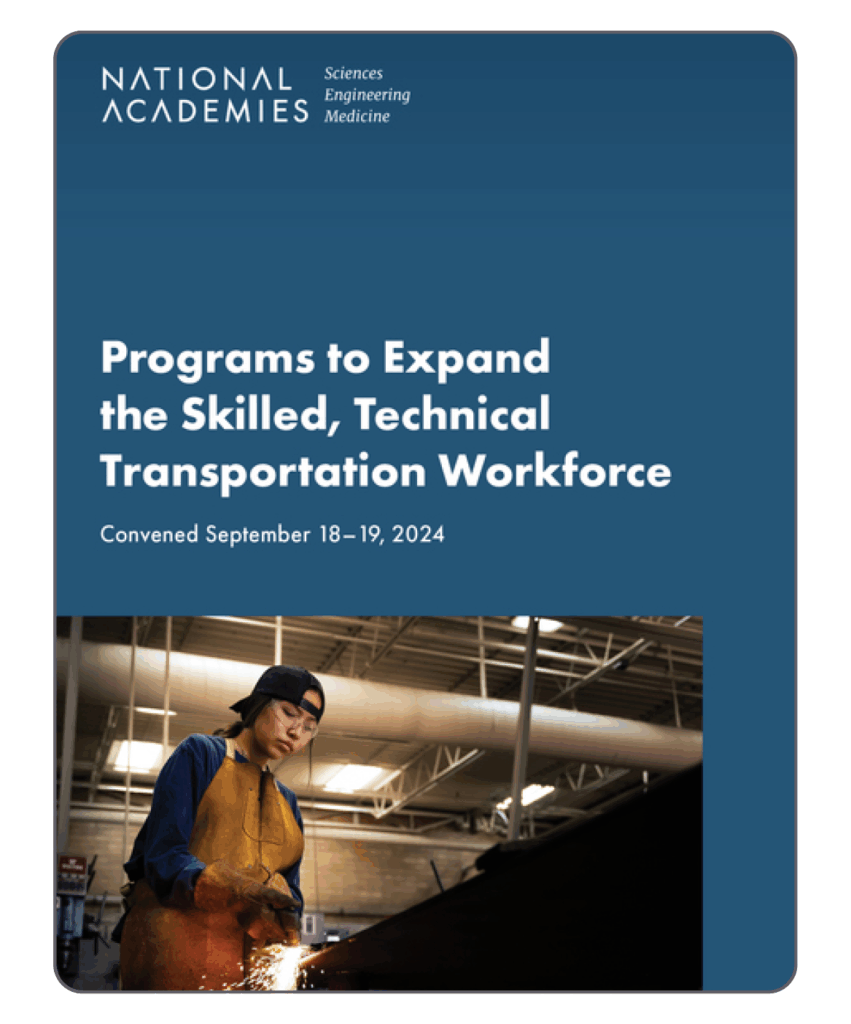
Programs to Expand the Skilled, Technical Transportation Workforce
Programs to Expand the Skilled, Technical Transportation Workforce: Proceedings of a Workshop summarizes the Workforce held in September 2024 at the National Academies of Sciences Building in Washington, DC. The workshop was sponsored by the Federal Transit Administration and the National Science Foundation and brought together experts and educators across academia, government, and industry.
National Academies of Sciences Engineering and Medicine
March 2025
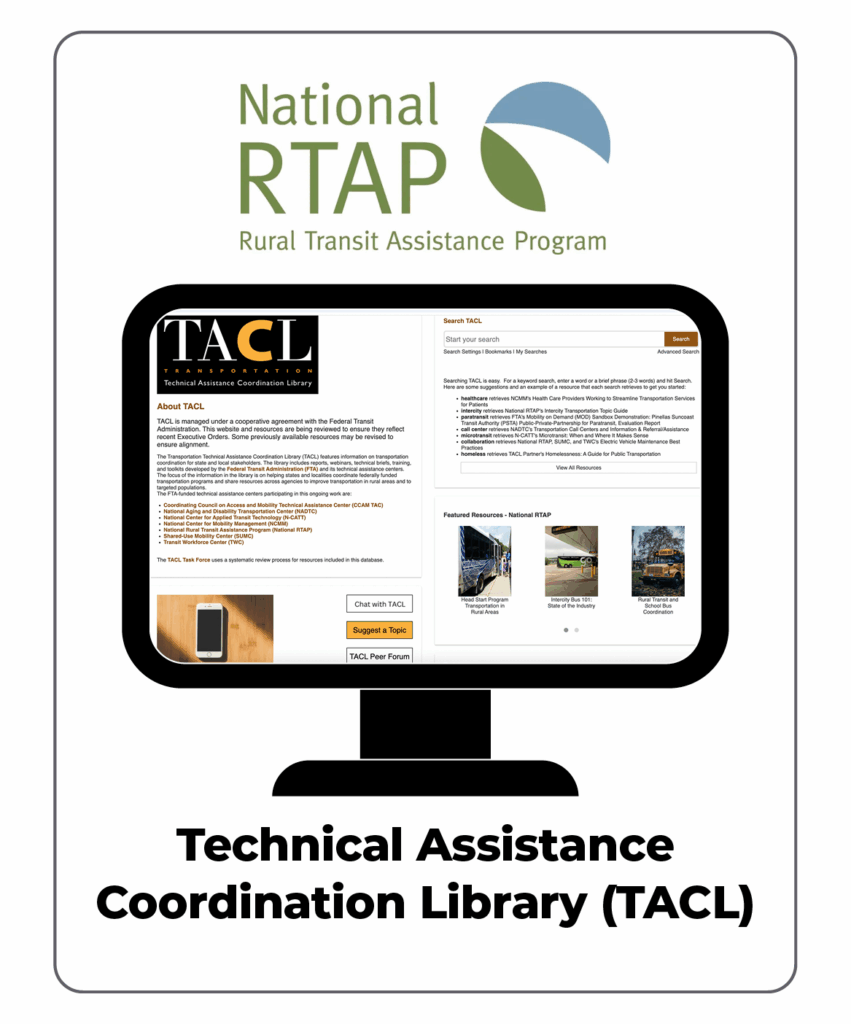
Technical Assistance Coordination Library (TACL)
National Rural Transit Assistance Program
TOPICS: Apprenticeship , Career Pathways , Community Engagement , Hiring and Recruitment , Labor-Management Partnerships , Low-No , Mentorship , Policy and Planning , Procurement , Program Evaluation and ROI , Retention , Safety and Health , Trainer and Mentor Development , Training , Workforce Shortage
Transportation Technical Assistance Coordination Library (TACL)
The Transportation Technical Assistance Coordination Library (TACL) provides a viable methodology and platform for access and findability of rural and tribal transit coordination resources across a broad range of transportation technical assistance centers and the Federal Transit Administration (FTA).
The FTA-funded Technical Assistance (TA) Centers participating in this ongoing work are:
- National Aging and Disability Transportation Center (NADTC)
- National Center for Applied Transit Technology (N-CATT)
- National Center for Mobility Management (NCMM)
- National Rural Transit Assistance Program (National RTAP)
- Shared Use Mobility Center (SUMC)
- Transit Workforce Center (TWC)
The TACL Task Force uses a systematic review process for resources included in the database. New resources will be added on a quarterly basis. Let us know if you would like to serve as a peer reviewer for our resources.
Why was TACL created?
The United States Government Accountability Office (GAO) published Public Transportation: Enhanced Federal Information Sharing on Coordination Could Improve Rural Transit Services in January 2020. GAO recommended that FTA “develop a communication plan that will effectively share information with state and local stakeholders on coordination opportunities in an accessible and informative way.” This effort was created to improve interagency resource coordination between FTA and its five TA Centers.
How can TACL be used?
TACL resources can be used to identify high quality technical assistance on transportation coordination. The resources can be used for research, training, practice, operations, planning, and other purposes. We encourage authors to cite TACL resources.
Ready to get started?
Visit http://transportation-tacl.org. Click on the Training tab at the top for instructions.
If you have a question about TACL, or if you would like to be considered to become a TACL peer reviewer, please contact info@nationalrtap.org
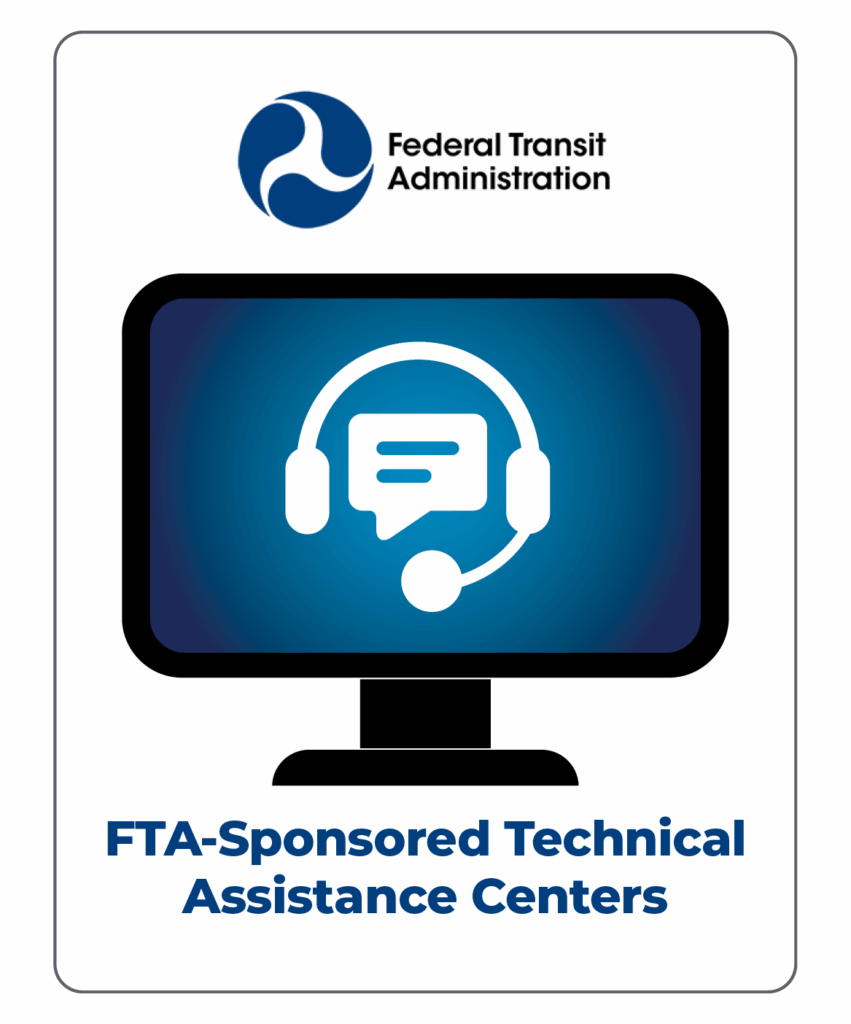
FTA-Sponsored Technical Assistance Centers
Federal Transit Administration
TOPICS: Apprenticeship , Career Pathways , Community Engagement , Hiring and Recruitment , Labor-Management Partnerships , Low-No , Mentorship , Policy and Planning , Procurement , Program Evaluation and ROI , Retention , Safety and Health , Trainer and Mentor Development , Training , Workforce Shortage
FTA’s Technical Assistance and Workforce Development Program (49 U.S.C. § 5314) and the Public Transportation Innovation Program (49 U.S.C. § 5312) fund technical assistance centers through national nonprofit organizations across a number of areas to improve public transportation. These nonprofit partners and the work they do play a critical role in supporting public transit agencies. Their services help to:
- Improve transportation for older adults and people with disabilities
- Drive the adoption of mobility management and related promising practices
- Accelerate innovative mobility practices and strategies
- Support rural communities
- Leverage new transit technologies
- Train the public transit workforce
- Provide workforce development technical assistance
- Support research projects chosen by the transit industry that address day to day issues
- Support the transit industry meet safety regulations
National Center for Applied Transit Technology (N-CATT)
The National Center for Applied Transit Technology (N-CATT) delivers expert, focused technical assistance to transit agencies and organizations in rural areas and small cities to use or develop transit technologies and innovations that make services more cost-effective and efficient. N-CATT’s work supports FTA’s mission and focus on innovation by developing and supporting transit programs and services in rural and small-city America.
National Aging and Disability Transportation Center (NADTC)
The National Aging and Disability Transportation Center (NADTC) is a national technical assistance center funded by FTA with guidance from the U.S. Department of Health and Human Services’ Administration for Community Living to promote the availability of transportation options that serve the needs of people with disabilities, seniors and caregivers with a focus on the Section 5310 program and other transit investments. NADTC supports the delivery of more effective, efficient, high-quality and coordinated specialized transportation services that maximize federal investments. NADTC provides technical assistance, information and referral; develops field training; implements interactive communication and outreach strategies; and supports communities in assessing their needs and developing innovative transportation solutions.
National Rural Transit Assistance Program (National RTAP)
The National Rural Transportation Assistance Program (RTAP) was established by FTA in 1987 to provide a wide range of professional services and products. National RTAP addresses the training and technical assistance needs of rural and tribal transit programs across the nation and supports state RTAP programs. National RTAP provides comprehensive free technical assistance programs and resources including training materials, webinars, newsletters and technical briefs, peer resources, research, and innovative technology initiatives. The National RTAP also manages the Transportation Technical Assistance Coordination Library (TACL), which provides a sustainable methodology and platform to access resources across a diverse range of transportation technical assistance centers and FTA.
Shared-Use Mobility Center (SUMC)
The Shared-Use Mobility Center is a public-interest organization dedicated to achieving equitable, affordable, and environmentally sound mobility across the US through the efficient sharing of transportation assets. By connecting the public and private sectors, piloting programs, conducting new research, and providing policy and technical expertise to cities and regions, SUMC seeks to extend the benefits of shared mobility for all. The Shared Mobility 2030 Action agenda includes improving access to public transit, on-demand shuttles or buses, ride-on-demand services, carpooling and vanpooling, and carsharing, bikesharing and scooter-sharing.
Coordinating Council on Access and Mobility (CCAM)
The strategic goal of CCAM, operated but the Community Transportation Association of America, is to support federal agencies, their grantees, partners, and stakeholders in improving transportation access for people with disabilities, older adults, and individuals of low income. CCAM promotes and facilitates human services transportation, public transit, and non-emergency medical transportation (NEMT) coordination that advances people’s access to everyday destinations.
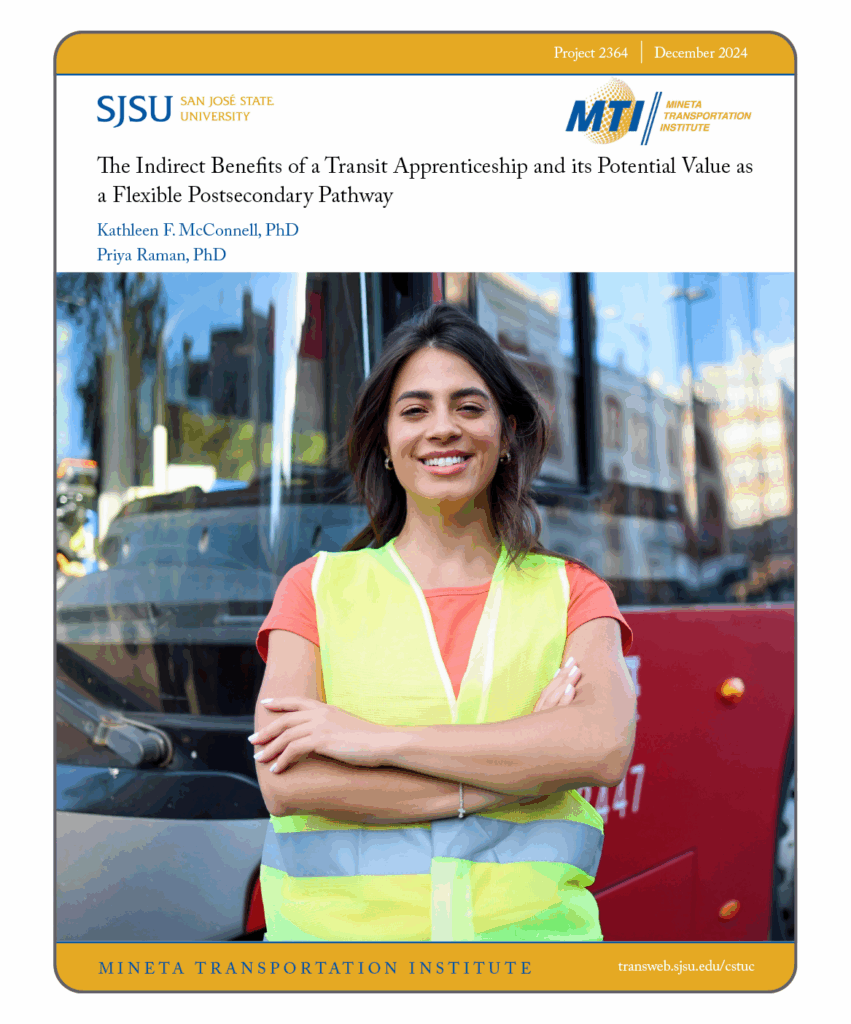
The Indirect Benefits of a Transit Apprenticeship and its Potential Value as a Flexible Postsecondary Pathway
As apprenticeships become more prevalent in the transit industry, they can also emphasize both technical and soft skills to invest in career advancement. This can attract young people to transit careers, which helps address challenges with recruitment and an aging workforce. Santa Clara Valley Transportation Authority’s Joint Workforce Initiative (JWI) employs this model by formally recognizing skills acquisition with accredited certificates. This study explores the JWI’s strengths within the revival of non-degree credentials fueled by efforts like the California Guided Pathways Program. Drawing on guidelines for connecting job training with degree programs, the study details the importance of affordability, portability, and articulation and outlines how these features could be further developed in the JWI.
Mineta Transportation Institute
December 2024
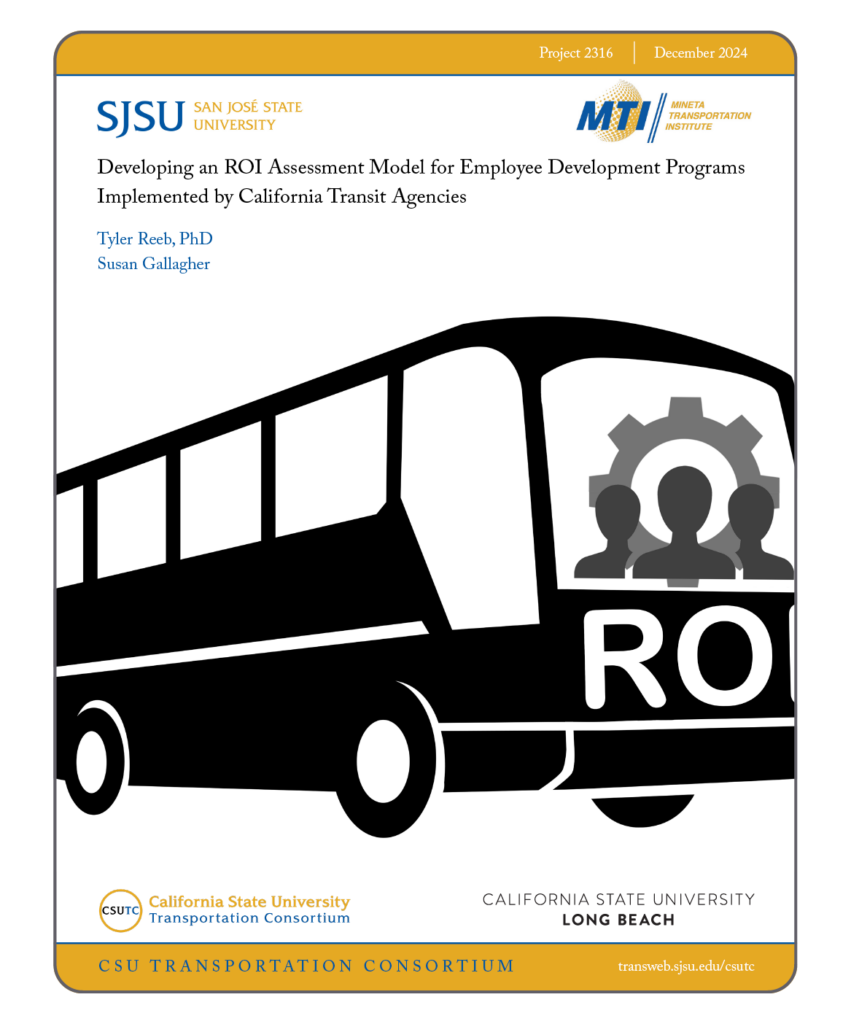
Developing an ROI Assessment Model for Employee Development Programs Implemented by California Transit Agencies
Mineta Transportation Institute (MTI)
December 2024
Transit agencies will necessarily incur expenses in efforts to improve the recruitment, retention, and morale of employees, but will struggle to solicit adequate funding unless they are able to demonstrate the value of such efforts to a broader audience. Thus, developing and implementing ROI assessments is critical. The literature review, survey, and follow-up interviews conducted by the MTI research team found that program outcome measures and programmatic expense data required for ROI is similar across employee development programs but is not currently being uniformly collected across agencies. The research findings demonstrate the need for technical assistance to combat data collection challenges such as staff capacity and know-how.
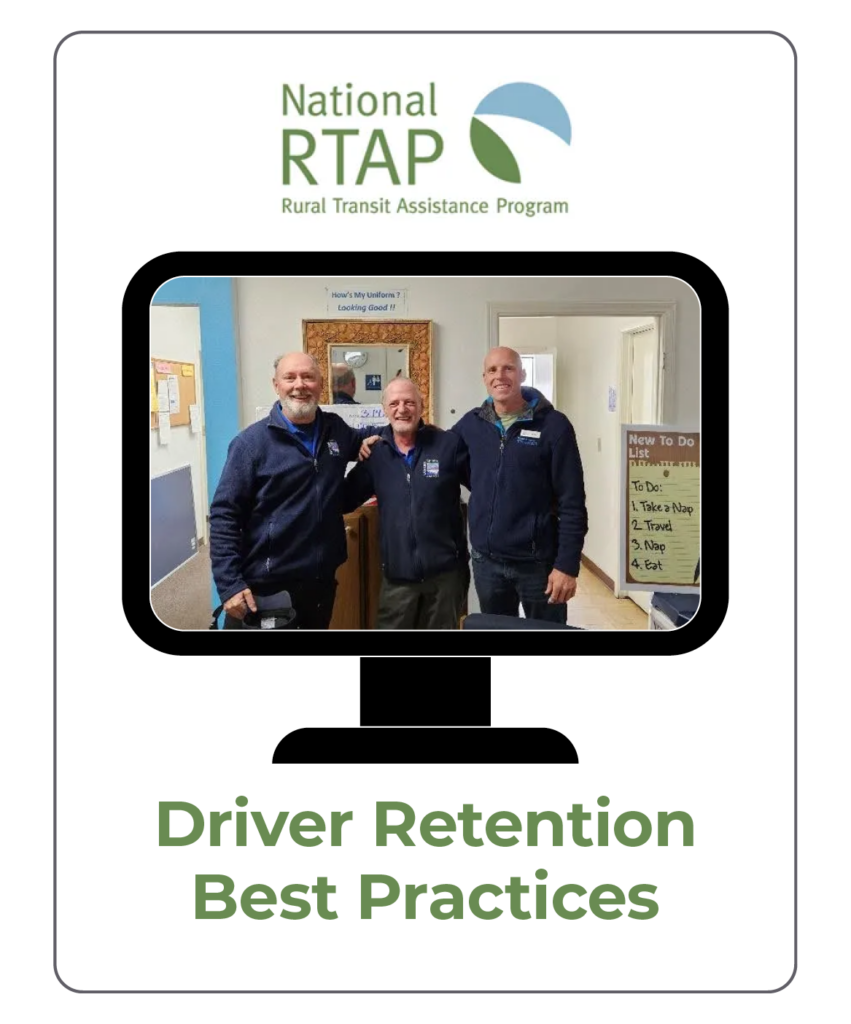
Driver Retention Best Practices
National RTAP
December 2024
TOPICS: Hiring and Recruitment , Retention , Workforce Shortage
It is increasingly difficult to recruit and retain rural and tribal transit drivers. This National RTAP Best Practices Spotlight Article provides practical and easy-to-implement strategies from transit leaders that agencies can use to create a workplace that drivers will want to remain in and thrive in. This article includes advice from Eastern Sierra Transit Authority (ESTA), Redding Area Bus Authority (RABA), Heart of Iowa Regional Transit Agency (HIRTA), and Big Woods Transit (BWT).
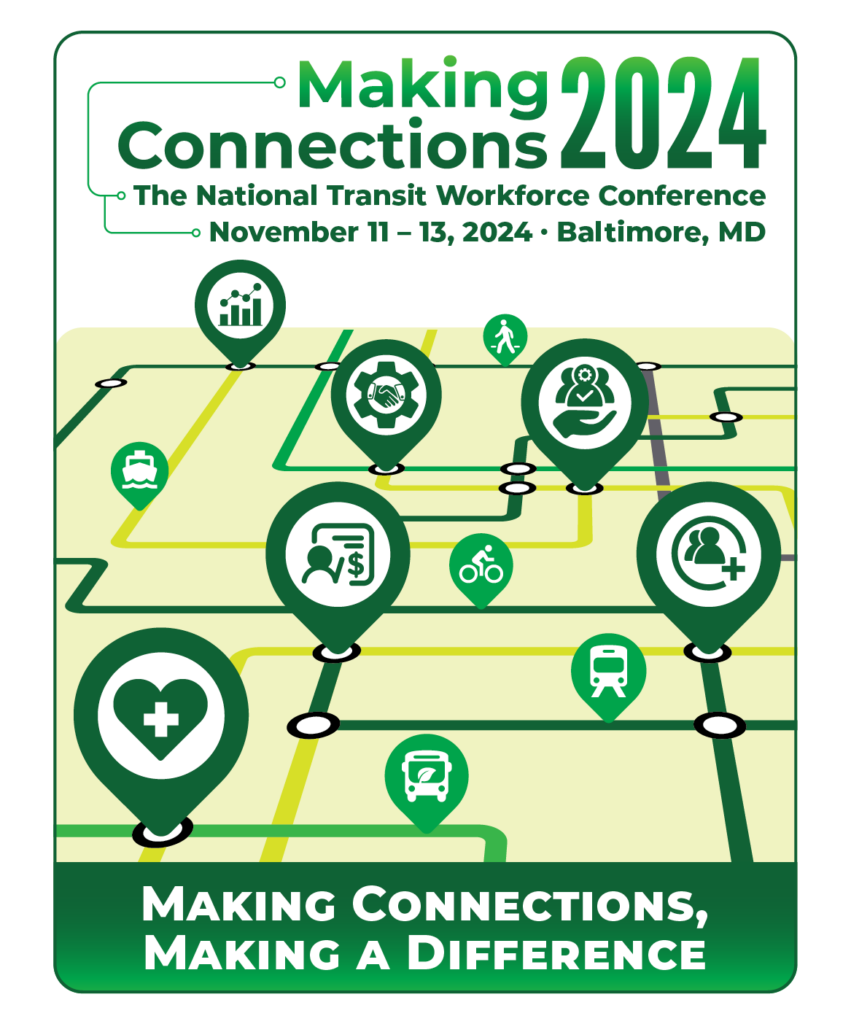
Making Connections 2024 – The College Connection: Strategies for Effective Partnerships
This session about partnerships between transit and local colleges was presented as part of TWC’s Making Connections 2024 transit workforce conference in November, 2024.
Transit Workforce Center
November 2024
Session Description: Strong partnerships between transit and local colleges across the country currently support recruitment, retention, apprenticeships and other career advancement initiatives developed by agencies and their workforce partners. Presenters in this session reviewed and discussed several different models of industry-education partnerships, focusing on how to establish productive working relationships with local colleges to advance workforce development goals.
Moderator:
- Patricia Greenfield: Senior Director, Workforce Education – International Transportation Learning Center / Transit Workforce Center
Speakers:
- Jamaine “G” Gibson: Director of Apprenticeships and Workforce Development – Amalgamated Transit Union
- Jason Abbott: Executive Director, Workforce Operations – Cuyahoga Community College
- Celeste Chavis: Interim Chair and Professor, Transportation & Urban Infrastructure Studies – Morgan State University (Baltimore)
- Rich Diaz: Workforce Development Coordinator – Amalgamated Transit Union Local 1575
- Rob Gamble: Sr Workforce and Academic Strategist – California Transit Works!

Making Connections 2024 – Foundational Skills for Successful Career Pathways in a Changing Industry
This session about career pathways was presented as part of TWC’s Making Connections 2024 transit workforce conference in November, 2024.
Transit Workforce Center
November 2024
Session Description: In this engaging session attendees explored strategies for bridging the skills gaps of new hires and heard from presenters as they shared how they identified critical needs and implemented solutions. Participants took part in a working group to provide feedback on national resources being developed in key areas such as mechanical, electrical, computer skills, shop math, and technical writing.
Moderator:
- Kristen Ribaudo: Senior Instructional Designer – International Transportation Learning Center / Transit Workforce Center
Speakers:
- Michael Hanssen: Supervisor of Technical Skills Training Washington – Metropolitan Area Transit Authority
- Ona Veda: Manager, Rail Training and Development – Metro Transit (MN)

Making Connections 2024 – Tracking Your Impact: How Agencies and Unions Analyze and Use Workforce Data
This session about measuring metrics for workforce development initiatives was presented as part of TWC’s Making Connections 2024 transit workforce conference in November, 2024.
Transit Workforce Center
November 2024
Session Description: Employment in public transportation is affected by broad economic and demographic dynamics, but honing in on transit workforce trends can be challenging. The Transit Workforce Center created the Transit Workforce Data Dashboard to distill relevant data points from national datasets. In this session, TWC highlighted specific employment patterns and challenges in transit-related occupations and panelists covered research and trends in national and agency-level datasets.
Moderator:
- Michaela Boneva: Research Associate – International Transportation Learning Center / Transit Workforce Center
Speakers:
- Nick Biggar: District Director – Greater Cleveland RTA
- Valerie Campo: Mentor Program Coordinator – Champaign-Urbana Mass Transit
- Douglas Nevins: Senior Researcher – International Transportation Learning Center / Transit Workforce Center
- Darnell Morris: Vice President – ATU Local 268, Greater Cleveland RTA
- Dr. Shanta Hejmadi: Senior Data Scientist– Metro Transit (MN)

Making Connections 2024 – What Do Young People Want from a Transit Career?
This session about outreach and retention of youth in transit was presented as part of TWC’s Making Connections 2024 transit workforce conference in November, 2024.
Transit Workforce Center
November 2024
Session Description: As the transit industry works to reach out to the communities it serves to establish strong and effective career pipelines, agencies and their partners often explore how to best attract young people into the industry. In this session, attendees heard from and engaged with young people themselves, along with national and local experts who have conducted research and worked directly with youth. Topics covered include the most effective approaches to connecting with young people and creating awareness and excitement about career opportunities in public transportation.
Moderator:
- Dr. Beverly Scott: Founder and CEO – Introducing Youth to American Infrastructure
Speakers:
- Justin Augustine: Project Manager II – Alameda-Contra Costa Transit District
- Kayla Cooper-Redd: 12th Grade Student – TransSTEM Academy, Cardozo High School (DC)
- Sean Holley: Bus Transportation Instructor – Maryland Transit Administration
- Cheryl Rodgers: Director – TransSTEM Academy, Cardozo Education Academy (DC)
- Edwin Rodriguez: Director – Office of Research Management, Innovation, and Outreach – Federal Transit Administration
- Jamaal Schoby: Transportation Planner – Transportation Research Board

Making Connections 2024 – Apprenticeship 101 – How Transit Apprenticeship Operates
This session about transit apprenticeships was presented as part of TWC’s Making Connections 2024 transit workforce conference in November, 2024.
Transit Workforce Center
November 2024
Session Description: Apprenticeship programs are rapidly expanding at transit locations across the country. With quality training tied to clearly-identified career ladders and advancement, these programs are commonly regarded as the “gold standard” of workforce development. Documented benefits include increased retention, reductions in absenteeism, and the creation of a sustainable talent pipeline. These programs also result in better employee morale and a more engaged workforce. In this session, presenters walked through the essential steps to developing, registering, and implementing an apprenticeship program. Attendees heard from and engaged with transit labor and management about their joint programs including bus maintenance, traction power, HVAC/facilities, and signals/communications—and explore how to locate and access resources to support new and existing programs.
Moderator:
- Brian J. Turner: Founding Director – International Transportation Learning Center
Speakers:
- Michelle Allison: General Manager – King County Metro (WA)
- Maurice Beard: Senior Workforce Development Advisor –
- Norman Blessant: Financial Secretary/Treasurer – Amalgamated Transit Union Local 381 (UT)
- Rod Dunn: President – Amalgamated Transit Union Local 382 (UT)
- Brandee Gross: Program Manager, Workforce Development – Maryland Department of Transportation
- Dimas Koral-Arocho: Program Manager – King County Metro (WA)
- Stephanie Lewis: Workforce Development Project Manager – Center for Urban Transportation Research
- Kylee Parker: Shop Steward/Joint Apprenticeship Committee Chairman – Amalgamated Transit Union Local 1300 (MD)
- Jeff Stambaugh: Vice President – Amalgamated Transit Union Local 587 (WA)
- Greg Woodfill: President – Amalgamated Transit Union Local 587 (WA)

Making Connections 2024 – Making Mentoring Matter: Building and Strengthening Your Frontline Worker Mentorship Program
This full-day intensive session about mentorship was presented as part of TWC’s Making Connections 2024 transit workforce conference in November, 2024.
Transit Workforce Center
November 2024
Session Description: Are you looking to establish a program that increases retention, provides an edge in recruitment, and advances a positive and collaborative organizational culture? Well-organized mentorship programs with carefully-selected and trained mentors provide documented benefits for frontline workers and the organization as a whole. Check out this intensive full-day workshop to explore how to:
- Initiative, develop, manage, and maintain a strong mentorship program
- Establish a collaborative structure and culture that runs and maintains that program
- Select and train effective mentors
- Explore occupation-specific approaches, challenges, and systems
- Track metrics that measure progress and success
Throughout this full-day intensive, attendees engaged with experienced instructors, facilitators, and peers to:
- Review the foundational elements of transit-based mentorship programs
- Experience TWC’s mentor training program, including: a review of mentor roles; an introduction to varied learning styles; and an examination of communications and problem-solving skills
Moderators:
- Maurice Beard: Senior Workforce Development Advisor – International Transportation Learning Center / Transit Workforce Center
- Karitsa Holdzkom: Senior Policy Analyst – International Transportation Learning Center / Transit Workforce Center
Speakers:
- Stu Bass: Principal – Progress Worx; Founding Director – Keystone Development Partnership
- Nick Biggar: District Director – Greater Cleveland RTA
- Valerie Campo: Mentor Program Coordinator – Champaign-Urbana Mass Transit
- Lee Estis: Mentor Program Coordinator – Metropolitan Council-Metro Transit (MN)
- Jamaine “G” Gibson: Director of Apprenticeships and Workforce Development – Amalgamated Transit Union
- Steve Jovel: Operations Manager, Workforce Development – Santa Clara Valley Transportation Authority
- Vanessa L’Esperance: Apprenticeship Program Coordinator – Metro Transit/ATU Local 1005 (MN)
- Dionna McCane: ATU Mentorship and Apprenticeship Coordinator – IndyGo
- Darnell Morris: Vice President – ATU Local 268, Greater Cleveland RTA
- Harpreet Singh: JWI Co-Director – Santa Clara Valley Transportation Authority

Making Connections 2024 – Creating Community Partnerships for Transit Career Pathways
This half-day intensive session about community partnerships was presented as part of TWC’s Making Connections 2024 transit workforce conference in November, 2024.
Transit Workforce Center
November 2024
Session Description: Check out this immersive half-day session designed to provide information, tools, and strategies that build a foundation for career pathways for community members into good jobs and great transit careers. Participants engaged in dialogue with transit professionals on the opportunities in the industry, gain insight into communicating about these opportunities, and explore approaches to establishing working partnerships with transit agencies and their labor and workforce partners.
Attendees dove into strategies and principles for impactful engagement, hearing firsthand accounts of successful collaborative initiatives and messaging strategies that emphasize the impact and value of working in an industry providing a vital public good. Participants gained invaluable insights into building sustainable workforce solutions that mutually benefit the industry and the community.
Key topics included:
- Exploring transit career opportunities
- Messaging and framing
- Building collaborative partnerships
- Real-world success stories
Moderator:
- David Stephen: Senior Communications Specialist – International Transportation Learning Center / Transit Workforce Center
Speakers:
- Rich Diaz: Workforce Development Coordinator – Amalgamated Transit Union Local 1575
- Theus Jones: Recording Secretary – Amalgamated Transit Union Local 689 (DC)
- Antonio Pollard: Organizer – Amalgamated Transit Union Local 689 (DC)
- Vanessa Sparks: Committee Member – Community Board 12-Queens Transportation Committee
- Carlene Thorbs: Chairperson – Community Board 12-Queens Transportation Committee
Directory of Grant Writers
National Rural Transit Assistance Program (RTAP)
October 2024
TOPICS: Funding Opportunities , Hiring and Recruitment
The purpose of this Directory is to connect transit managers looking to contract with grant writing consultants available for hire. Agencies can contact grant writers using their information provided by clicking the link below.
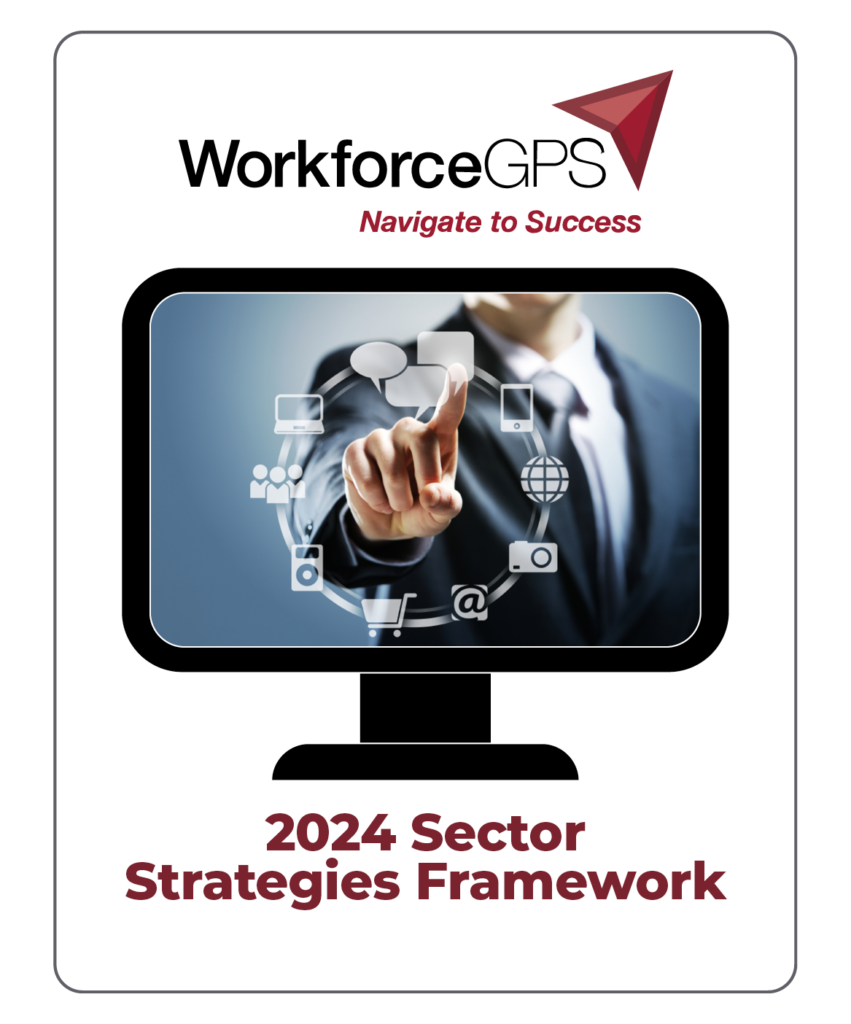
2024 Sector Strategies Framework
WorkforceGPS
September 2024
In September 2024, ETA released an updated Sector Strategies Framework to guide national, state, and local practitioners in their efforts to launch and implement effective sector strategies. The Framework is intended to advance knowledge and support the development, scaling, and durability of sector strategies. It provides workforce system practitioners with a clear picture of the concepts and elements essential to the successful implementation of sector partnerships and sector strategies. The Sector Strategies Framework was developed by ETA to harness lessons learned from the field, provide support to overcome common barriers, and help practitioners build knowledge in new areas.
Along with the Framework, the ETA released additional resources including:
- Implementation Guide and Self-Assessment and Action Planning Tool: Resources to help practitioners implement the Framework and assess and strengthen existing sector strategies efforts.
- ETA Blog Post: “Demand-driven training: Reimagining sector partnerships to build career pathways”
- Training and Employment Notice No. 08-24: Release and Availability of Updated 2024 U.S. Department of Labor’s Sector Strategies Framework
- Virtual Training Series: Learn more about the Framework and strategies to implement and scale sector strategies by viewing each session in this three-part series.
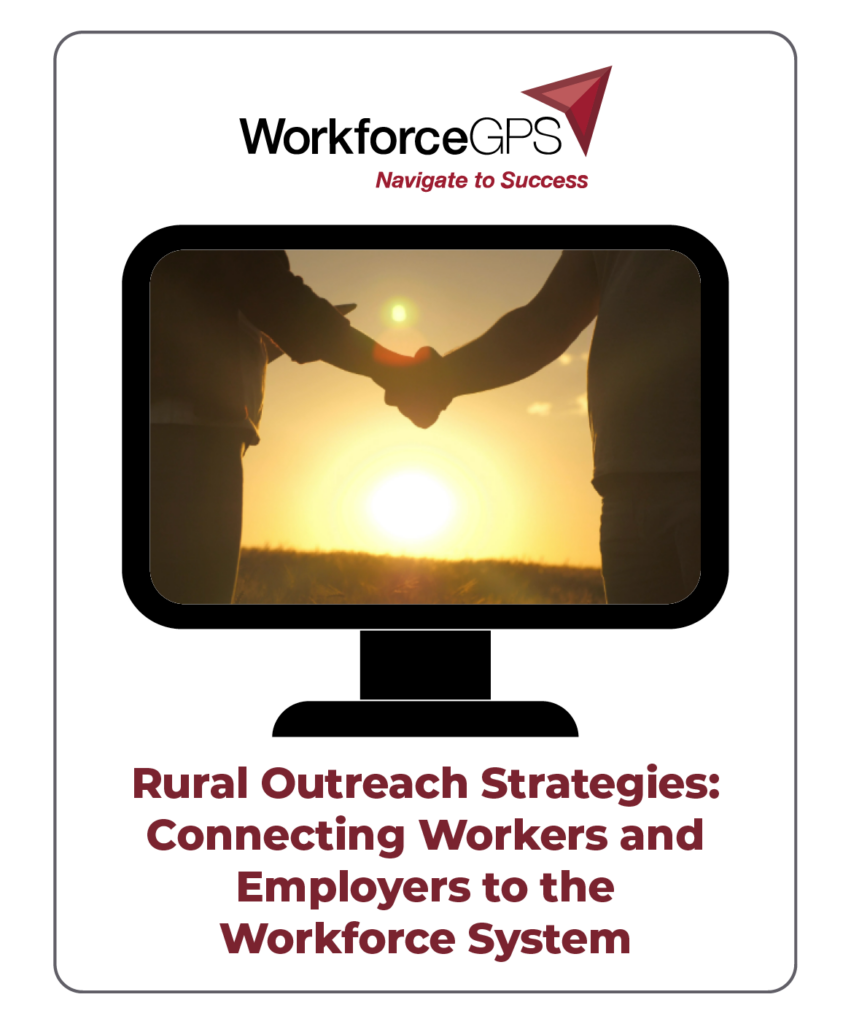
Rural Outreach Strategies: Connecting Workers and Employers to the Workforce System
WorkforceGPS
August 2024
Bringing services to rural workers and employers has long been a challenge in the workforce development system. This webinar features two real-world solutions: the use of mobile units, and the use of virtual job fairs.
Hear from South Carolina and Massachusetts about their successful implementation of their unique strategies.
MODERATOR(S)
- Tim Theberge, Division Director, Office of Trade Adjustment Assistance
PRESENTER(S)
- Adam Wagoner, Deputy Director, South Carolina Department of Employment and Workforce
- Chris Mills, Program Coordinator, MassHire Department of Career Services
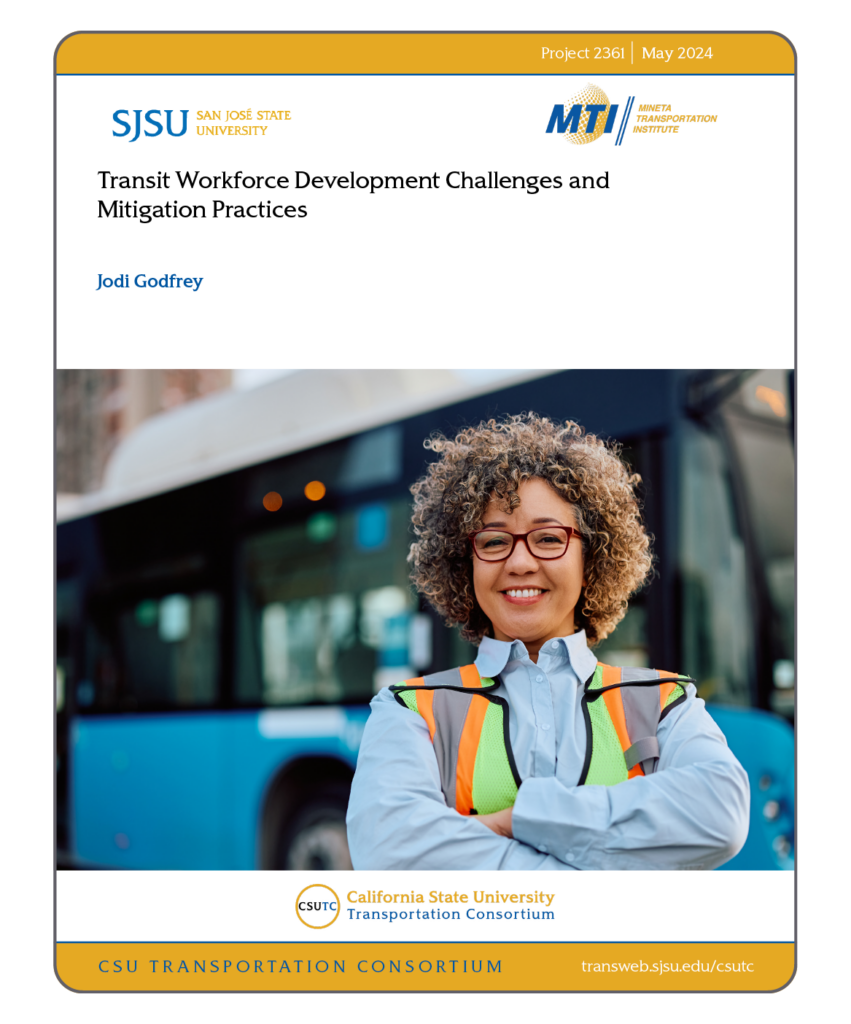
Transit Workforce Development Challenges and Mitigation Practices
San Jose State University
August 2024
TOPICS: Hiring and Recruitment , Retention , Workforce Shortage
The goal of this research is to provide transit industry executives and transportation professionals with awareness of the many tools that are available to help attract more qualified candidates to the transit industry, as well as ways to advance the development
of the transit workforce. This research highlights social media recruiting; online hiring platform improvements; and partnerships with career centers, universities, and recruitment centers to attract new employees to the transit workforce. In addition, increases in pay, benefits, bonuses, providing flexible schedule options, and some other atypical ideas have successfully been used to retain workers in the transit workforce. This research focuses on ways in which all transit stakeholders can invest in all aspects of industry workforce development to ensure qualified employees choose the transit industry and that they are subsequently trained to be the most beneficial assets to the organization and remain there via effective retention strategies.
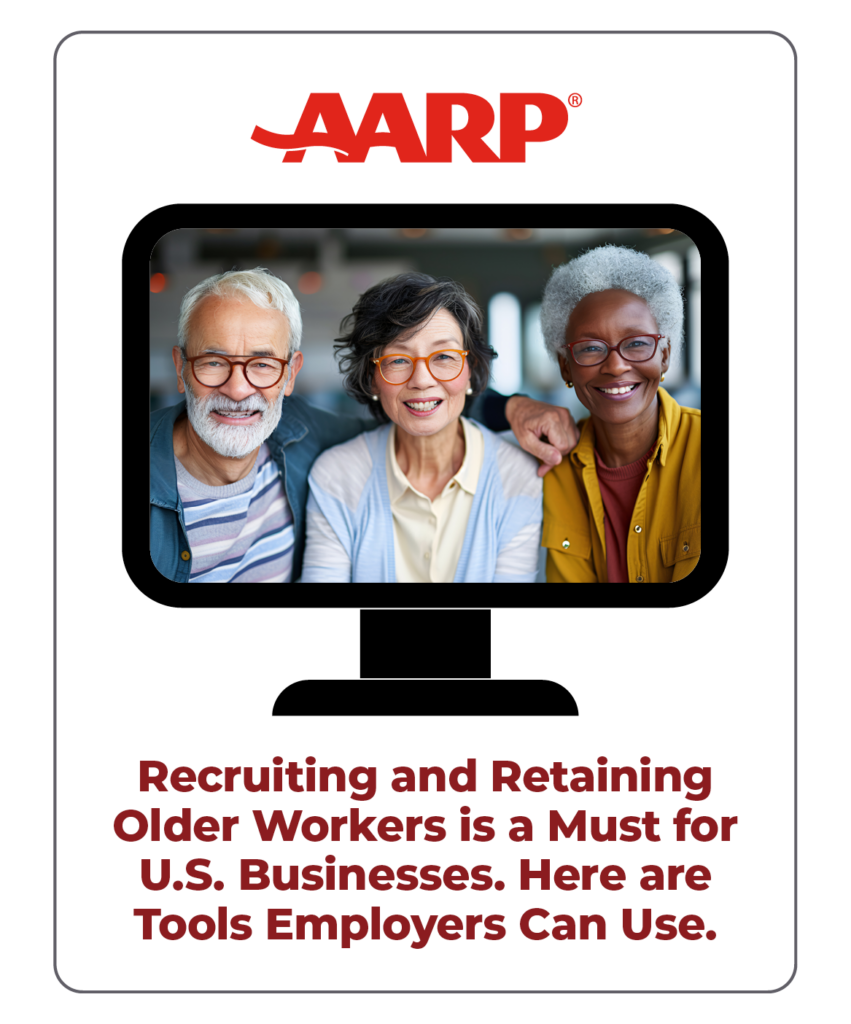
Recruiting and Retaining Older Workers is a Must for U.S. Businesses. Here are Tools Employers Can Use.
AARP
July 2024
Shifting demographics in the U.S. workforce indicate that businesses are probably going to need to recruit, train, and retain older workers to ensure their companies remain competitive. However, workplace surveys indicate that most firms are currently not prepared to find and welcome workers who are 50 years of age or older.
Fortunately, a broad array of evidence-based hiring and talent development strategies are at the ready for U.S. employers. These strategies draw from a recent and comprehensive review of employer practices and their influence on economic security and mobility for U.S. workers.
Three key connected takeaways for employers to consider as they plan for ways to leverage this segment of the workforce are as follows:
• Engage directly with older employees in developing their digital skills.
• Seek out the social networks in which older workers operate to find the best recruiting matches.
• Lean into current or former employees and their online connections to identify these social networks.
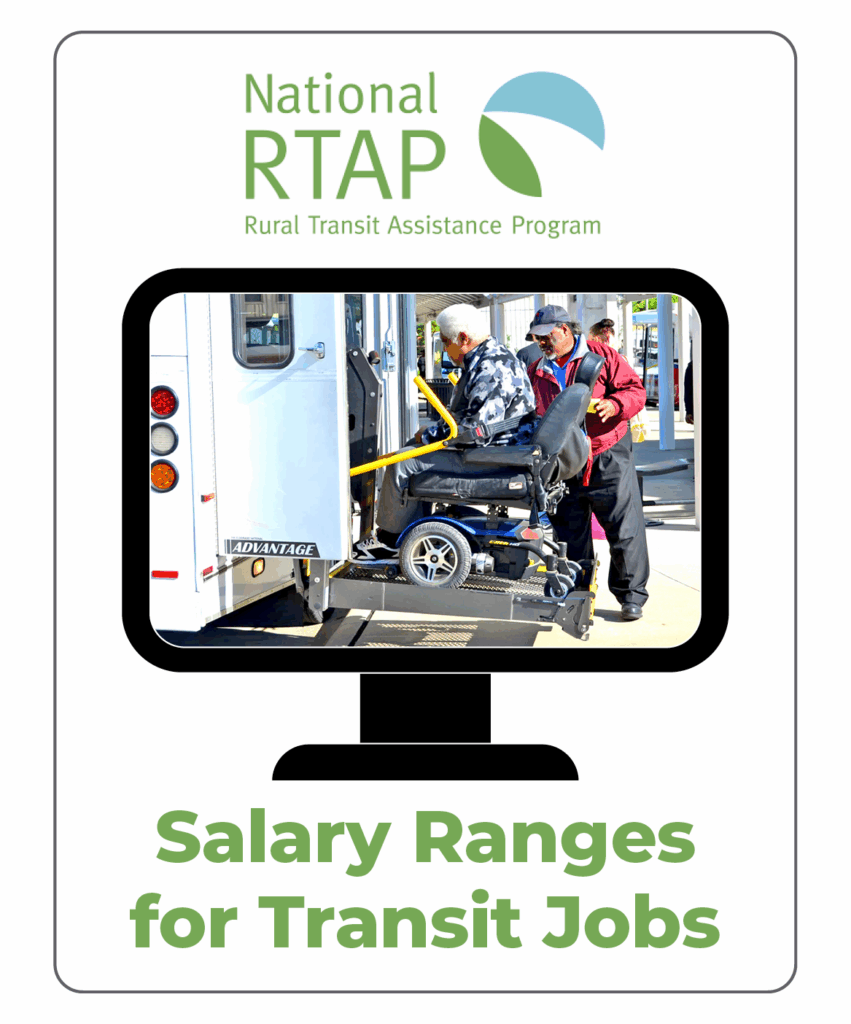
Salary Ranges for Transit Jobs
In June and July of 2024, National RTAP completed a survey of rural and tribal public transit agencies; the survey included a section on annual salaries and hourly pay rate ranges, annual salary increases, and benefits offered to full-time and part-time employees. National RTAP received responses from 391 agencies, representing 43 states, with 327 agencies providing information about jobs and annual salary and hourly ranges. The dataset is not exhaustive but can help rural and tribal transit providers in determining salary ranges for various positions.
The survey data is aggregated in a downloadable spreadsheet, which is available on the National RTAP landing page at the link below.
National Rural Transit Assistance Program
July 2024
TOPICS: Hiring and Recruitment , Policy and Planning , Retention

Steering Success: AC Transit’s Holistic Strategy for Bus Operator Shortage
A 2022 American Public Transportation Association survey of 117 transit agencies of all sizes, 71% reported that they have either had to cut service or delay service increases because of worker shortfalls. While the transportation industry as a whole grapples with recruitment and retention techniques, some transit agencies have already found measurable success. This perspective examines the causes for the bus operator shortage—including as an example of the wider industry issues—as well as potential solutions, including a comprehensive approach by Oakland-based agency AC Transit, which improved retention of new bus operators by 20 percent.
Mineta Transportation Institute
July 2024
TOPICS: Hiring and Recruitment , Retention , Workforce Shortage
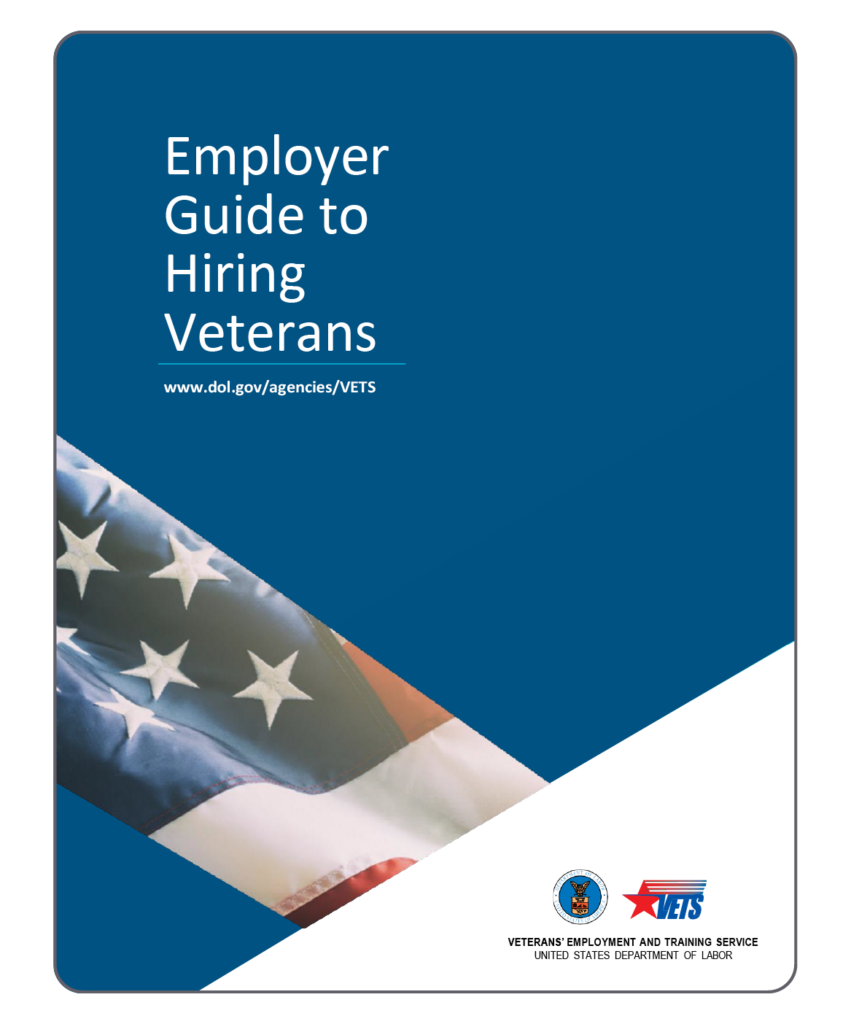
Employer Guide to Hiring Veterans
Employers recognize the value veterans bring to the workplace but often find it challenging to connect with separating service members and veterans seeking employment. Veterans are in high demand, so it requires dedicated efforts by employers to find and hire veterans.
This guide intends to:
• Provide accurate information about service member and veteran demographics.
• Share federal, state, and other resources with employers to facilitate veteran employment; and
• Make recommendations on how to attract, train, and retain veterans.
United States Department of Labor
TOPICS: Community Engagement , Hiring and Recruitment , Retention
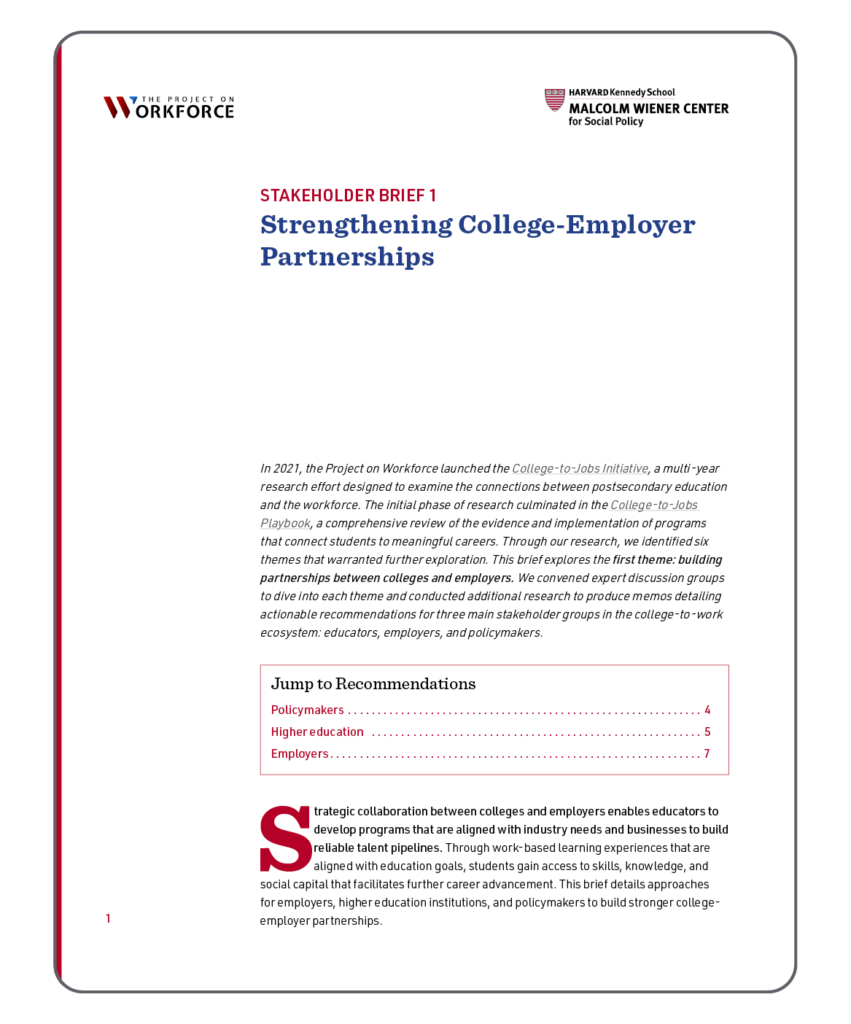
College-to-Jobs Initiative: Policy and Practice Series
The Project on Workforce
The Project on Workforce released new recommendations for educators, employers, and policymakers on how to improve college-to-jobs connections. With these webinars and stakeholder briefs, they aim to increase attention and investment in college-to-career transitions and show how colleges can better deliver on economic prosperity.
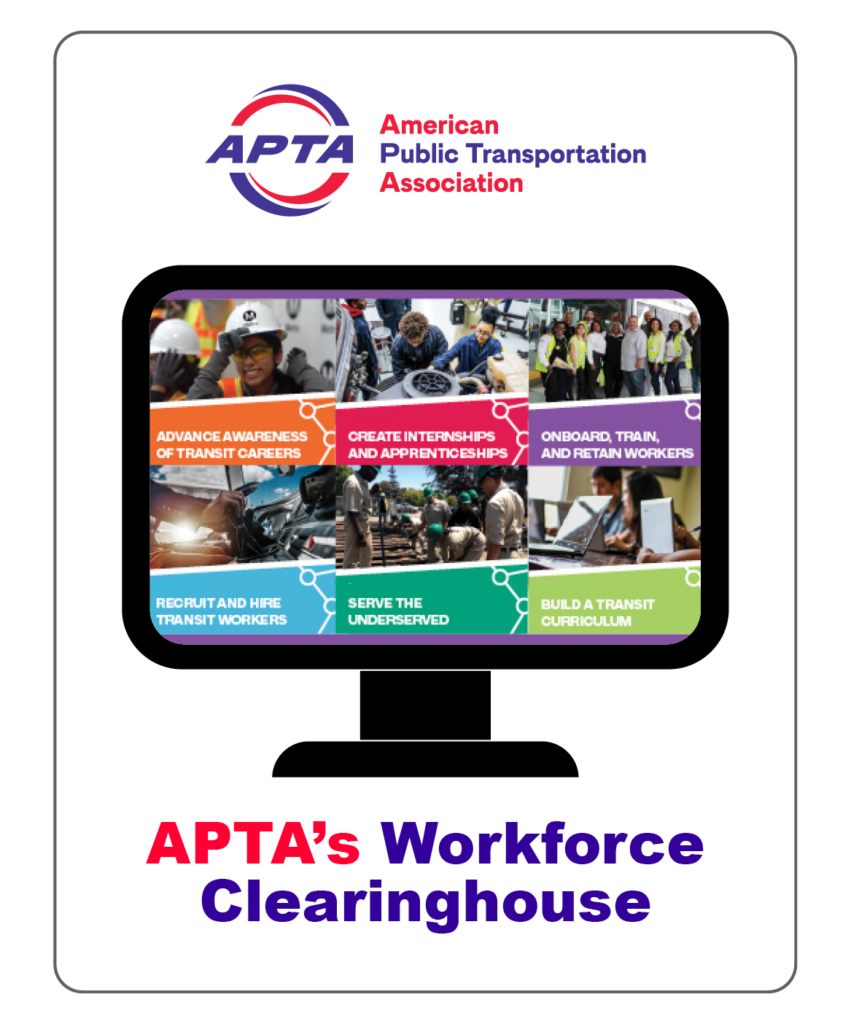
APTA’s Workforce Clearinghouse
APTA’s Workforce Clearinghouse connects users with convenient access to industry materials, stories, and recommended practices. Use the search bar or choose a categorical grouping to find resources from APTA’s six ‘Workforce Mini Guides’ as well as selected examples from the initial workforce volume – APTA’s Transit Workforce Readiness Guide.
American Public Transportation Association (APTA)
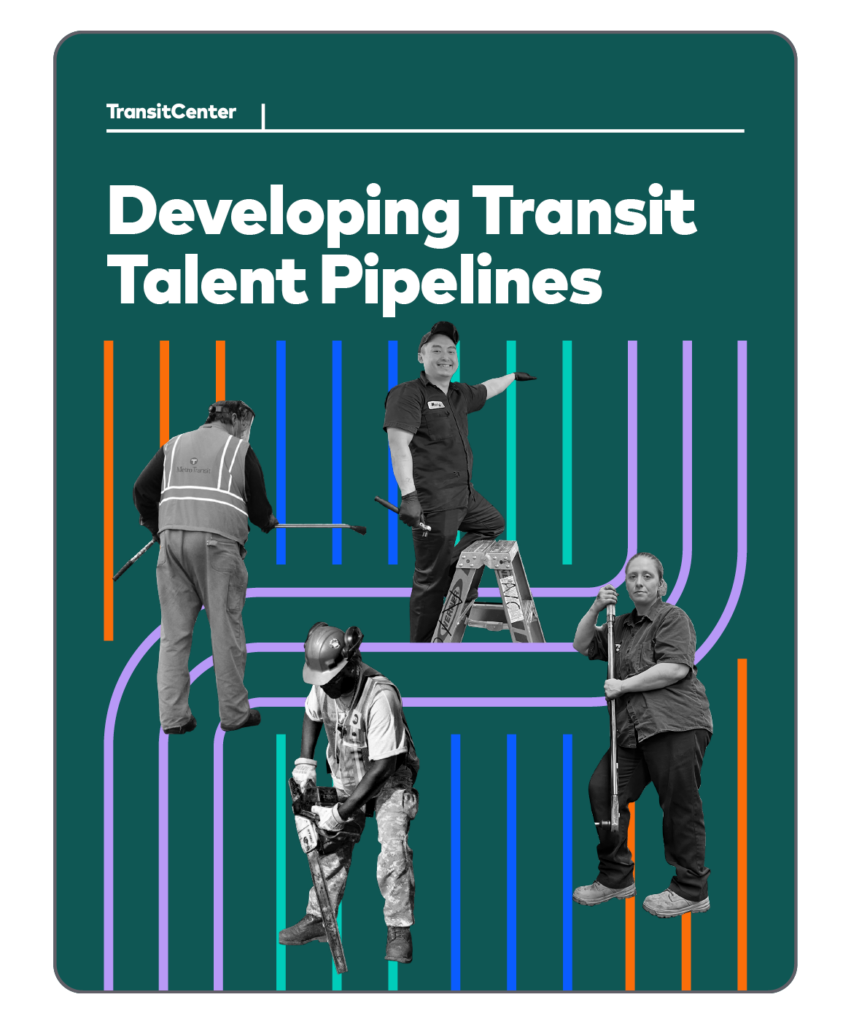
Developing Transit Talent Pipelines
TransitCenter’s report explores the workforce challenges of transit bus mechanics and maintenance workers, which are essential for transitioning to low-no buses and restoring pre-pandemic service. Agencies are struggling to maintain a steady pipeline for these positions due to retirements, attrition, and a changing labor market. The report determines that agencies should engage more actively with potential workers and encourage them to join the transit workforce, as well as finding new ways to prepare new workers and retrain current workers to meet current and future needs, particularly as technology for low-no buses continues to change and grow more widespread. The report recommends greater investment from transit agencies, state and federal government, and philanthropy to support transit jobs.
TransitCenter
May 2024
TOPICS: Hiring and Recruitment , Low-No , Policy and Planning , Retention , Workforce Shortage
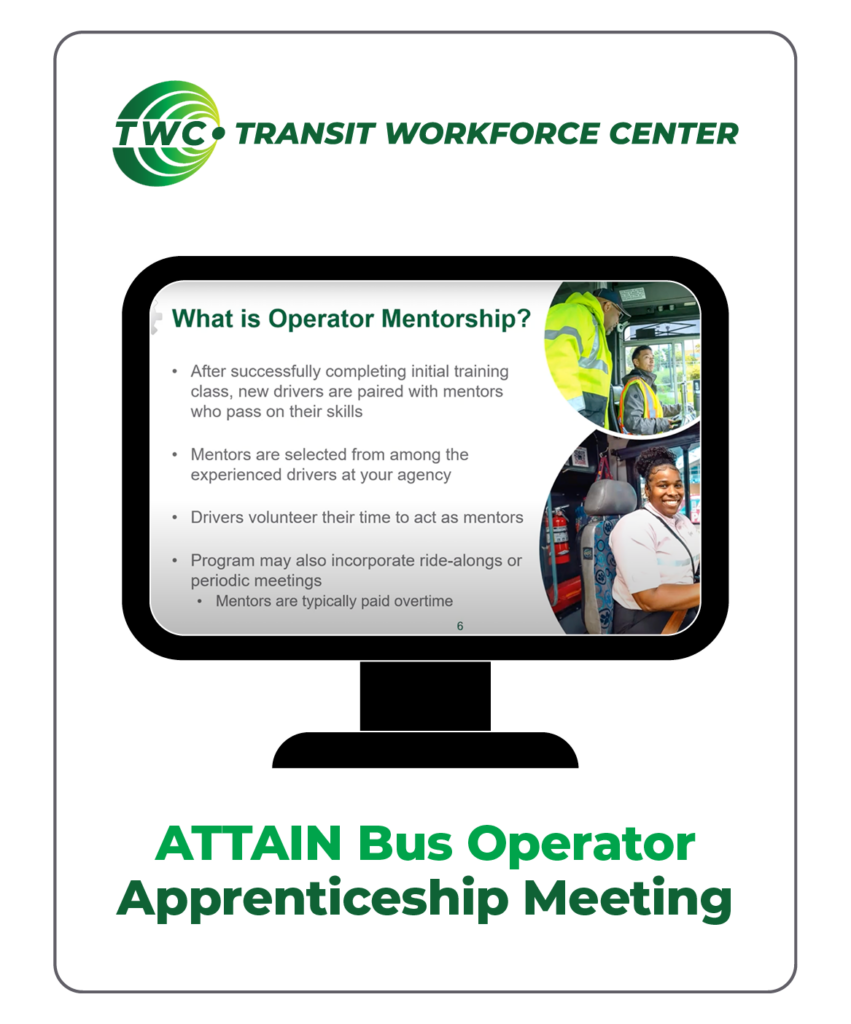
ATTAIN Bus Operator Apprenticeship Meeting
TWC’s American Transit Training and Apprenticeship Innovators Network (ATTAIN) met on May 17, 2024 to discuss bus operator apprenticeship. Check out the recording for short presentations from transit peers across the country and an engaging and interactive discussion about the development of bus operator mentorship and apprenticeship programs, how they work, and the benefits they offer.
Transit Workforce Center
May 2024
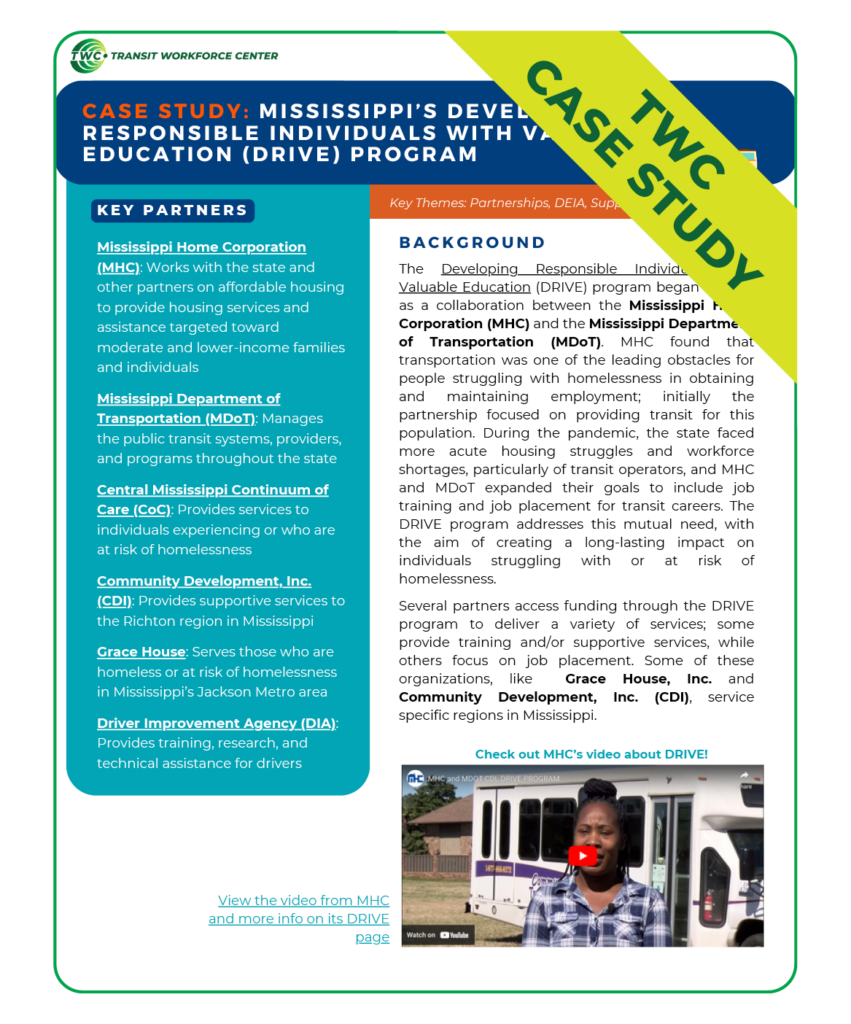
Mississippi’s Developing Responsible Individuals with Valuable Education (DRIVE) Program
This TWC case study is about the Mississippi Developing Responsible Individuals with Valuable Education (DRIVE) Program, which uses Emergency Solutions Grants (ESG) from the U.S. Department of Housing and Urban Development, distributed by the Mississippi Home Corporation (MHC), to partners such as Grace House, Inc. and Community Development, Inc. (CDI). These partners use the funding in a variety of creative ways to provide housing and other supportive services to DRIVE participants while they complete training and certification for a commercial driver’s license (CDL). Partners also provide job assistance to participants, placing them and helping them succeed in local transit jobs. Learn more about the program, services offered, and how stakeholders leverage funding in the full case study.
Transit Workforce Center
May 2024
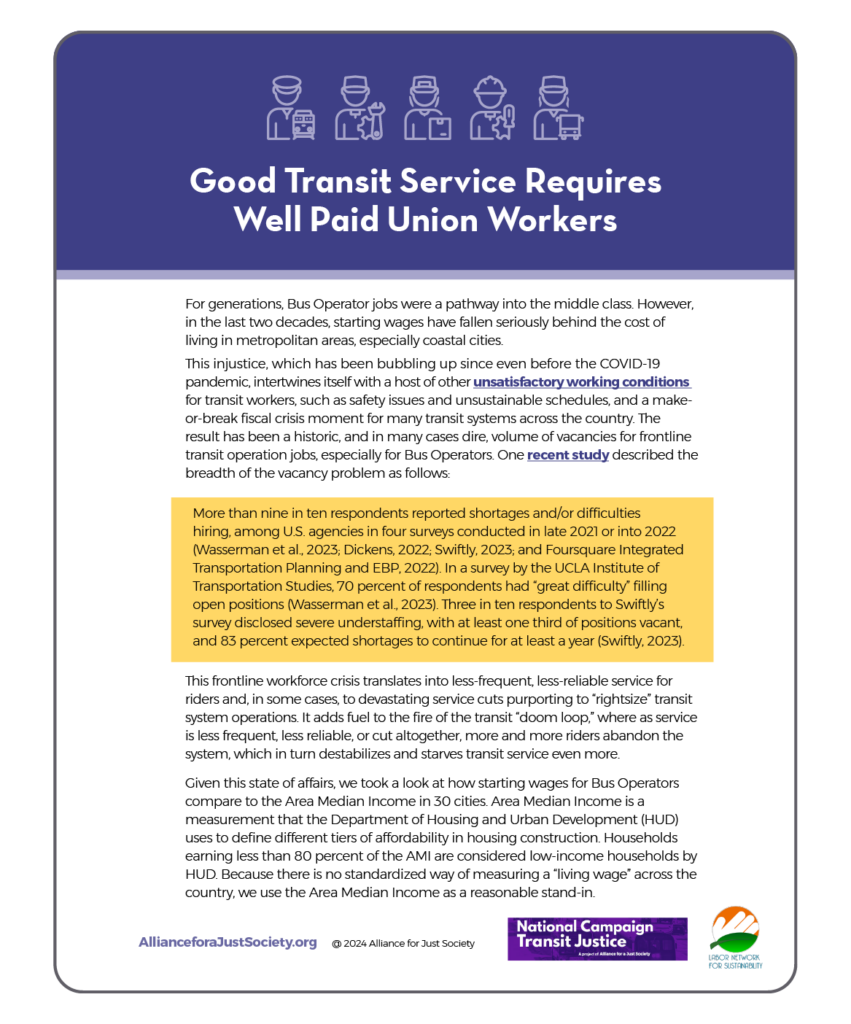
Good Transit Requires Well Paid Union Workers
This report presents bus operator wages as compared with Area Median Income in 30 cities across the U.S., pointing out that in the last two decades, starting wages for our nation’s bus operators have fallen seriously behind the cost of living. In the face of a workforce shortage, the report makes the case for decision makers to ensure higher wages for frontline transit workers.
The National Campaign for Transit Justice
March 2024
TOPICS: Hiring and Recruitment , Policy and Planning , Retention , Workforce Shortage
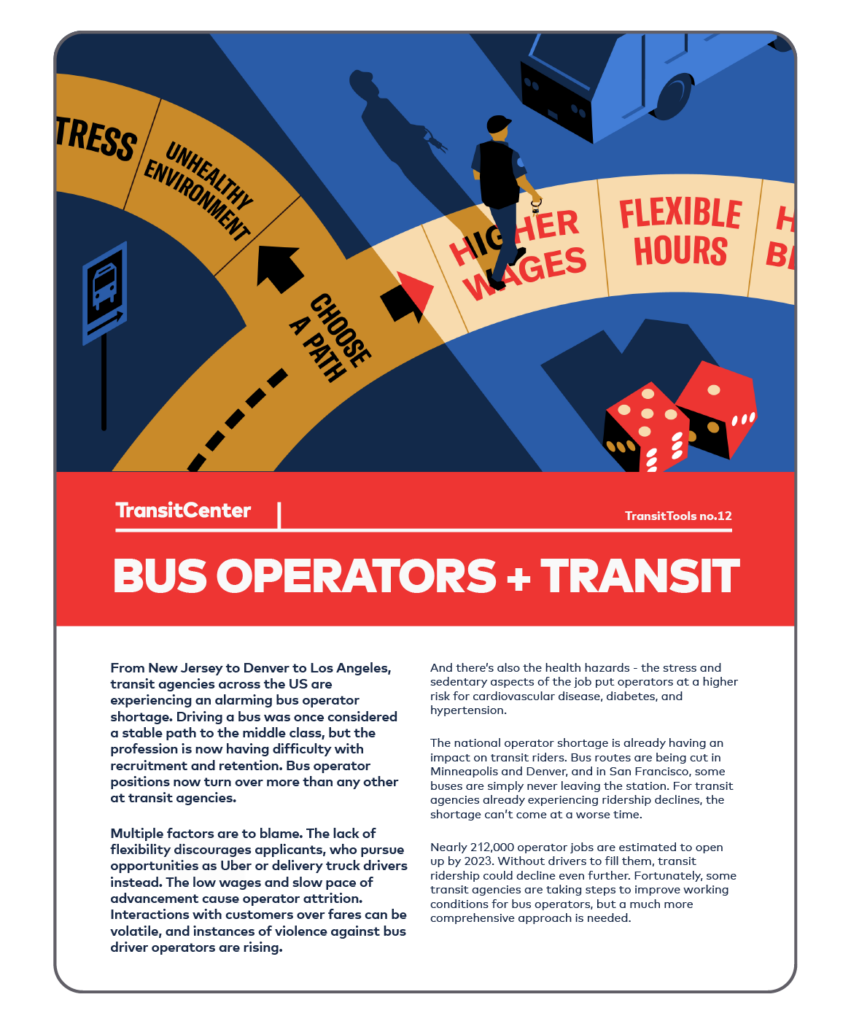
3 Ways to Make Bus Driving a Better Job
This report highlights ways that bus driving can be improved for workers to help increase retention and recruitment. The report explains three specific ways: redesigning the job for health and success, raising pay and creating opportunities for advancement, and making a more flexible schedule.
The National Campaign for Transit Justice
March 2024
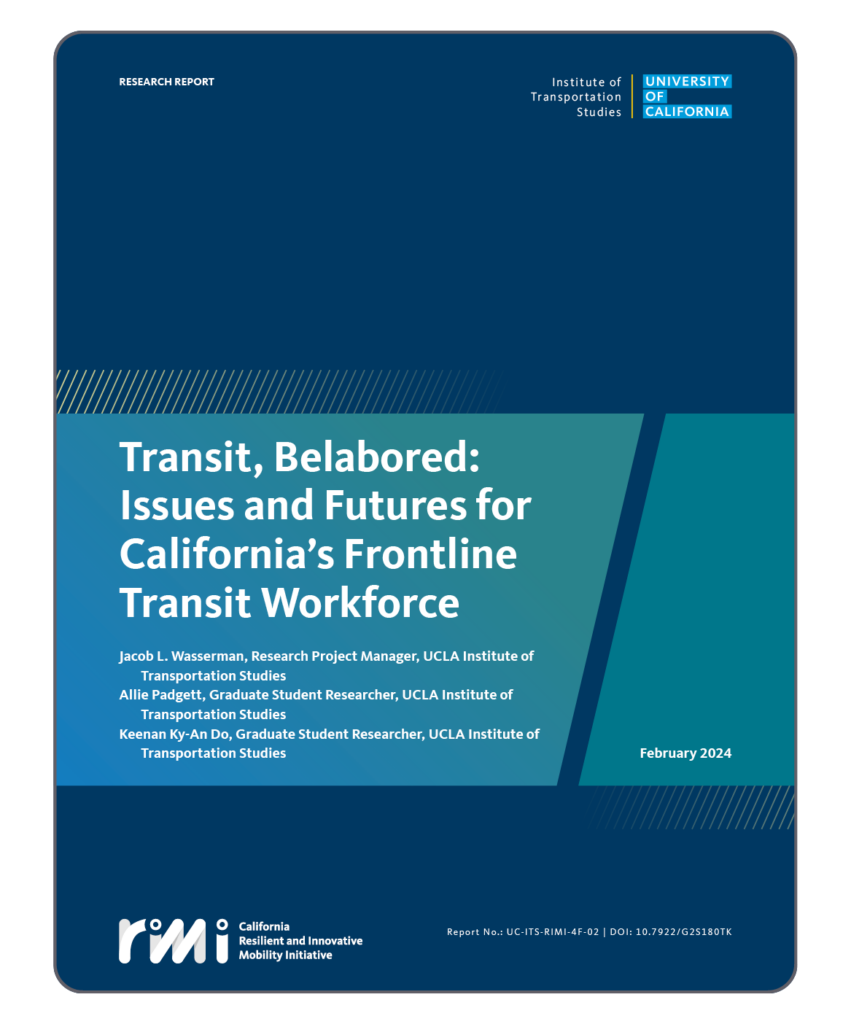
Transit, Belabored: Issues and Futures for California’s Frontline Transit Workforce
This report focuses on frontline transit workforce issues, including employee pay, issues before and after the COVID-19 pandemic, and the workforce shortage. The report is mainly about transit operators, but also touches on mechanics. It draws on quantitative and qualitative data, including wage data by agency and sector, contracts and agency documents, and interviews with union leaders, agency managers, and operators themselves.
Institute of Transportation Studies
February 2024
TOPICS: Hiring and Recruitment , Policy and Planning , Retention , Workforce Shortage
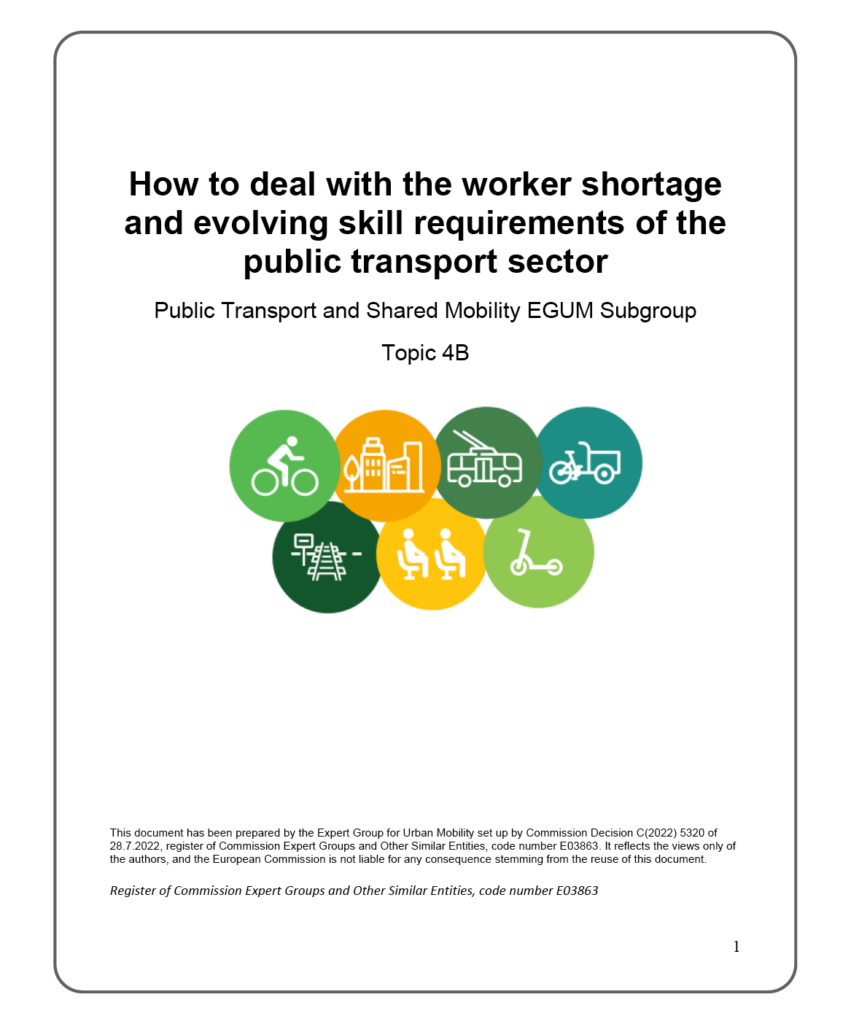
How to Deal with the Worker Shortage and Evolving Skill Requirements of the Public Transport Sector
This report provides a European counterpart to those produced within the United States on the transit workforce shortage. It gives an overview of the workforce shortage’s causes, as well as recommendations for addressing evolving skill requirements and more.
Expert Group on Urban Mobility, European Commission
February 2024
TOPICS: Community Engagement , Hiring and Recruitment , Training , Workforce Shortage
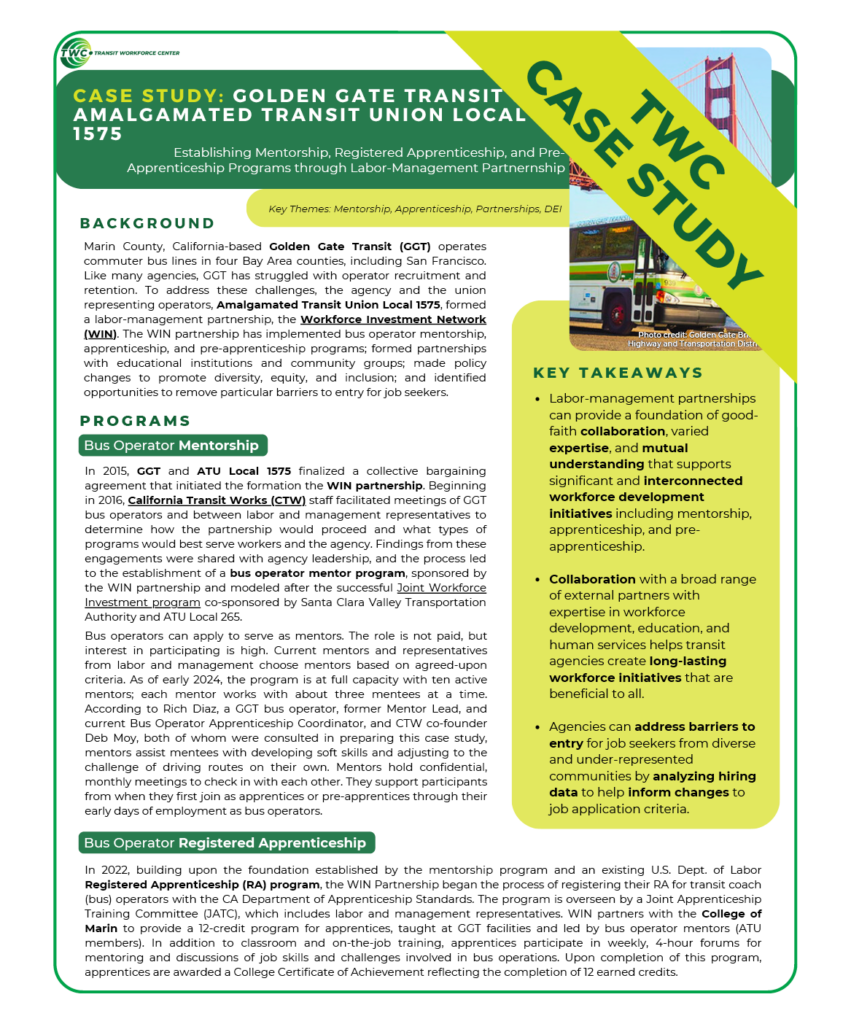
Case Study: Golden Gate Transit & Amalgamated Transit Union Local 1575
Marin County, California-based Golden Gate Transit (GGT) operates commuter bus lines in four Bay Area counties, including San Francisco. Like many agencies, GGT has struggled with operator recruitment and retention. To address these challenges, the agency and the union representing operators, Amalgamated Transit Union Local 1575, formed a labor-management partnership, the Workforce Investment Network (WIN). The WIN partnership has implemented bus operator mentorship, apprenticeship, and pre-apprenticeship programs; formed partnerships with educational institutions and community groups; and identified opportunities to remove particular barriers to entry for job seekers.
Transit Workforce Center
February 2024
Read Rich Diaz’s Transit Career Story on the TWC Blog to learn more.
View the full case study below:
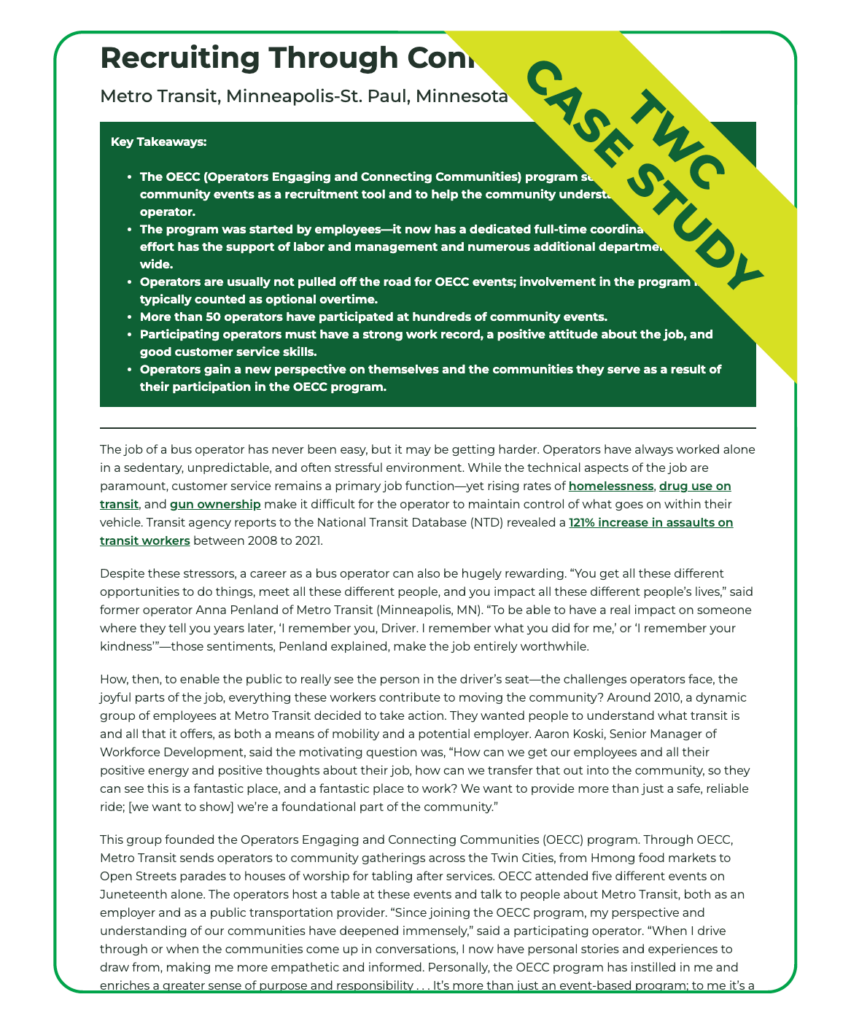
Recruiting Through Connection
This case study describes the OECC (Operators Engaging and Connecting Communities) program in Metro Transit, MN, which sends operators out to community events as a recruitment tool and to help the community understand the role of the operator.
Transit Workforce Center
November 2023
TOPICS: Hiring and Recruitment , Policy and Planning
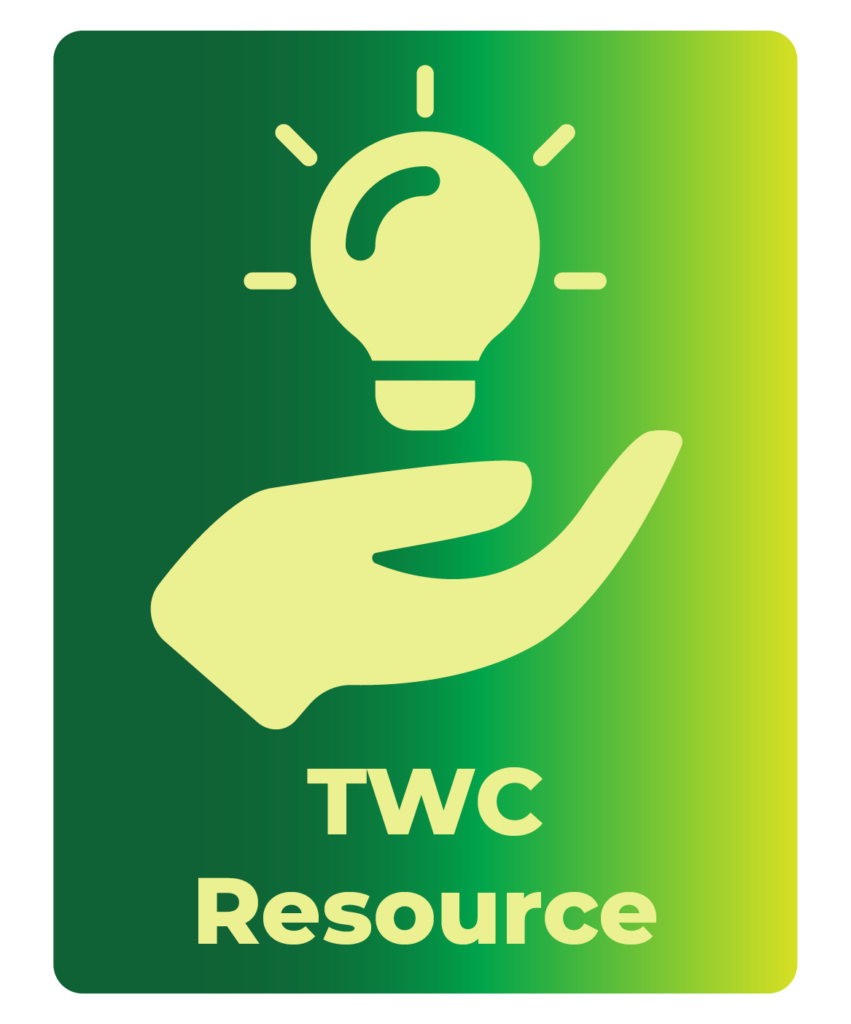
Critical Conversations: The Public Transport Frontline Worker Crisis
Public transportation agencies across the country are facing challenges in attracting, recruiting, and retaining frontline employees. Critical Conversations provides insights from youth on transit’s frontline workforce crisis – bus and train operators, and entry-level mechanics. Researchers conducted a national survey targeting respondents under the age of 30, compiled agency-specific human resources information, and held focus groups asking participants to share their experiences and insights about challenges, lessons learned, and opportunities regarding the workforce crisis.
introducing youth to American infrastructure
November 2023
Contributors: Dr. Jamaal Schoby, Dr. Beverly Scott
The Barr Foundation provided support for the research element of this important youth empowerment and “people-readiness” initiative.
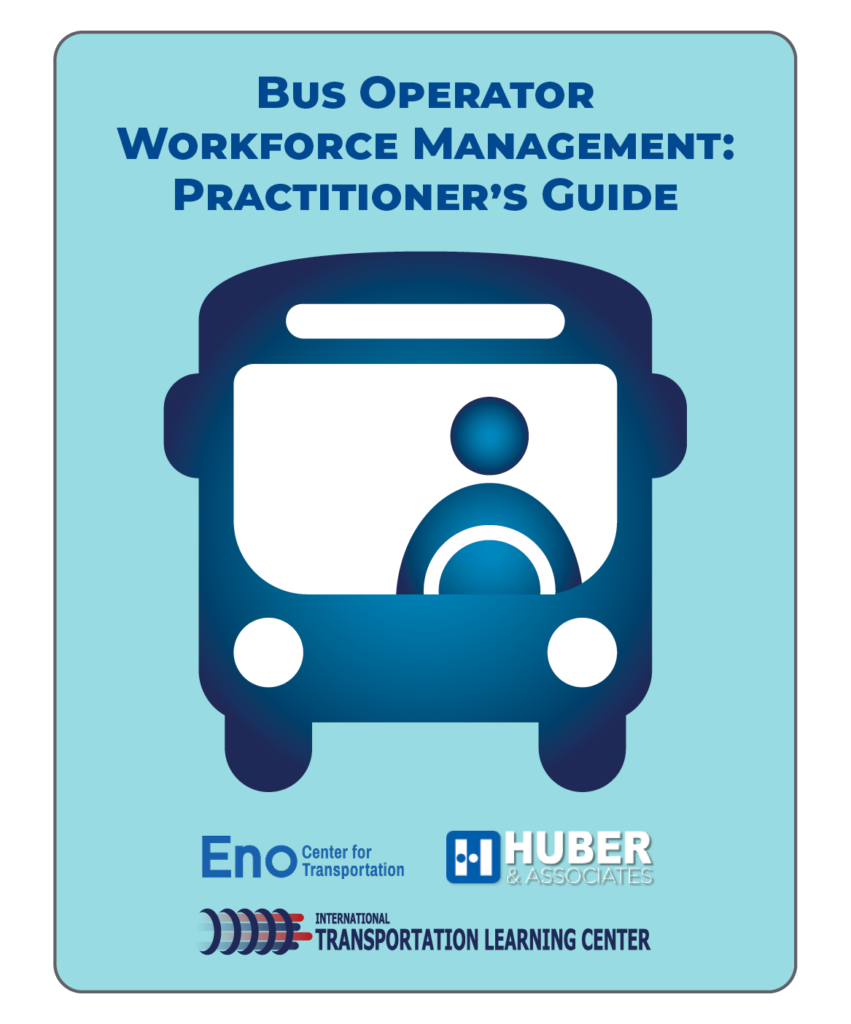
Bus Operator Workforce Management: Practitioner’s Guide
This report, produced by the Eno Center for Transportation, International Transportation Learning Center (ITLC), and Huber & Associates, is a practitioner’s guide that provides recommendations and resources enabling transit agencies to better assess, plan, and implement their operator workforce management programs. A link to a related TRB webinar is also included.
Transit Cooperative Research Program
August 2023
Contributor(s): National Academies of Sciences, Engineering, and Medicine; Transportation Research Board; Transit Cooperative Research Program; Robert Puentes; Philip Plotch; Brianne Eby; Paul Lewis; Karitsa Holdzkom; Xinge Wang; Douglas Nevins; Kenyon Corbett; Melissa Huber
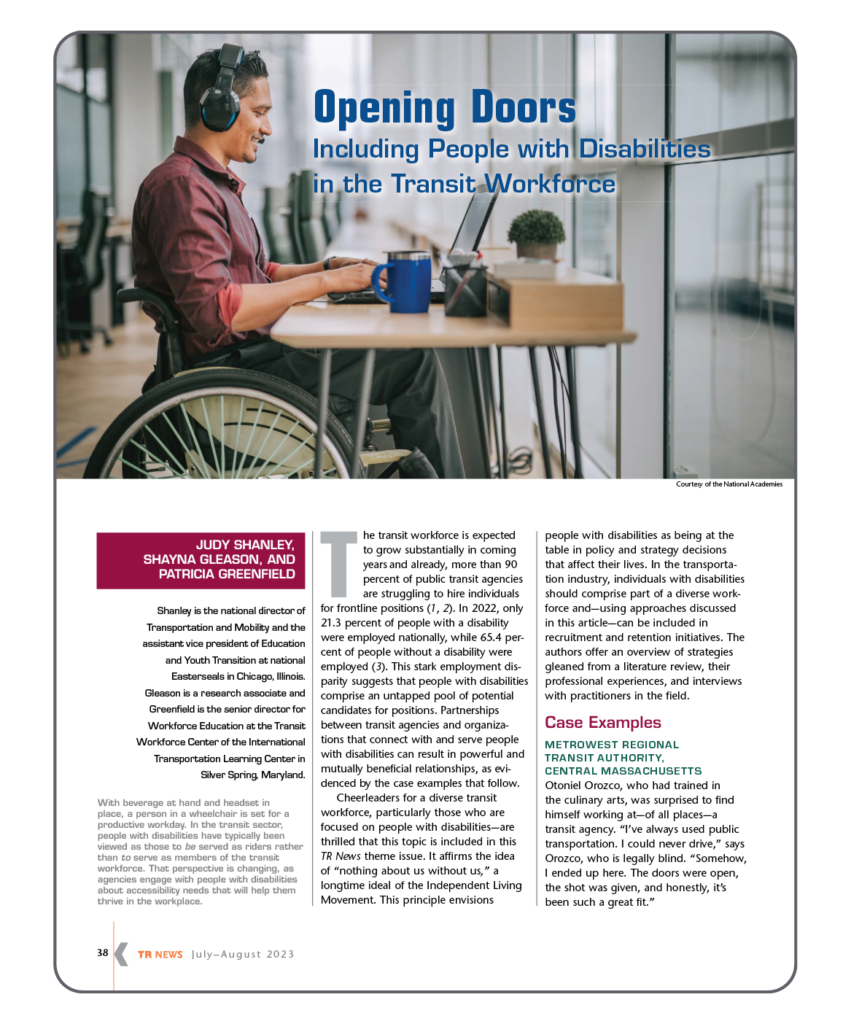
Opening Doors: Including People with Disabilities in the Transit Workforce
TR News
August 2023
In the transportation industry, individuals with disabilities should be included in recruitment and retention initiatives. “Opening Doors: Including People with Disabilities in the Transit Workforce” offers an overview of strategies and is one of the feature articles in the July-August 2023 edition (Issue 346) of TR News, TRB’s magazine.
Authors: Judy Shanley (National Center for Mobility Management), Shayna Gleason (International Transportation Learning Center), and Patricia Greenfield (International Transportation Learning Center)
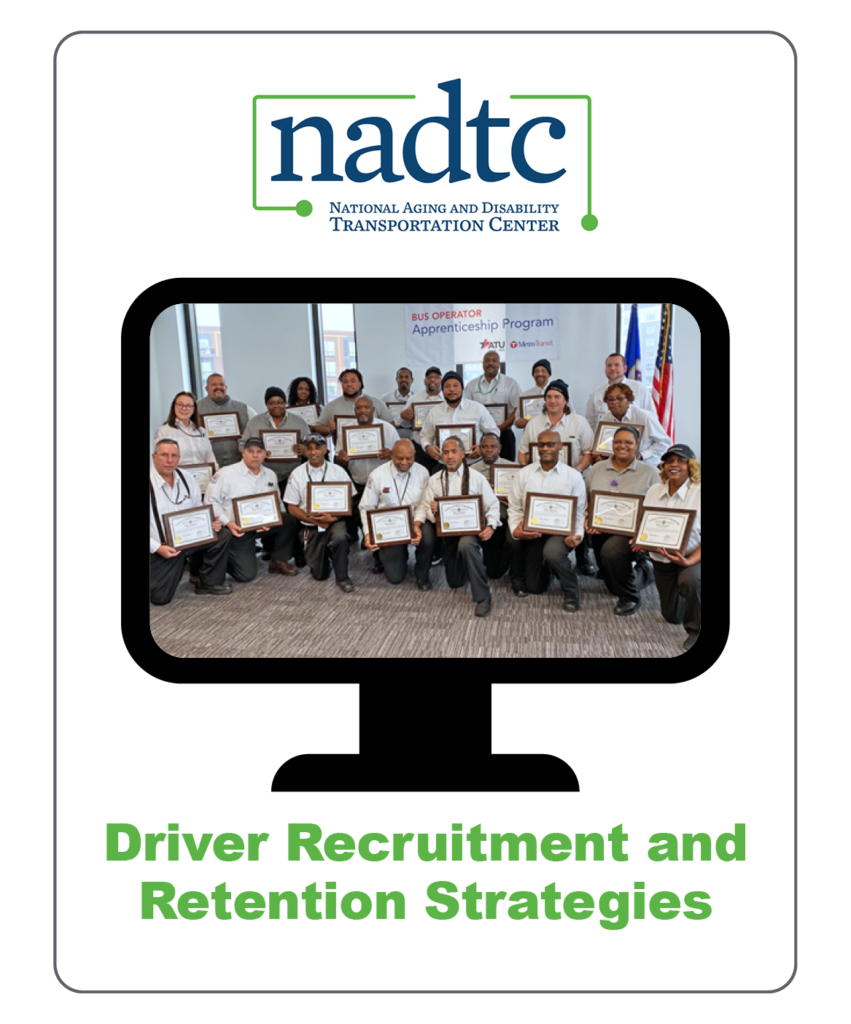
Driver Recruitment and Retention Strategies
This blog post from the National Aging and Disability Transportation Center discusses recruitment and retention strategies for transit agencies, particularly in regard to older and disabled workers in the face of industry-wide labor shortages. It includes examples of successful partnerships and effective mentoring programs.
National Aging and Disability Transportation Center
July 2023
TOPICS: Community Engagement , Hiring and Recruitment , Mentorship , Retention , Workforce Shortage
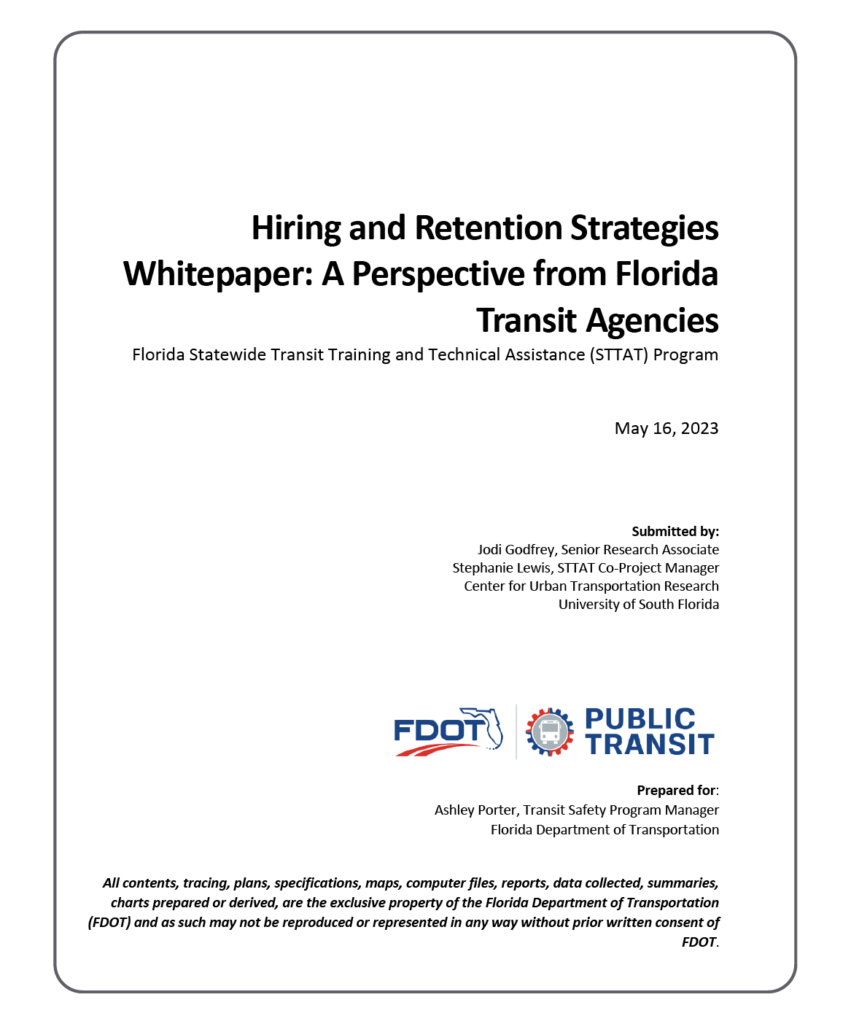
Hiring and Retention Strategies Whitepaper: A Perspective from Florida Transit Agencies
This study examines what transit agencies are doing to address hiring and retention challenges, what strategies are working, and what problems still need to be solved. The report includes six case study sites from Florida transit agencies and one non-Florida transit agency, that were selected due to a variety of characteristics, including partnerships and implemented service changes.
Center for Urban Transportation Research
June 2023
TOPICS: Hiring and Recruitment , Policy and Planning , Retention
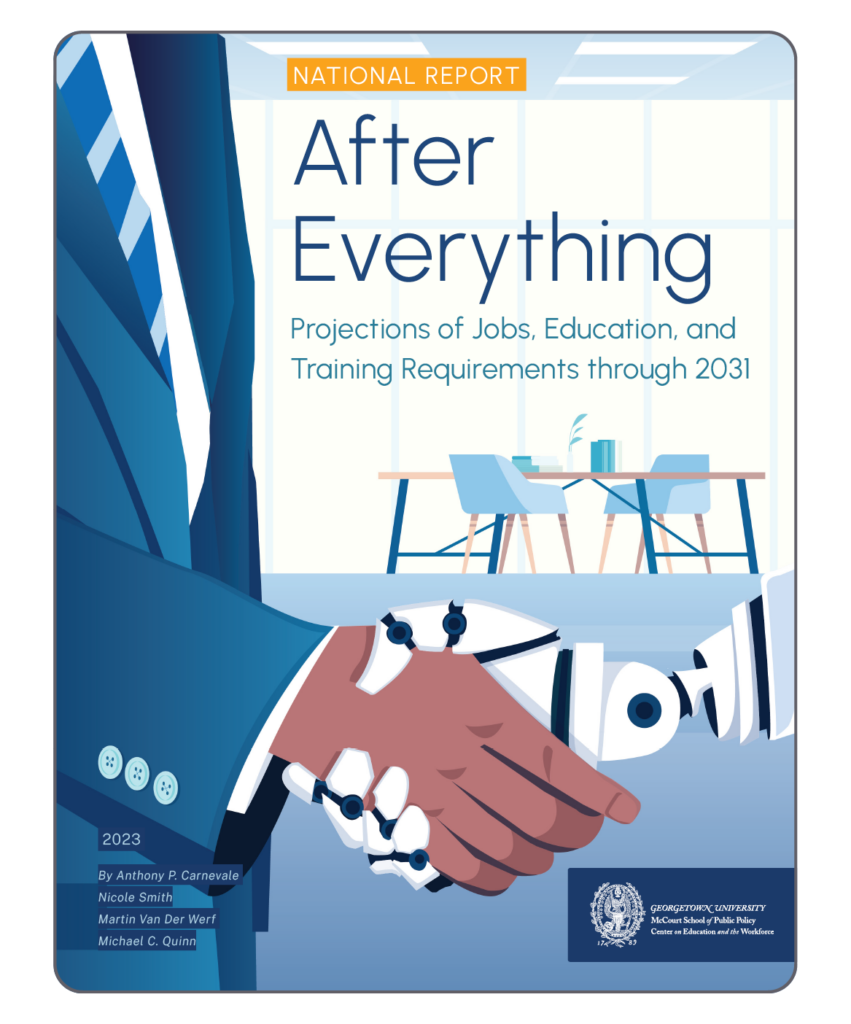
After Everything: Projections of Jobs, Education, and Training Requirements through 2031
By 2031, 72 percent of jobs in the US will require postsecondary education and/or training. Between 2021 and 2031, there will be 18.5 million job openings per year on average, and some 12.5 million of these annualized openings will require at least some college education. After Everything: Projections of Jobs, Education, and Training Requirements through 2031 includes a national overview of job projections and their educational requirements across industries, occupational clusters, and detailed occupational groups. These latest projections demonstrate the central role postsecondary education plays in preparing the workforce of the future.
Georgetown University Center on Education and the Workforce
June 2023
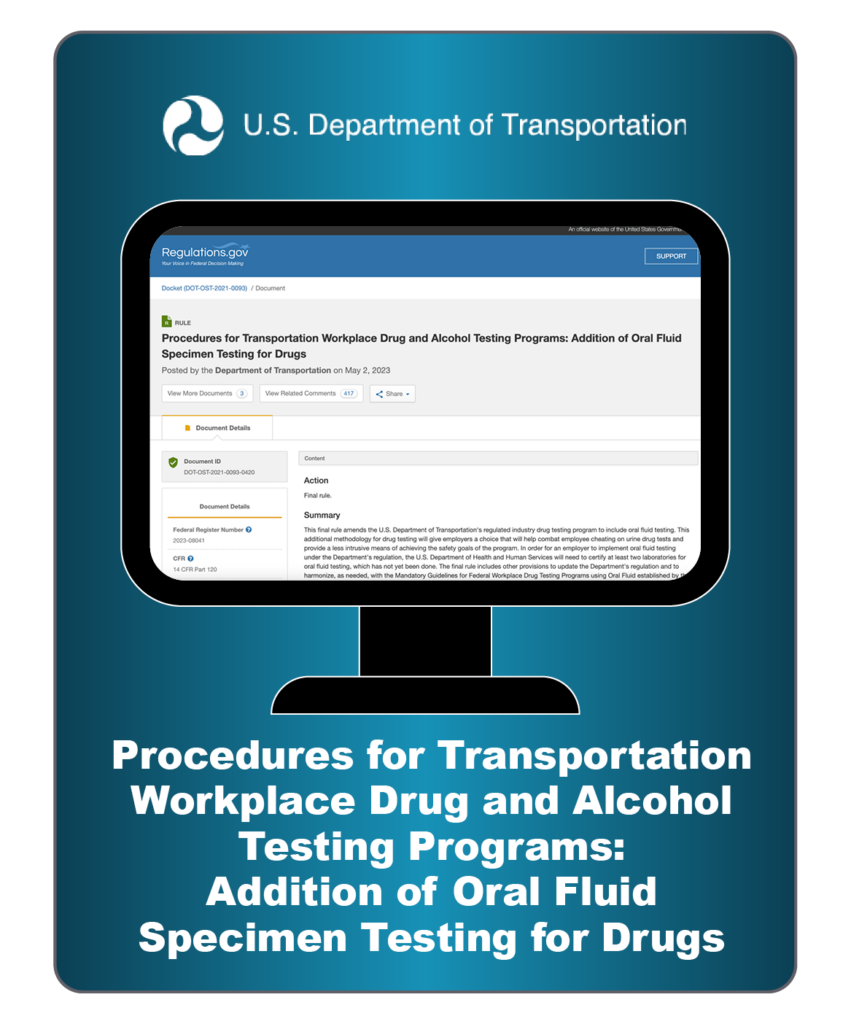
Procedures for Transportation Workplace Drug and Alcohol Testing Programs: Addition of Oral Fluid Specimen Testing for Drugs
This rule amends the U.S. Department of Transportation’s regulated industry drug testing program to include oral fluid testing. This additional methodology for drug testing will give employers a choice that will help combat employee cheating on urine drug tests and provide a less intrusive means of achieving the safety goals of the program.
Department of Transportation
May 2023
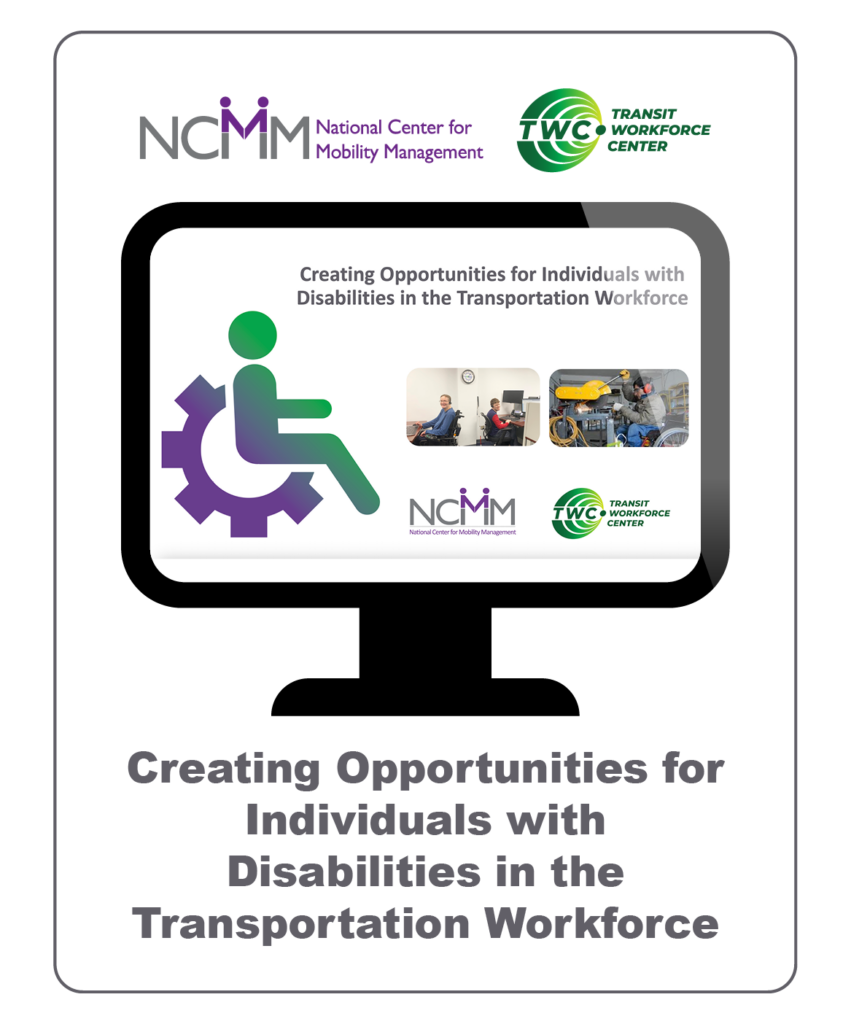
Creating Opportunities for Individuals with Disabilities in the Transportation Workforce
When transportation professionals are equipped with knowledge and skills about disability topics, they can help create welcoming and engaging employment settings for individuals with disabilities. This new NCMM/TWC learning module offers hiring professionals strategies to recruit and retain individuals with disabilities in the transportation workforce.
National Center for Mobility Management; Transit Workforce Center
May 2023
TOPICS: Community Engagement , Hiring and Recruitment , Retention
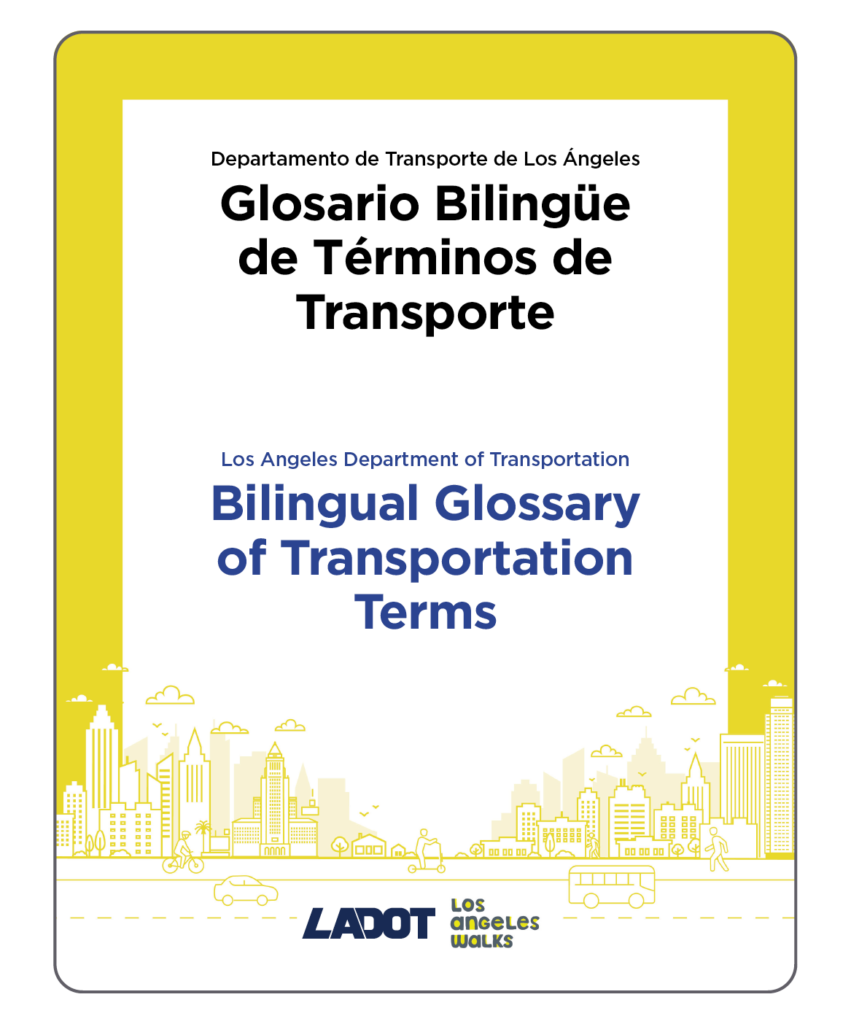
LADOT Bilingual Glossary of Transportation Terms
Los Angeles Department of Transportation
May 2023
TOPICS: Community Engagement , Hiring and Recruitment , Training
In 2020-2022, LADOT collaborated with LA Walks, community members, transportation and planning practitioners, advocates and others to develop LADOT’s first Spanish glossary. The project includes over 100 transportation planning and community engagement terms to improve and standardize LADOT’s Spanish language communication, as well as empower Spanish speaking communities to advocate for transportation improvements.
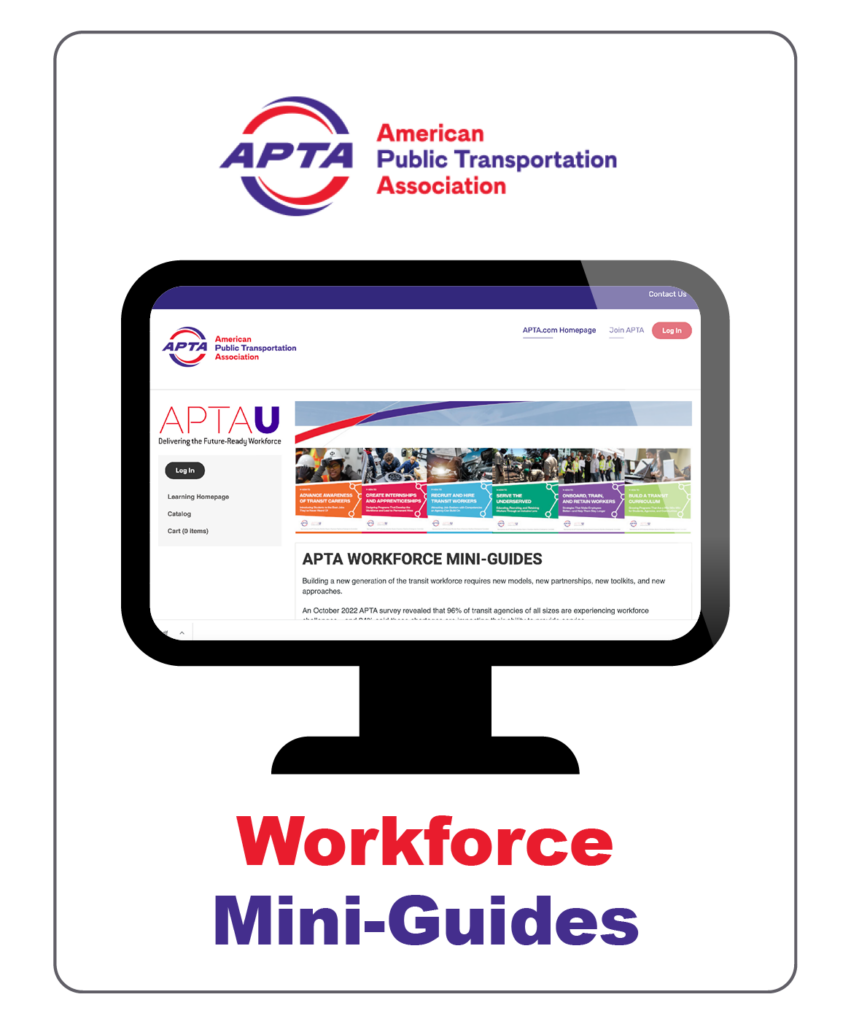
Workforce Mini-Guides
These six workforce development mini-guides are designed to help develop and implement successful strategies to address the critical workforce shortages seen across the public transportation industry. They cover these topics: advancing awareness of transit careers; creating internships and apprenticeships; recruiting and hiring transit workers; serving the underserved in the workforce; onboarding, training, and retaining workers; and building a transit curriculum.
American Public Transportation Association
April 2023
An October 2022 survey conducted by APTA revealed that 96 percent of transit agencies of all sizes are experiencing workforce challenges, and 84 percent said these shortages are impacting their ability to provide service. APTA developed these mini-guides building on their 2021 Transit Workforce Readiness Guide and combining industry insights and stories, case studies, lessons learned, and best practices.
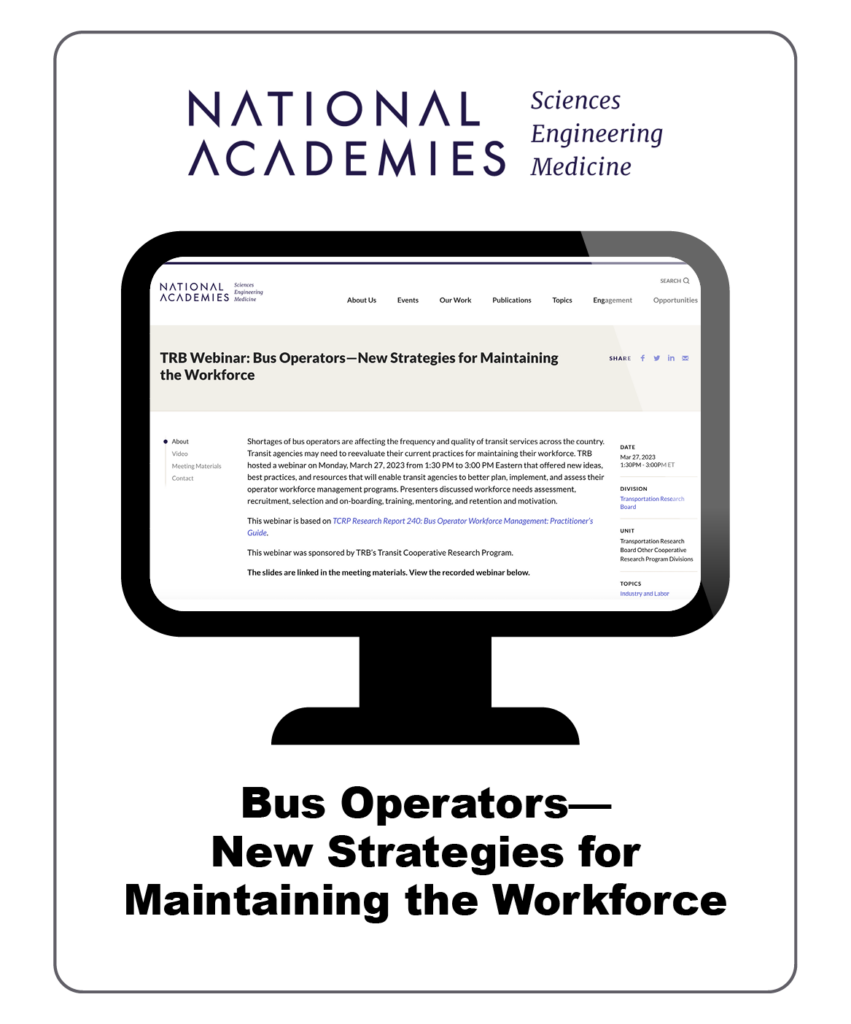
Bus Operators—New Strategies for Maintaining the Workforce
This webinar discusses the ideas, best practices, and resources that will enable transit agencies to better plan, implement, and assess their operator workforce management programs as described in the Bus Operator Workforce Management: Practitioner’s Guide. Presenters discussed workforce needs assessment, recruitment, selection and on-boarding, training, mentoring, and retention and motivation.
Transit Cooperative Research Program
March 2023
TOPICS: Apprenticeship , Hiring and Recruitment , Mentorship , Policy and Planning , Retention , Workforce Shortage
Webinar agenda and presenters
- Bus operator training and retention – Xinge Wang, International Transportation Learning Center
- Lessons from Florida – Trish Collins, Pinellas Suncoast Transit Authority
- Lessons from the Midwest – George F. Fields, Greater Cleveland Regional Transit Authority
- Question and answer session moderated by Robert Puentes, Eno Center for Transportation
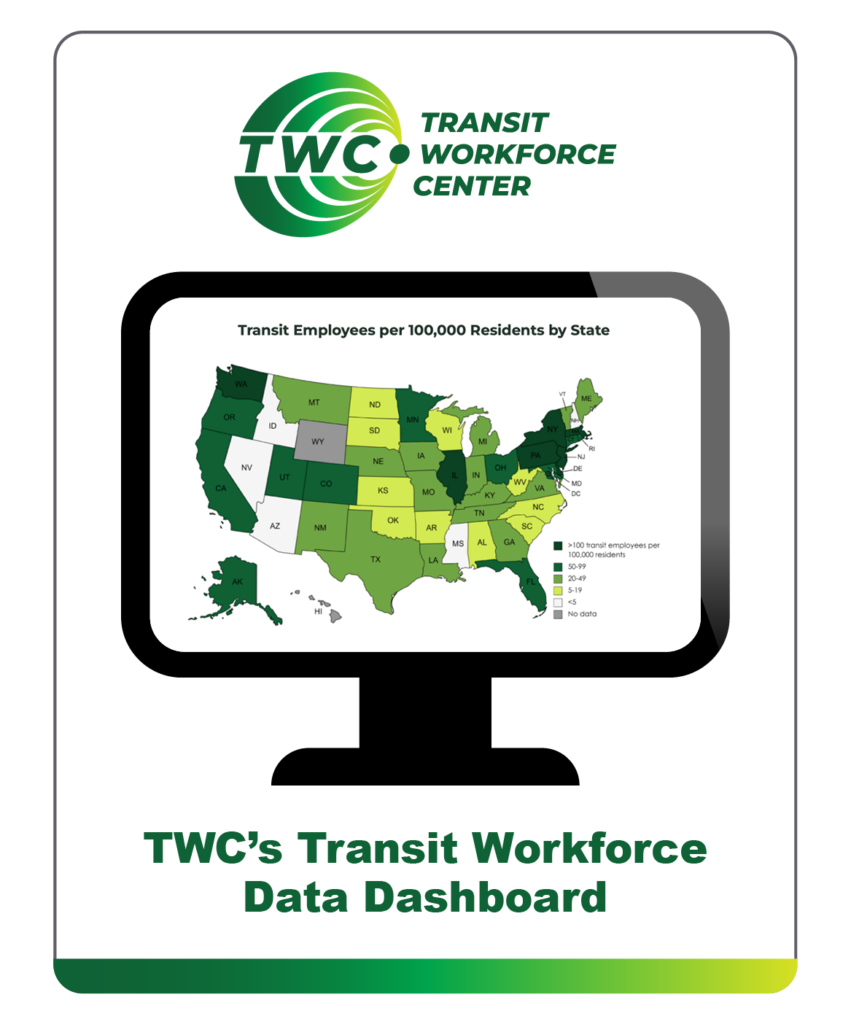
TWC’s Transit Workforce Data Dashboard
Launched in March, 2023, the Transit Workforce Data Dashboard presents quantitative, descriptive data about the composition of the transit workforce and trends in transit employment using a series of charts and graphics. This information is relevant for industry discussions in a range of contexts, including: strategic workforce planning in recruitment, retention, and other areas; examining and addressing opportunities and challenges related to workforce demographics; and identifying training and funding needs.
Transit Workforce Center
March 2023
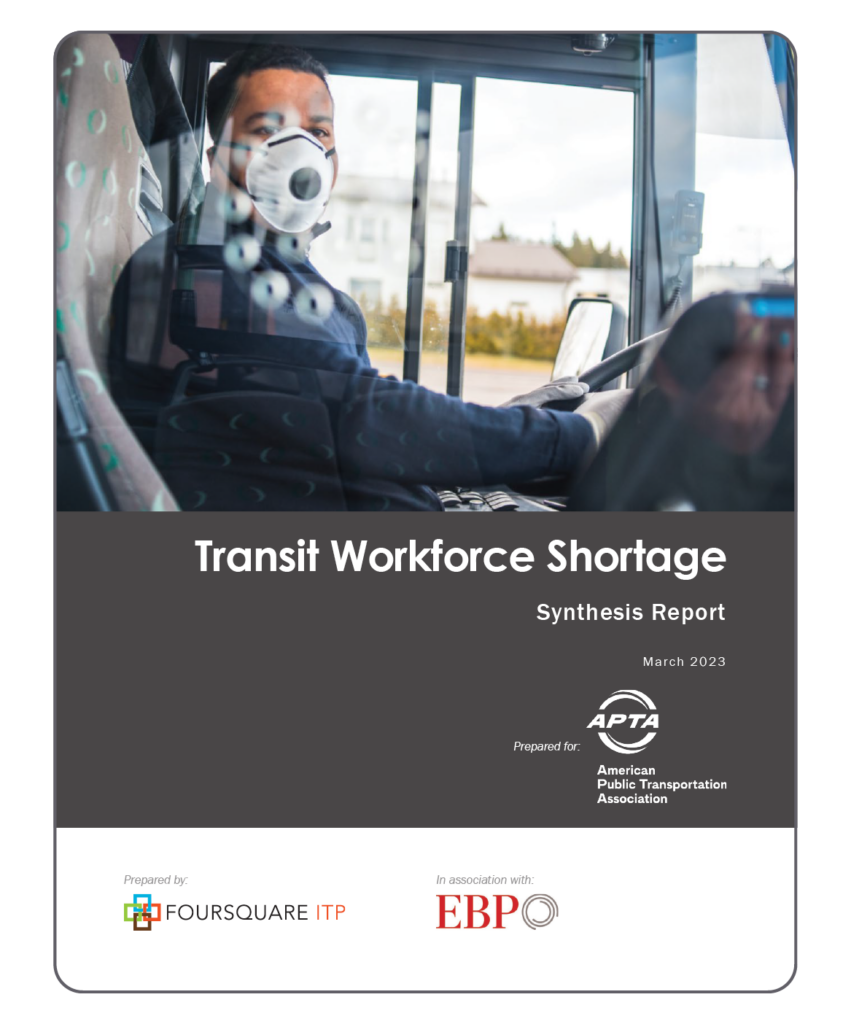
Transit Workforce Shortage: Synthesis Report and Toolkit
The Transit Workforce Shortage Study builds a framework for APTA, its members, and its partner organizations to better understand the workforce shortage’s causes and provides best practices for recruiting, hiring, and retaining transit operations workers.
American Public Transportation Association
March 2023
APTA’s Transit Workforce Shortage Study combines information from a survey of public transit workers and interviews with public transportation agencies to provide insight into ways to address the national shortage of transit workers. The report provides information on actions agencies have taken to address the workforce shortage, and the toolkit provides step-by-step answers to workforce shortage scenarios agencies are facing every day.
This report builds on findings from the first interim report.
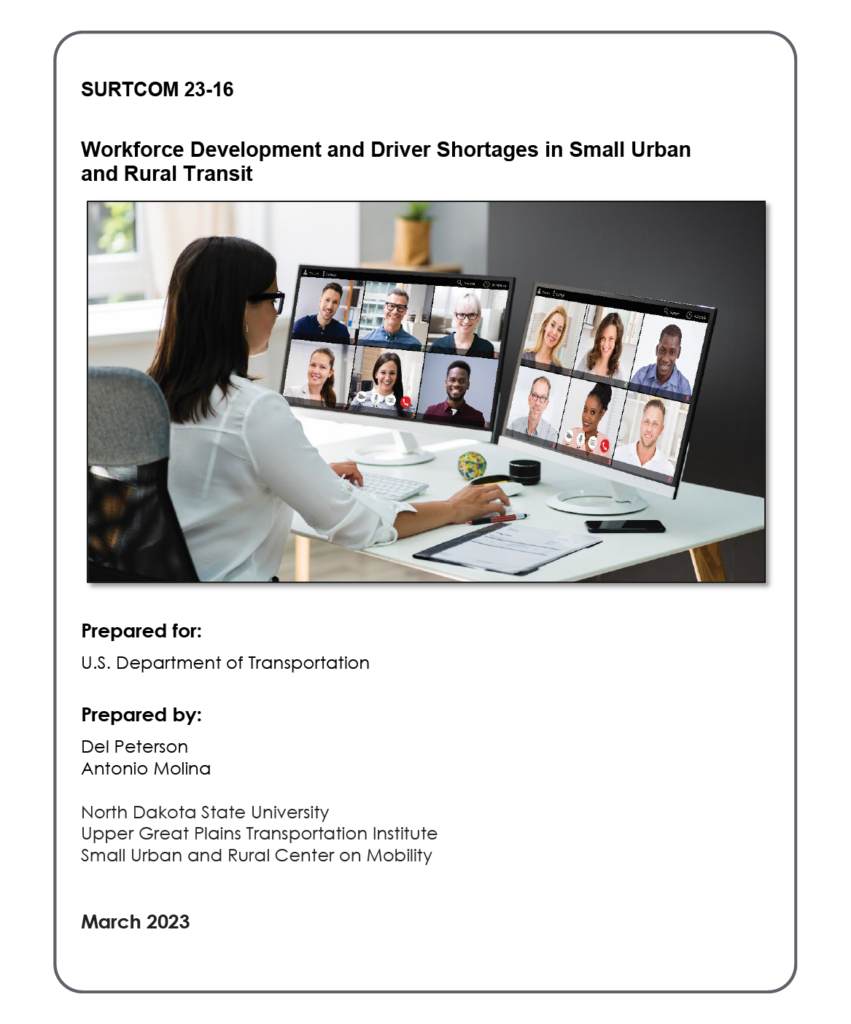
Workforce Development and Driver Shortages in Small Urban and Rural Transit
This report presents a national survey of small urban and rural transit managers to determine current workforce development practices. The survey results outline driver shortages and related issues, including an aging workforce, disruptions in service, and methods of alleviating the shortage.
Small Urban and Rural Center on Mobility
March 2023
TOPICS: Hiring and Recruitment , Retention , Workforce Shortage
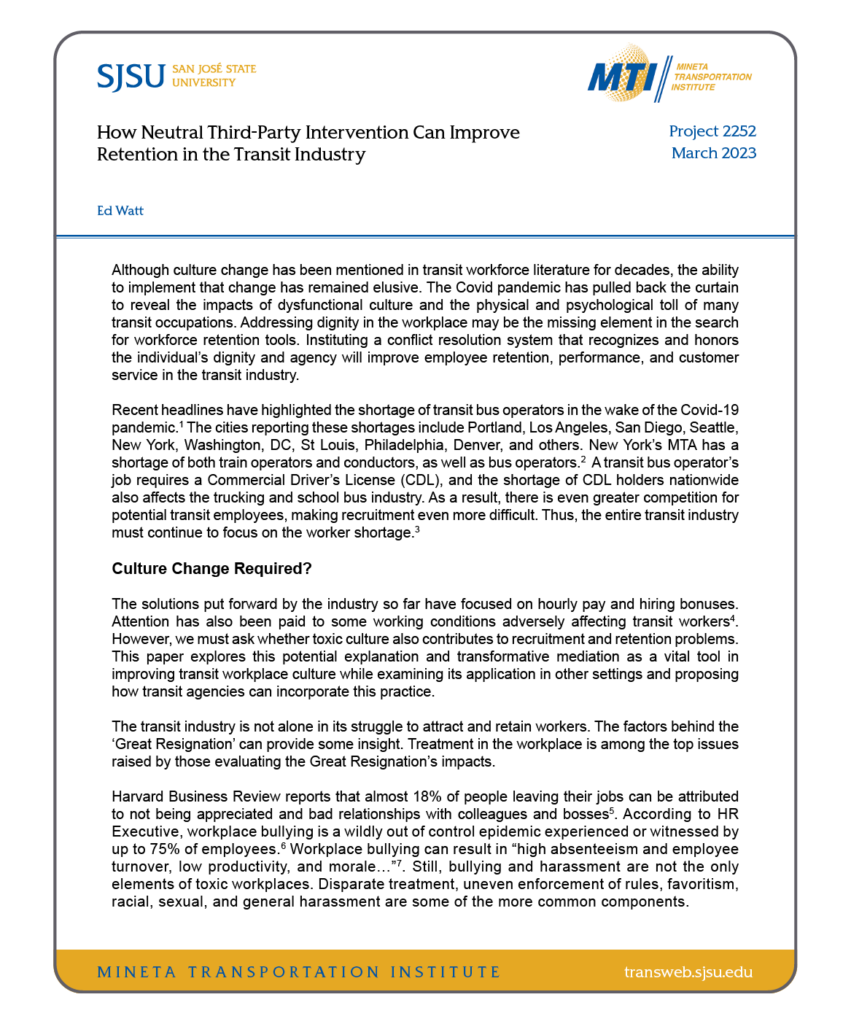
How Neutral Third-Party Intervention Can Improve Retention in the Transit Industry
This study proposes methods that follow transformative mediation in order to improve hiring and retention at transit agencies and other companies by providing an organizational culture that respects each person’s dignity, identity, and opinions.
Mineta Transportation Institute
March 2023
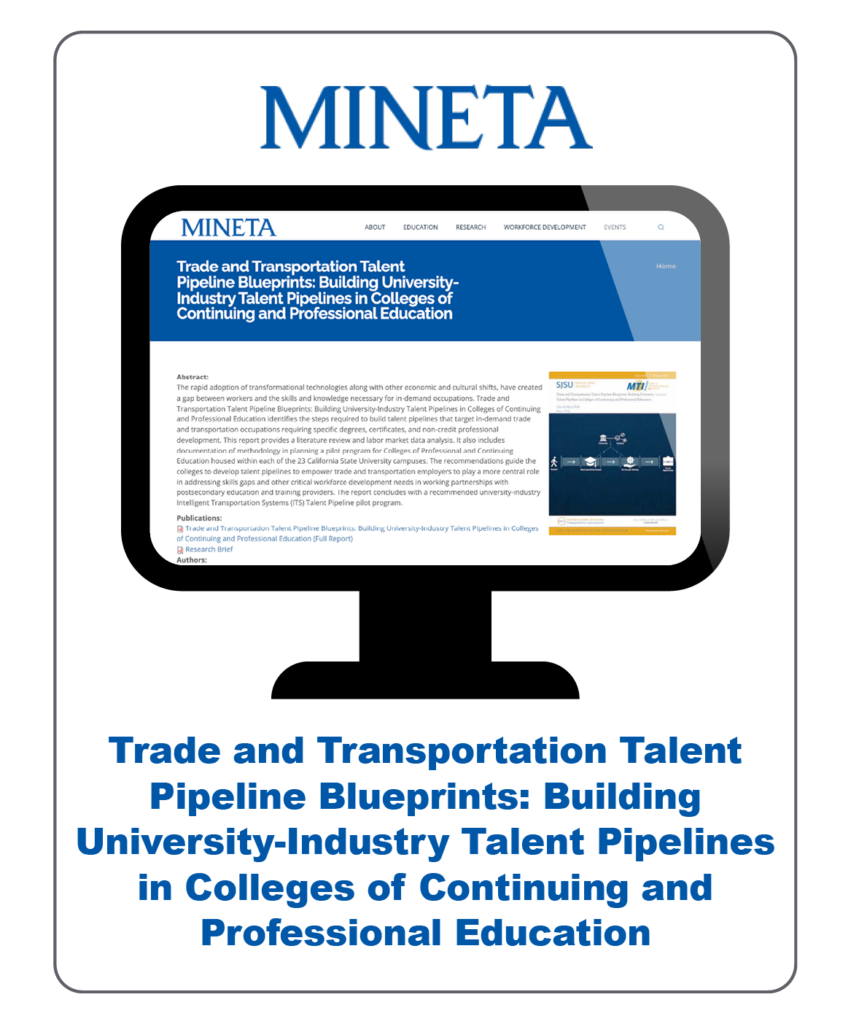
Trade and Transportation Talent Pipeline Blueprints: Building University-Industry Talent Pipelines in Colleges of Continuing and Professional Education
This report identifies the steps required to build talent pipelines that target in-demand trade and transportation occupations requiring specific degrees, certificates, and non-credit professional development and provides a literature review and labor market data analysis. It also includes documentation of methodology in planning a pilot program for Colleges of Professional and Continuing Education housed within each of the 23 California State University campuses.
Mineta Transportation Institute
February 2023
TOPICS: Career Pathways , Hiring and Recruitment , Policy and Planning , Training
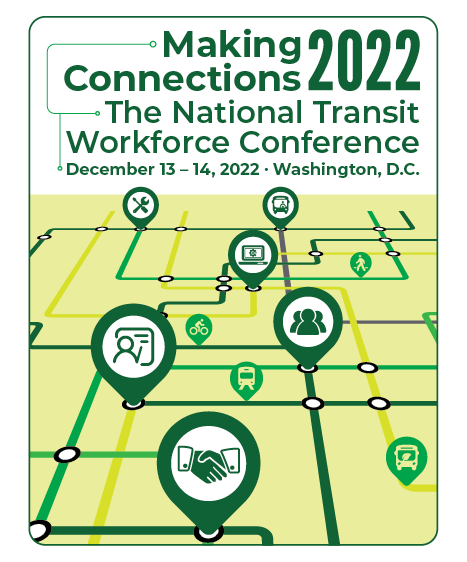
Making Connections 2022 – Conference Overview and Videos
The Transit Workforce Center hosted Making Connections 2022: The National Transit Workforce Conference in Washington, D.C. on December 13-14, 2022. This conference brought together participants from urban, suburban, rural, and tribal public transportation and industry stakeholders in plenaries, workshops, networking, and ongoing dialogue. Discussions and sessions featured topics including recruitment and retention, training, mentoring and apprenticeships, new technologies, and preparing today’s and tomorrow’s workforce.
Transit Workforce Center
December 2022
Session materials from Making Connections 2022 are hosted on the TWC Resource Center. Please click here to view all related materials. A PDF copy of the conference schedule is linked below.
Opening Video:
Recap Video:
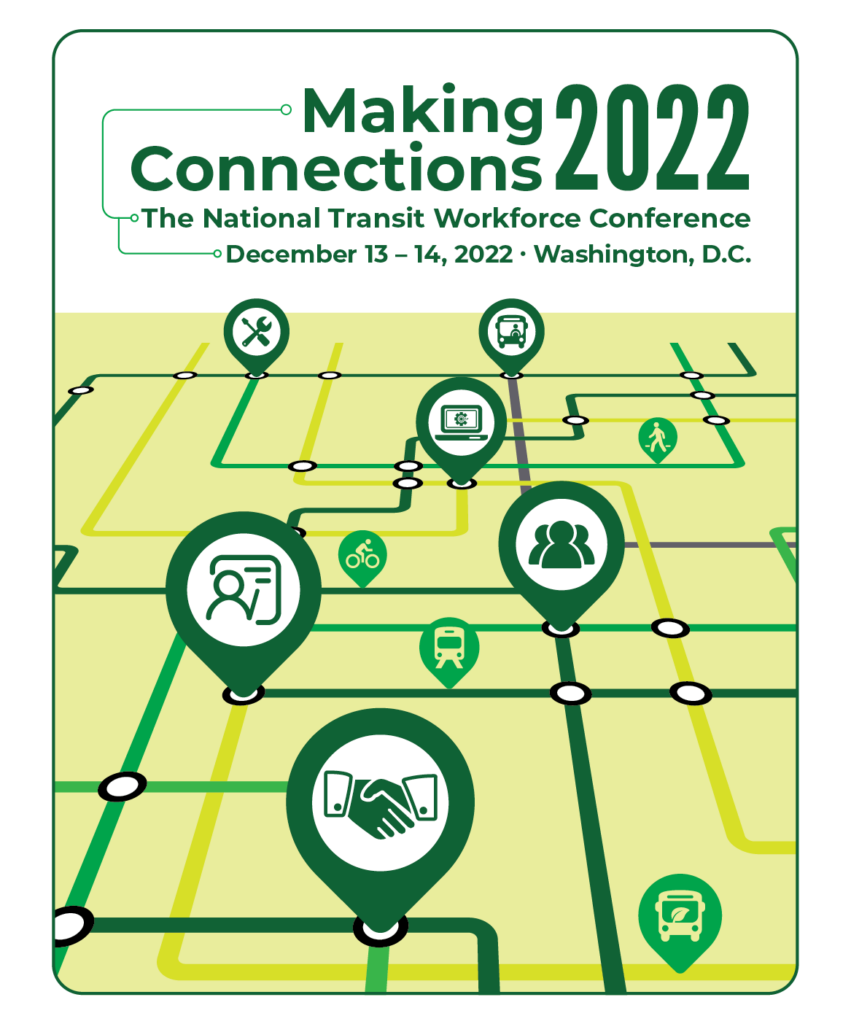
Making Connections 2022 – Driving Bus Operator Recruitment and Retention: Challenges, Opportunities and Innovation
This session about bus operator recruitment and retention was presented as part of TWC’s Making Connections 2022 transit workforce conference in December, 2022.
Transit Workforce Center
December 2022
Session Summary: A headline issue confronting all transit systems today – how to attract and retain bus operators in a tight labor market. This lively session began with presentations from the TCRP F-28 research team and TransitCenter on their recently published national research findings on recruiting, developing and retaining transit bus operators. Labor and management industry practitioners from multiple locations then shared their recruitment approaches and strategies that have been most effective on the ground, and TWC staff summarized the National Transit Frontline Worker Recruitment Campaign.
Moderator
- Rob Puentes: President and CEO – The Eno Center for Transportation
Speakers
- Julia Castillo: Executive Director – Heart of Iowa Regional Transit Agency
- James Duff: Assistant Vice President, Human Resources – Dallas Area Rapid Transit
- Jeff Hazen: Executive Director – Sunset Empire Transportation District
- Steve Jovel: Transportation Superintendent – Santa Clara Valley Transportation Authority
- Robin Phillips: Executive Director – National Rural Transit Assistance Program
- Harpreet Singh: JWI Director – Amalgamated Transit Union Local 265
- David Stephen: Senior Communications Specialist – International Transportation Learning Center/Transit Workforce Center
- Chris Van Eyken: Program Manager – TransitCenter
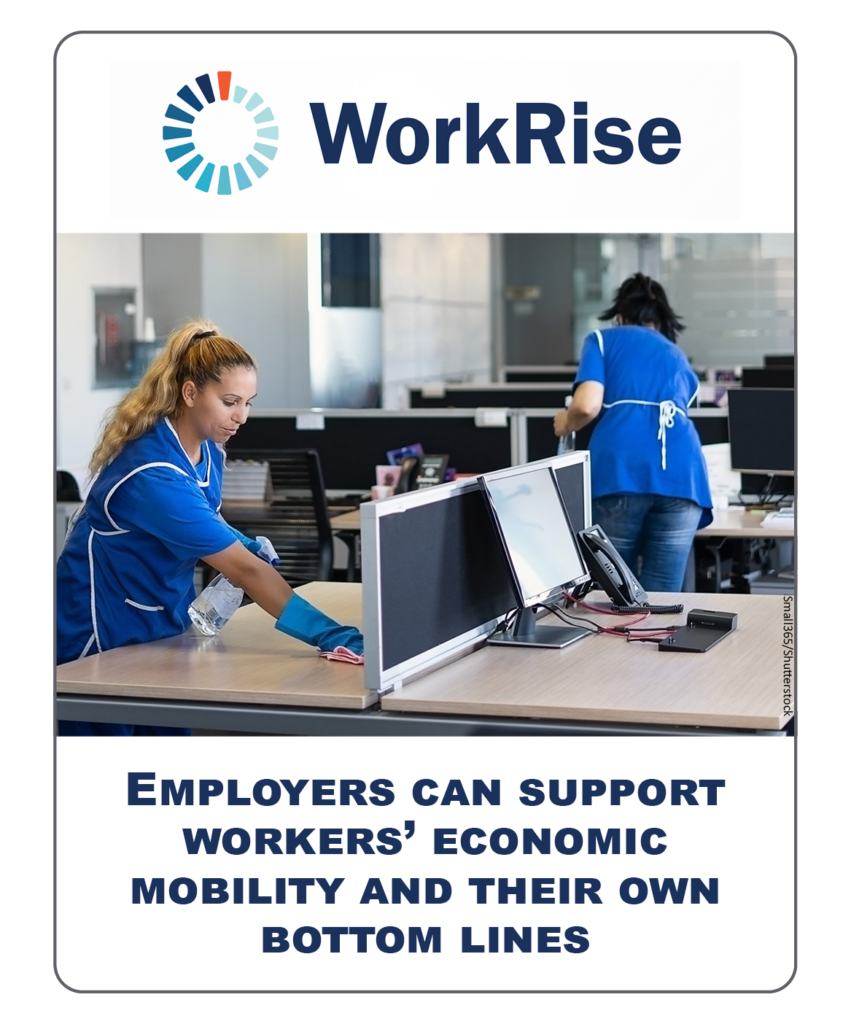
Employers can support workers’ economic mobility and their own bottom lines
This article provides a concise description of several strategies employers can use to create clear advancement pathways in their workplaces, which will help attract and retain quality candidates. It discusses research around what modern-day employees are looking for in a workplace and a position. It also links to a related article, which provides an overview of the framework created by Jobs for the Future (JFF) to describe the components of a good job.
WorkRise
November 2022
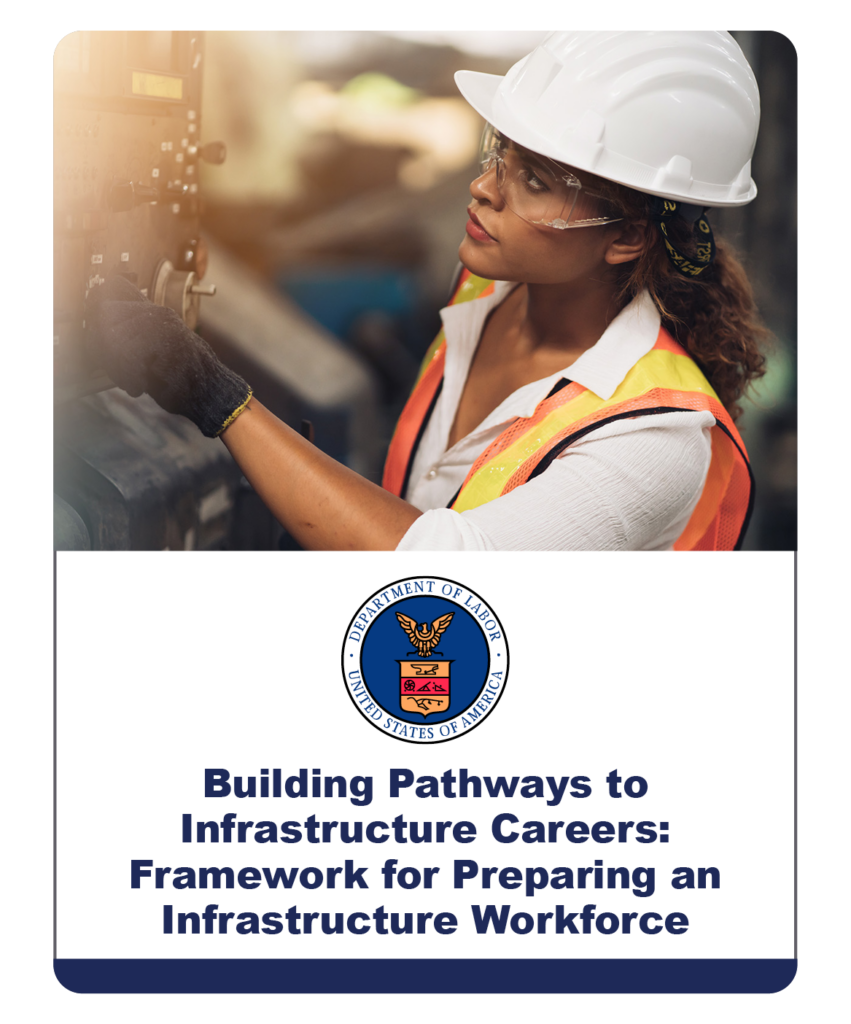
Building Pathways to Infrastructure Careers: Framework for Preparing an Infrastructure Workforce
This resource provides a framework for all workforce stakeholders, including infrastructure project leads, to engage the public workforce system in implementing the Bipartisan Infrastructure Law with strong workforce commitments and proven strategies that produce high-quality education, training, and employment opportunities for all workers.
U.S. Department of Labor, Employment and Training Administration
October 2022
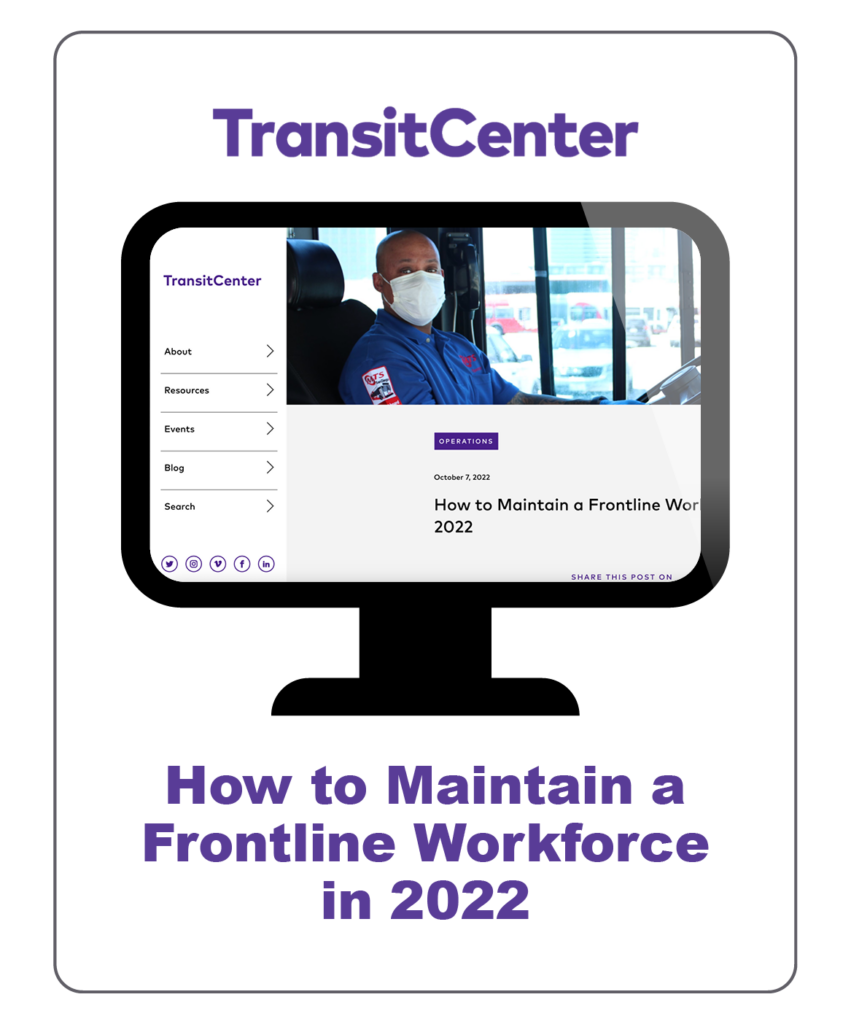
How to Maintain a Frontline Workforce in 2022
TransitCenter
October 2022
TOPICS: Hiring and Recruitment , Retention
This blog post considers steps taken by transit agencies in New York City and San Diego in order to bolster and maintain their frontline workforces in the aftermath of the pandemic and years of labor shortages in the transit industry. The post describes actions like increasing wages, easing CDL requirements, and increasing recruitment efforts.
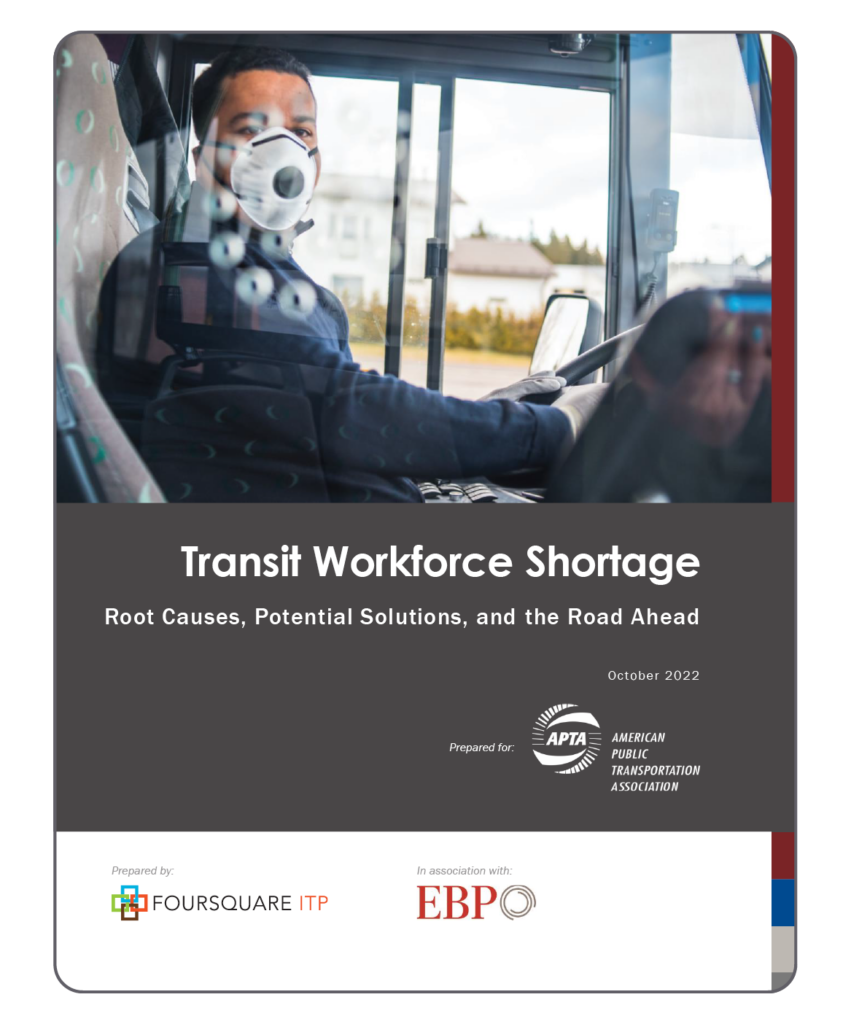
Transit Workforce Shortage: Root Causes, Potential Solutions, and the Road Ahead
American Public Transportation Association
October 2022
TOPICS: Hiring and Recruitment , Policy and Planning , Retention , Workforce Shortage
Public transit providers across North America face a shortage of operators and mechanics during a period of economic instability and reshuffling exacerbated by the COVID-19 pandemic. However, agencies’ ability to respond to the worker shortage has been hampered by inadequate information about its causes and effects. The Transit Workforce Shortage Study builds a framework for APTA, its members, and its partner organizations to better understand the workforce shortage’s causes and provides best practices for recruiting, hiring, and retaining transit operations workers. The study is comprised of two phases. This document, the Interim Findings Report, synthesizes the findings from Phase 1, which included a survey of transit agencies and background research into the macro causes of the shortage.
This report was followed by a full synthesis report and toolkit.
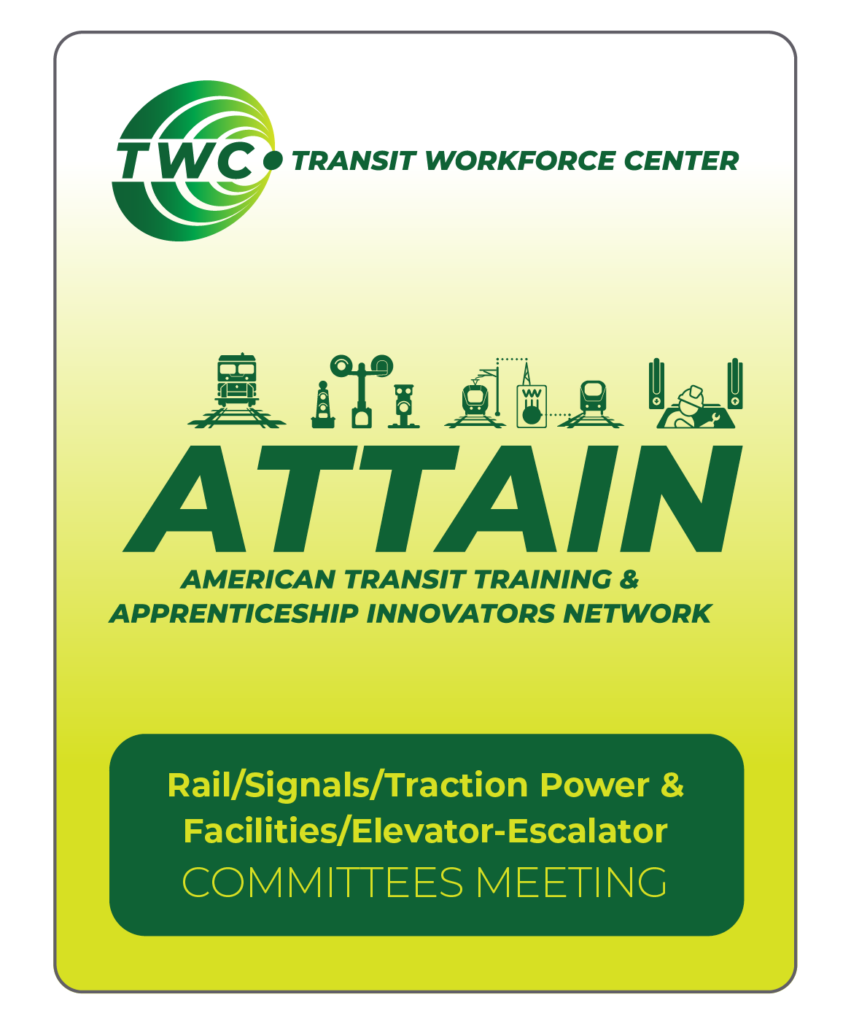
ATTAIN Rail/Signals/Traction Power and Facilities/Elevator-Escalator Committees Meeting
This recorded meeting of the ATTAIN committees for Rail/Signals/Traction Power and Facilities/Elevator-Escalator serves as a resource for transit industry stakeholders and includes presentations on apprenticeship and case studies of successful programs across the country.
Transit Workforce Center
September 2022
TOPICS: Apprenticeship , Career Pathways , Community Engagement , Hiring and Recruitment , Training
The American Transit Training and Apprenticeship Innovators Network (ATTAIN), run by the Transit Workforce Center (TWC), is a peer network created for transit agencies and labor unions to explore new apprenticeship programs or enhance existing programs for their frontline workforce.
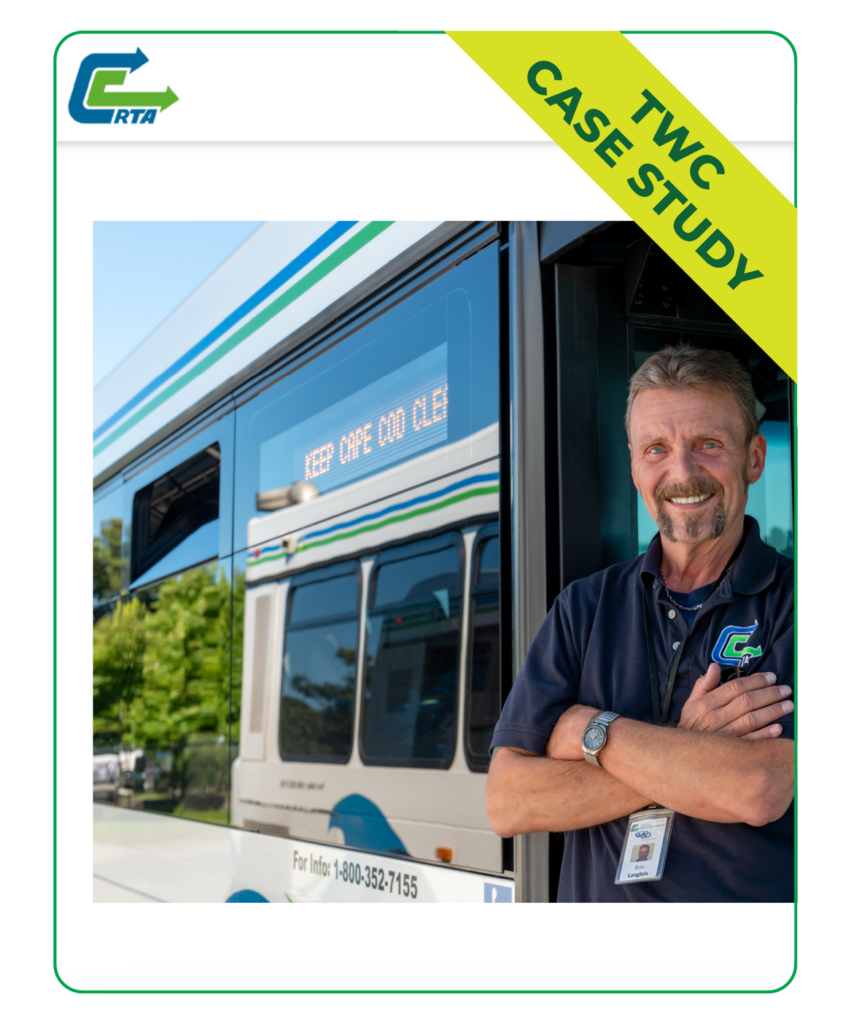
Recruiting Older Workers and Retirees at Cape Cod Regional Transit Authority
Cape Cod Regional Transit Authority; Transit Workforce Center
September 2022
Cape Cod Regional Transit Authority (CCRTA) in Massachusetts serves 15 towns within a 400 square miles area in an area where the population triples in the summer with seasonal residents. CCRTA runs seven year-round fixed route lines, several on-demand and hybrid on-demand services, and three summer shuttle services. In 2021, CCRTA served approximately 2.5 million people with 98 drivers.
Faced with driver shortages, CCRTA and Amalgamated Transit Union Local 1548 worked together and negotiated driver raises and $1,000 bonuses paid after 90-days. In addition, a six-step salary scale to reach the top pay grade was reduced to two steps. Drivers can now reach the top pay level within two years.
Barnstable County’s older adult population is among the largest per capita in the country, and CCRTA has instituted hiring initiatives aimed toward the older worker and retiree population. In connecting with this population, CCRTA has taken a variety of actions, including:
- Reaching out through Cape Cod Elder Services to communicate CCRTA’s interest in hiring older workers. CCRTA’s Human Services Transportation Manager sits on this organization’s board, facilitating ongoing contact.
- Targeting recruitment of retiring teachers, firefighters, police, and school bus drivers. Cape Cod RTA staff visited schools, fire houses, police stations, and municipal offices to share recruitment information.
- Visited each town on Cape Cod, talked with local retirement agency officials, and posted and mailed banners and notices.
- Overall increase in the agency’s traditional and social media presence generally, including advertising explicitly aimed at older adults, including on social media. Developed advertising, messaging, and imagery to make older workers and retirees feel welcome. To see samples of advertising, visit Cape Cod RTA Jobs on Facebook, the ad on their website’s front page, and see the video, featuring older drivers, on the CCRTA career page.
- Emphasizing the short time it takes to reach the highest salary level, a compelling message for older people and retirees, who often value salaries more than benefits, as well as the ability to reach the highest level within their time at the agency.
- Offering various employment options, including full-time and part-time, and seasonal. The agency has found that individual needs lead to varied choices; they estimate their older employees have split 50-50 in what scheduling option they choose.
- Providing full CDL training, testing and additional agency-specific training for all employees without CDLs. The agency pays for all training.
- Offering options for non-CDL drivers, who operate smaller vans. The agency encourages the CDL route because it gives drivers more flexibility in shifts and allows them to work and get paid at a higher rate.
- Currently exploring working with the Barnstable County Retirement Commission to arrange for a notice about CCRTA employment options to be part of the Commission’s information packet when an employee puts in for retirement.
CCRTA values its older workforce and their commitment to the job; through its efforts, it has been able to hire a dozen older adults / retirees as drivers. The agency notes that with this population, it is reasonable to expect excellent attendance, while also allowing for the potential of more short-term disability and time for medical appointments. COVID-19 saw CCRTA lose about half of its older adult workforce, given that population’s sensitivity to exposure. However, CCRTA is renewing its recruitment efforts in this area through the various methods noted.
For more information, contact:
Penny Grossman, H.R. Manager – Pgrossman@capecodrta.org – 508-385-1430, ext. 106
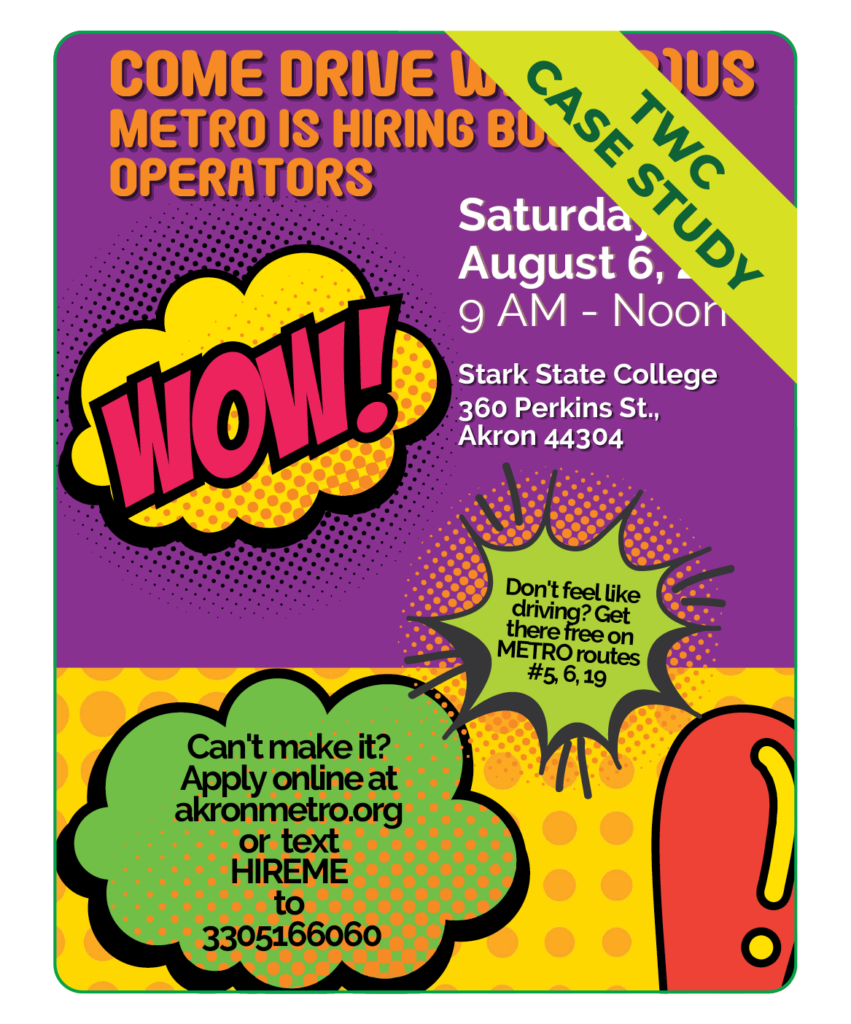
Come Drive with (B)us – Akron METRO Operator Recruitment Event
Akron METRO Regional Transit Authority; Transit Workforce Center
September 2022
TOPICS: Hiring and Recruitment
Organizations
Akron METRO Regional Transit Authority (METRO): Transit agency serving Summit County, Ohio and the city of Akron, with a fleet totaling 231 vehicles: 140 large buses and 91 smaller paratransit vehicles. METRO employs 425 team members.
Stark State College: Local event venue and partner in advertising campaign. METRO is currently in the final stages of an agreement with Stark State to supplement its CDL training program.
Program Summary
METRO’s “Come Drive with (B)us” event was a major initiative designed to recruit bus operators. Held at Stark State College, the event featured on-site bus-related activities, interviews and job applications. Extensive outreach activities before the event through multiple outlets, combined with the themed ad campaign, brought 99 interested participants and resulted in 71 contingent offers. The key “draw” to this event was the ability to test drive our vehicles on a closed course alongside our staff. METRO’s idea was that if the thought of driving a bus was keeping people from applying, they could offer a nontraditional mechanism to overcome that hesitancy. Once that challenge was overcome, the process could focus on the soft skills related to empathy and great customer service that are critical to success.
Key Program Elements
- Pre-event publicity
- Pop Art themed ad campaign (viewable on Facebook; an example is attached below as a PDF)
- Free and purchased advertising through social media, including Instagram, Facebook, and Twitter posts
- Information on METRO’s website
- Print ads in local daily and weekly publications
- Two digital billboards, and flyers on buses and posters at METRO’s transit center
- A radio ad on several local radio stations
- Two days before to the event, Stark State College promoted the event on their digital sign, readable from the expressway
- Four radio personalities from four different stations drove the bus two to three weeks prior to the event and promoted on the air, including one station that put together its own video.
- Television interviews that resulted in a full story and a variety of mentions of the event on other stations
- Creating two bus wraps with the pop art feel (see PDF below) on careers, though not event-specific
- Outreach to past applicants
- Videos of three in-house of staff driving for the first time, along with videos featuring County Executive and Representative Casey Weinstein, and an invite video from METRO’s CEO
- Event activities and design (see PDF of signage below)
- Participants were told to bring a valid driver’s license
- Four clearly-marked stations for applicants to go to where they had the opportunity to:
- Apply
- Interview
- Secure a mobility device
- Drive a bus
- Every applicant moved through all four stations
- At final stop, attendees received:
- Bag of information
- Swag
- Digital and paper copies of the CDL training booklet for them to start studying
- Event planning activities
- Started six to eight weeks before event
- Committee was made of HR, Marketing, Operations, Maintenance and Safety/Security
- Eighteen staff members worked the day of the event – five working check-in/applications, five doing on-site interviews, two working the mobility station, five running the “test drive” station, and one runner to move between all stations to relieve backlog
- Used seven 40 foot buses (2 spares) and 2 paratransit vehicles
Outcomes
- Ninety-nine event attendees interviewed and were able to test drive
- Twenty-five additional people applied who could not attend; follow up interviews were planned
- 71 of the 99 were moved through to a “contingent offer” pending background checks with a start date of September 26th
- Twenty-three of the 99 had areas of their application that required reviewing before proceeding
For more information on this event, contact: Jarrod Hampshire – Chief Operations Officer, METRO RTA 330.808.0144
More recruitment advertising materials and resources can be found here.
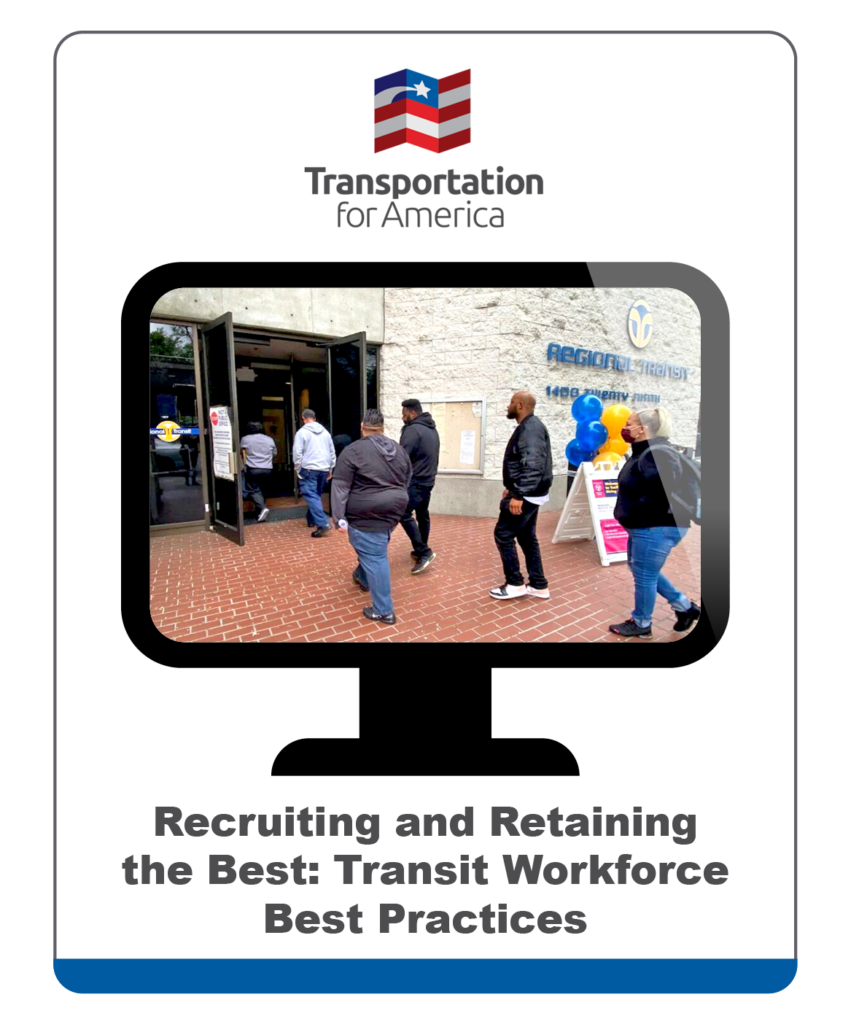
Recruiting and Retaining the Best: Transit Workforce Best Practices
This blog post from Transportation for America details successful strategies and best practices employed by transit agencies to empower their operator and maintenance workforces.
Transportation for America
September 2022
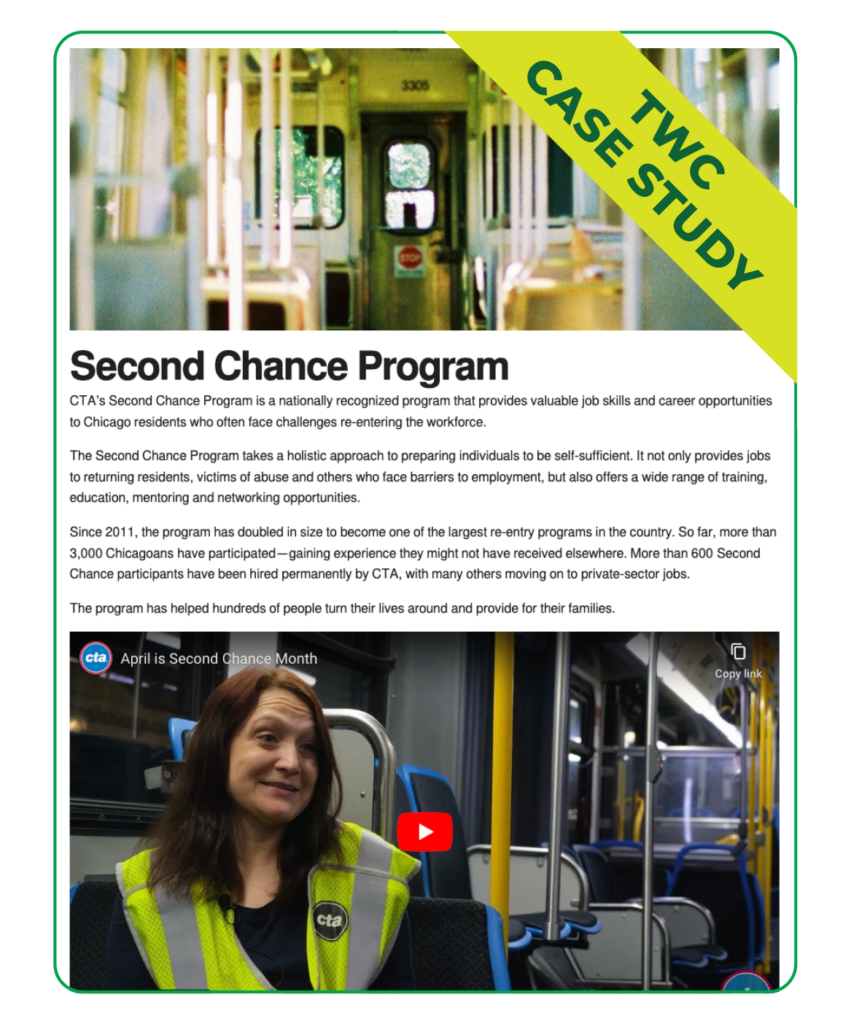
Second Chance Transit Programs
Several transit agencies across the country have established Second Chance programs to support formerly-incarcerated individuals as they reenter the workforce; these programs set pathways into frontline transit positions, often focusing on driver recruitment. These initiatives involve active collaboration between transit agencies and departments of corrections. Agencies have also worked with other partners, including their local unions, state and local workforce development agencies, ex-offender support programs, and local community organizations.
August 2022
Basic descriptions of some current state and local programs can be found at the links below.
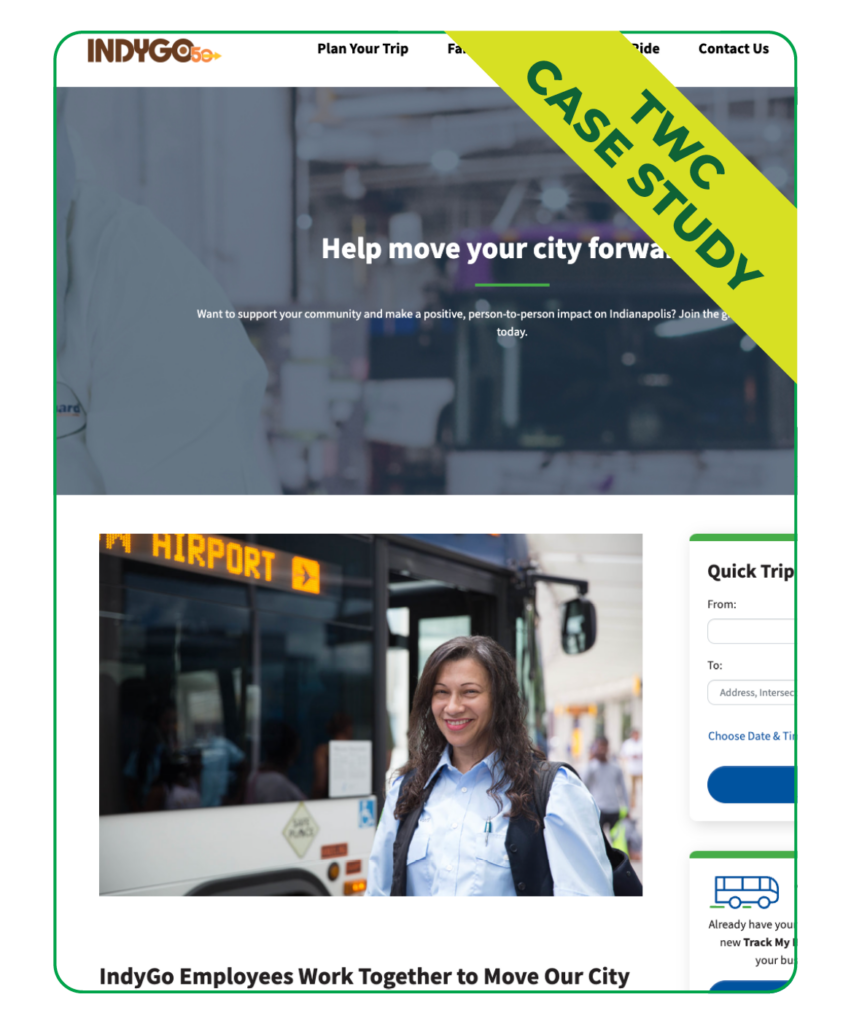
IndyGo’s Employment Opportunities Page
The IndyGo transit agency, based in Indianapolis, Indiana, offers high-quality career information on its website. This resource summarizes effective elements of the career page.
IndyGo
August 2022
TOPICS: Career Pathways , Hiring and Recruitment
IndyGo’s career page helps site visitors to understand what it’s like to work at the agency and how to apply. The page also highlights key job benefits and emphasizes the opportunity to serve the community. Overall, the employment section of IndyGo’s website demonstrates a number of key communication elements that support effective outreach to potential applicants. These elements include:
- An easily accessible and identifiable section on the website. “Employment” has its own clickable category, not a subcategory that may be harder to locate.
- Clear statements about IndyGo’s mission, emphasizing community service, connection, and working together to make a difference in people’s lives. These messages attract a range of potential target audiences, and they make clear the difference between a public service career, as opposed to other careers applicants may be considering.
- A detailed list of benefits, with additional specific benefits for drivers noted. Among those benefits, the list includes unique aspects of the driver position that distinguishes it from other potentially competing careers (e.g., long-haul trucking), noting benefits such as “all local work.”
- Highlighted aspects of the driver position that emphasize the connection with and support provided to riders.
- A thoughtful list of questions for potential applicants to consider about themselves and the type of work they might want before they decide to move ahead with the application.
- Detailed information on how and where to apply, basics of how to prepare for and what to bring to an interview, and important specifics about the steps of the hiring process and initial orientation and training programs.
- IndyGo’s Why I Drive segment on their website includes a video featured in the National Frontline Workforce Recruitment Campaign Toolkit video library elsewhere on this website. That link on IndyGo’s website also features brief worker profiles, another summary of benefits, and a note on IndyGo’s Second Chance Initiative.
- IndyGo’s website includes a prominent option to translate the site into Spanish.
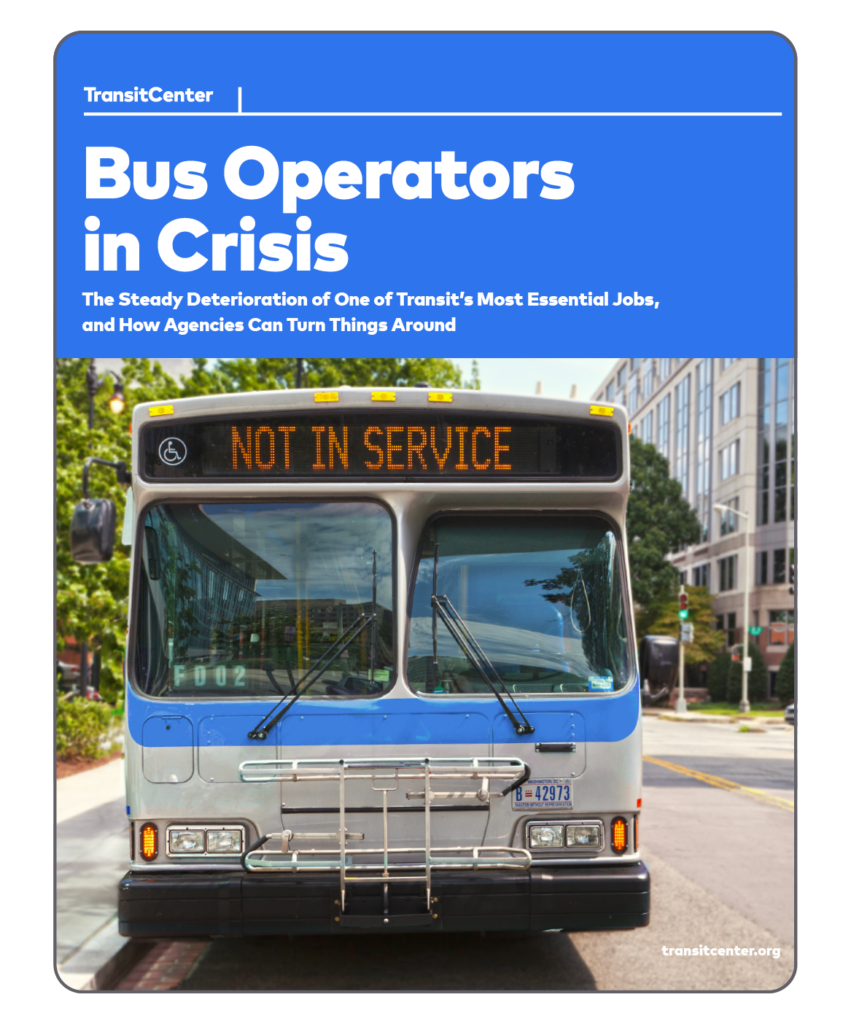
Bus Operators in Crisis
TransitCenter’s report, entitled Bus Operators in Crisis: The Steady Deterioration of One of Transit’s Most Essential Jobs, and How Agencies Can Turn Things Around, analyzes the nationwide phenomenon of bus operator shortages and advocates for enhanced job quality in the occupation. It details the challenges American operators are facing, and offers solutions that transit agencies can take to solve issues locally, as well as steps that state and the federal governments can take to provide agencies with necessary support.
TransitCenter
July 2022
TOPICS: Apprenticeship , Career Pathways , Community Engagement , Hiring and Recruitment , Retention
This resource also includes a link to a webinar hosted in July, 2022 presenting information from the report and slides from the webinar.
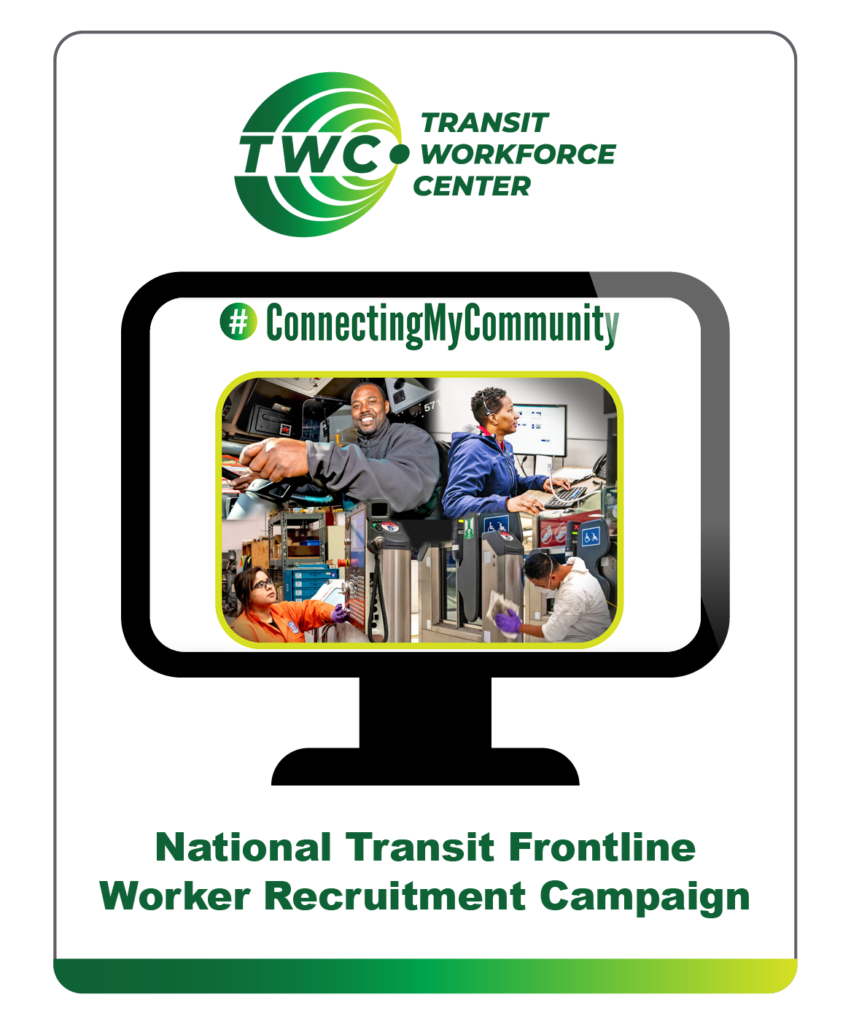
National Transit Frontline Worker Recruitment Campaign
Across the United States, whether large, small, urban, rural, or tribal, transit agencies are facing the challenge of recruiting and retaining drivers, mechanics, and technicians who can operate and maintain the buses of our public transit systems. To help support local transit efforts, TWC is developing the #ConnectingMyCommunity national frontline worker recruitment campaign, coordinated with the Federal Transit Administration (FTA) and industry, labor, and community partners from around the country.
Transit Workforce Center
July 2022
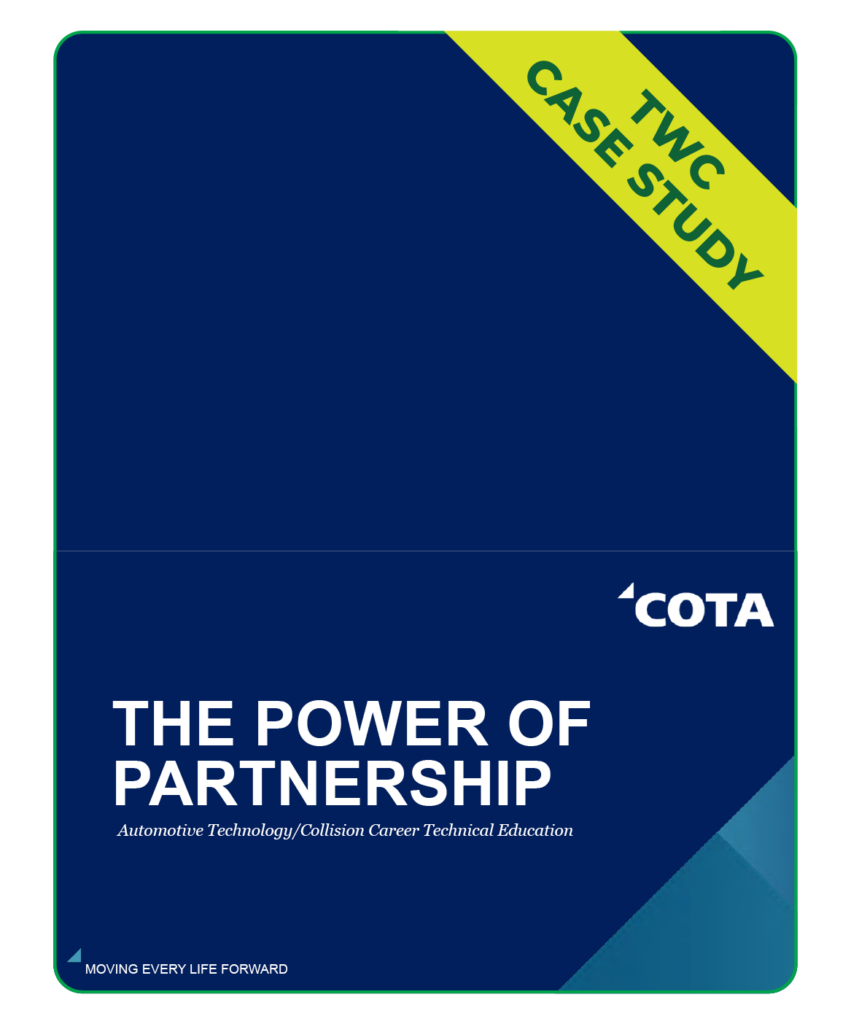
The Power of Partnership: Automotive Technology/Collision Career Technical Education Program
This multimedia case study details an internship program developed by the Central Ohio Transit Authority (COTA) and Transport Workers Union (TWU) Local 208. This resource contains a brief written summary, presentation slides, and video of a COTA-TWU Local 208 presentation. The entire June 7, 2022 TWC webinar, Recruiting and Developing Today’s Transit Workforce, can be found here. The complete webinar recording includes a question and answer session, beginning at 51:53, that covers more detail on this and other recruitment initiatives.
Transit Workforce Center; Central Ohio Transit Authority (COTA); Transport Workers Union Local 208
June 2022
To meet its need for vehicle maintenance technicians, COTA leadership partnered with TWU Local 208 and Columbus City Schools to provide a Vehicle Maintenance Internship Program, helping students already enrolled in an automotive program to develop additional technology competencies and prepare them for entry level positions. The COTA Vehicle Maintenance Internship Program provides career technical center high school students who have completed their junior year in a participating career-technical program the opportunity to work as paid interns in the Vehicle Maintenance Department at COTA. Students receive classroom training, hands-on training, laboratory experiences, and are partnered with mentors in preparation to enter the workforce as entry level automotive/collision technologies service technicians. From this foundation, COTA has now established a state-registered pre-apprenticeship and apprenticeship program to support vehicle technician hiring, retention, and workforce development.
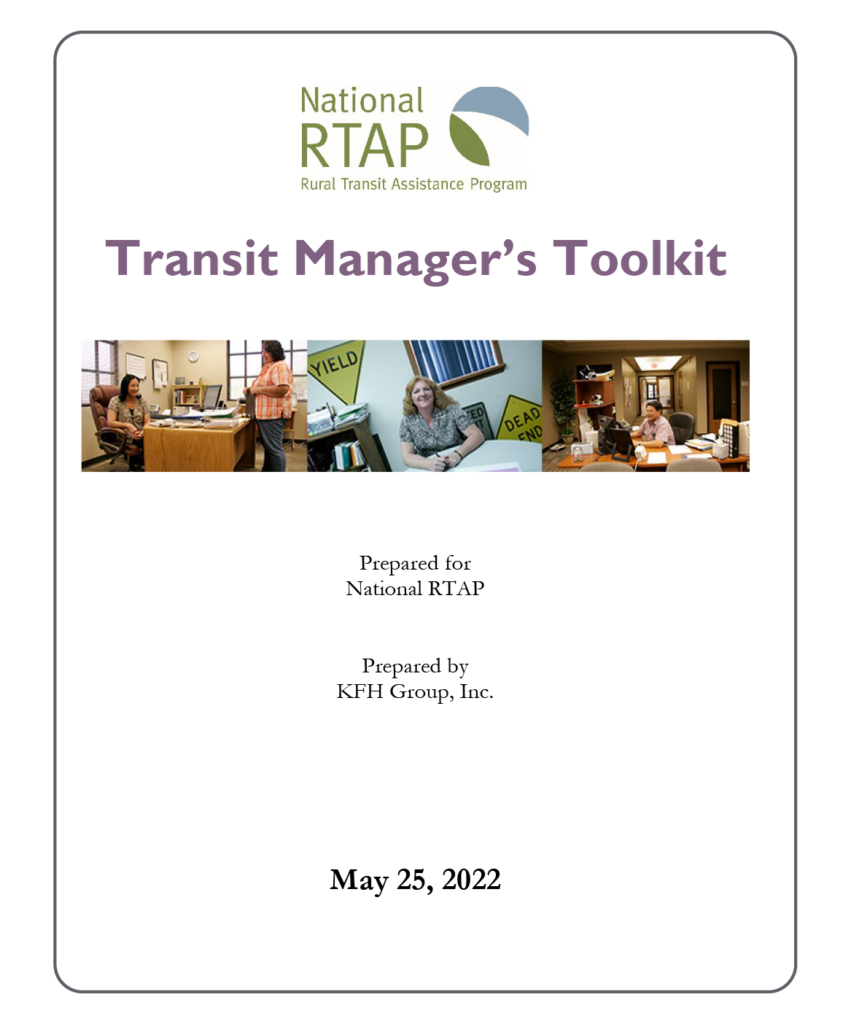
Transit Manager’s Toolkit: Driver Recruitment, Training, and Retention
This toolkit from National RTAP introduces both requirements and suggested practices in driver recruiting/hiring, retention/motivation, and training. It includes information about federal requirements, how to create a positive work environment, and training standards.
National Rural Transit Assistance Program
May 2022
TOPICS: Hiring and Recruitment , Retention , Training
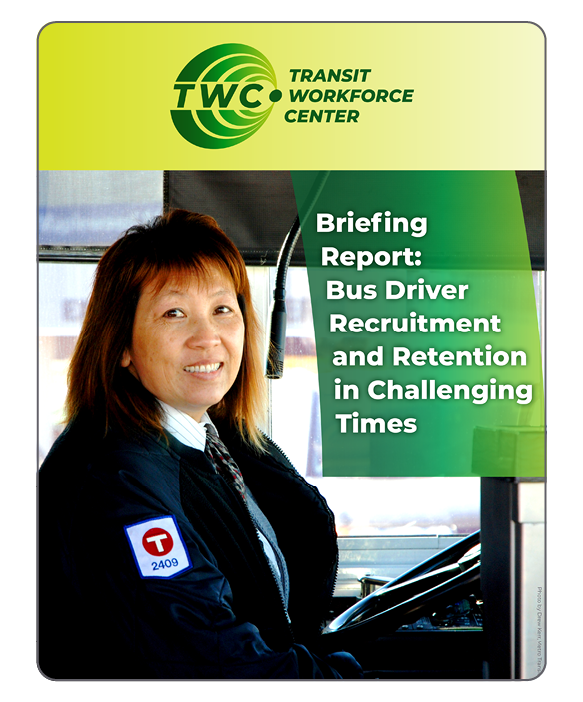
Bus Driver Recruitment and Retention in Challenging Times
Transit Workforce Center
April 2022
TOPICS: Hiring and Recruitment , Retention , Safety and Health , Workforce Shortage
While the U.S. public transportation industry has long had a significant bus operator shortage, it has been magnified by the COVID-19 pandemic. COVID-19 has not only exacerbated existing trends, but also introduced new labor market dynamics. This brief describes overall workforce trends for bus operators, obstacles to recruitment, and challenges for workforce retention, to help inform efforts to recruit more drivers nationwide.
Overall workforce trends
According to 2020 Bureau of Labor Statistics (BLS) data, there are 162,850 bus operators nationally. Federal government projections indicate strong growth for bus operators; BLS estimates the occupation will grow “much faster than average (15 percent or higher).”[1] To keep up with growth and make up for retirements and turnover, the industry will need to recruit scores of new workers. BLS reported an annual average of 24,600 projected bus operator job openings for 2020 to 2030.[2]
According to BLS, annual wages for the occupation were $45,900 in 2020, which was higher than the national median of $41,950.[3] Despite having a reputation for paying relatively well and providing robust benefits,[4], [5] transit agencies have faced significant challenges to recruit workers in sufficient numbers to meet the growing demand. The rise of COVID and the omicron variant have created a “labor crisis” in transit, leading Houston Metro to offer bonuses of $4,000 for new drivers, and NYC to try to lure workers out of retirement, for example.[6]
Demographic challenges
One major demographic challenge contributing to the current operator shortage is the disproportionately older bus operator workforce. As Figure 1 on the next page shows, the median age of U.S. workers was 42.2 years in 2021, and 42.8 years in transportation and warehousing. For the bus service and urban transit industry, it was 52.7, which is substantially higher than both the nationwide median age for workers and the median age for other subsectors within transportation and warehousing, such as air or rail transportation.[7] The higher median age of urban transit workers is largely attributable to the older age of bus drivers (median 53.3 years)[8], who constitute 60 percent of the workforce[9]. A large percentage of workers are expected to retire in the coming years.[10], [11]
COVID-related health and safety issues
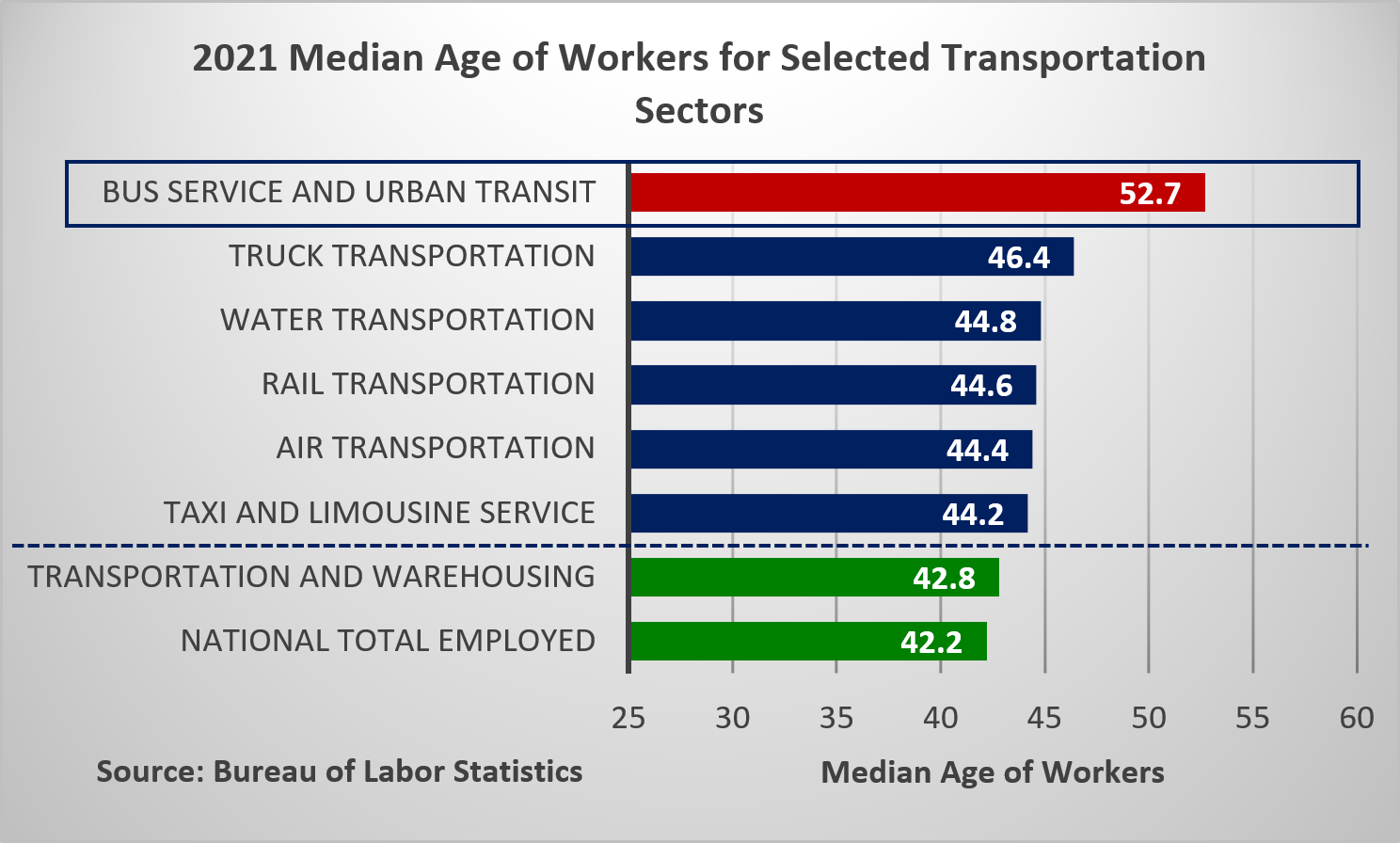
Figure 1. 2021 Median Age of Workers for Selected Transportation Sectors
As frontline workers, bus operators risk exposure to COVID-19, and serious health consequences, even death. For example, in New York City, 136 MTA operators died around the start of the pandemic.[12] As of December 2021, more than 2,000 COVID cases have been reported among WMATA workers since the pandemic began; seven of the workers died. According to CTAA, some member agencies have experienced as many as 40 percent of their operators absent from work due to sickness.[13] COVID-related factors have resulted in bus operator shortages and service cuts,[14] a trend which has occurred in transit systems nationwide. In addition, some drivers have quit due to fears about the virus or been terminated due to failure to comply with vaccination and testing policies.[15]
Pre-existing labor market dynamics
The pandemic has also exacerbated existing workforce challenges, such as competition for pay. Stakeholders interviewed for a GAO study reported that other industries which hire workers with similar levels of education, including fast food, may attract workers instead of transit, especially in rural areas or areas with low unemployment.[16] When the economy is strong, construction also tends to attract workers who might otherwise work in transit. Furthermore, some workers leave the transit industry once they have earned their CDL.[17]
CDL and new requirements
Transit bus drivers are generally required to hold Class B Commercial Drivers’ Licenses and passenger (P) endorsements. Due to the high cost of self-funding CDL training, employer-sponsored training programs in which costs are covered, such as those run by transit agencies, are an attractive option for job seekers. However, the potential exists for trainees to pursue employment in commercial driving or another sector after completing a transit-oriented training program.[18] This dynamic is particularly challenging given concurrent shortages of truck and school bus drivers.[19]
Individuals are required to hold a standard driver’s license to qualify for a commercial learners’ permit, which in turn is needed to pursue CDL training.[20] These requirements may impact recruitment of young people, as rates of driver’s license attainment for 18–24 year-olds have decreased slightly in recent decades and may be lower during recessionary periods and among residents of cities.[21]
Regulatory changes impacting entry level driver training (ELDT) may also affect agencies’ ability to fill positions. As of February 7, 2022, the FMCSA has started enforcing universal training standards for entry level driver training and maintaining a database of qualified providers (the Training Provider Registry).[22] Professional organizations representing transit agencies such as APTA and CTAA have expressed concern about these additional regulatory requirements. Agency contacts have also identified challenges related to requirements around license renewal, medical fitness testing, the availability of training during the pandemic and delays with local DMVs processing CDL application due to pandemic staff shortages. FMCSA has granted waivers around certain other CDL requirements during the pandemic, and recently announced a grant to support state capacity for CDL licensing, though the emphasis appears to be on commercial trucking. [23], [24]
Assaults against drivers
Driver safety has been a persistent problem. Assaults against drivers and altercations with passengers have been well-publicized in communities that transit serves.[25], [26]A 2015 Monthly Labor Review article identified violence as a key challenge facing drivers, with examples including a 2012 attack with rocks in Washington, DC and a 2013 shooting in Seattle.[27] More recently, drivers have reported increased stress during the pandemic and face threats including violence related to passenger non-compliance with mask mandates, among other issues. Such incidents have deterred potential applicants from considering a transit driving career and contributed to early retirements.[28]
Lack of interest from younger generations
Younger workers have different expectations about the workplace, which has made it challenging for agencies to recruit them. Younger workers tend to value flexible schedules, yet operators must often work on holidays and weekends, especially when they first start in the field. New hires in general may not find this attractive.[29]
Advances in technology
Advances in technology present challenges to recruitment and retention. The rise of automation and apps requires drivers to possess technical knowledge to operate newer buses and assist customers; this means there is a relatively small pool of qualified workers. Additional and new types of training are needed for both incumbent and new workers to adapt. Furthermore, drivers report feeling stress from being monitored more often by cameras and tracking technology.[30], [31]
Stress and burn-out
Finally, being a bus operator is a highly stressful occupation. Drivers must operate large vehicles on congested city streets on tight time schedules.[32] They work relatively long hours with infrequent breaks.[33] As discussed earlier, technological advances have contributed to worker stress as well. Operators also experience burn-out due to the stress of dealing with passengers, who may ignore COVID safety rules,[34] or be unruly or violent.
Conclusion
Bus operators have been in short supply for years, and this problem has been magnified by COVID-19. An aging workforce and labor exits related to COVID have largely contributed to the shortage. Top obstacles to recruitment and retention include pandemic-related health and safety issues, pre-existing labor market dynamics including competition over pay, CDL requirements, assaults against drivers, and lack of interest from younger generations. Other contributing factors include advances in technology, perceptions of inflexibility, and stress. To address these workforce recruitment and retention issues for bus operators, key stakeholders from management and labor should keep these data and trends in mind.
Bus Operator Recruitment Campaign
The Transit Workforce Center (TWC) is currently developing a national campaign in coordination with the FTA, along with key labor and industry partners, to effectively address the national bus operator shortage. The TWC is preparing to create a toolkit of materials designed to be adapted by agencies and labor union locals that will consist of templates for commercial scripts, postcard mailers, exhibit banners, talking points for public meetings, social media postings, informational video scripts, and letters of introduction. If any organization has existing models that should be incorporated into these plans, please contact Senior Communications Specialist David Stephen at dstephen@transportcenter.org.
Contributing Authors: Benjamin Kreider (Consultant); Xinge Wang; Douglas Nevins
[1] Bureau of Labor Statistics. Occupational Employment and Wages, May 2020. 53-3052 Bus Drivers, Transit and Intercity. https://www.bls.gov/oes/current/oes533052.htm
[2] Bureau of Labor Statistics. Table 1.7: Occupational projections, 2020–30, and worker characteristics, 2020. https://www.bls.gov/emp/tables/occupational-projections-and-characteristics.htm.
[3] Summary Report for: 53-3052.00 – Bus Drivers, Transit and Intercity. O*Net Online. https://www.onetonline.org/link/summary/53-3052.00?redir=53-3021.00.
[4] Shared-Use Mobility Center. “Case Study: Managing the Labor Shortage at Transit Agencies.” November 5, 2021. https://learn.sharedusemobilitycenter.org/casestudy/managing-the-labor-shortage-at-transit-agencies/.
[5] Laura Bliss. “There’s a Bus Driver Shortage. And No Wonder.” Bloomberg City Lab. June 28, 2018. https://www.bloomberg.com/news/articles/2018-06-28/there-s-a-bus-driver-shortage-and-no-wonder.
[6] Eli Rosenberg. “Labor shortages are hampering public transportation systems, challenging the recovery of city life.” Washington Post. December 28, 2021. https://www.washingtonpost.com/business/2021/12/28/worker-shortages-public-transportation/.
[7]Bureau of Labor Statistics. Table18b: Employed persons by detailed industry and age. https://www.bls.gov/cps/cpsaat18b.htm.
[8] Bureau of Labor Statistics, Table 11b: Employed persons by detailed occupation and age, 2020. https://www.bls.gov/cps/cpsaat11b.htm.
[9] Bureau of Labor Statistics, National Employment Matrix. https://data.bls.gov/projections/nationalMatrix?queryParams=485100&ioType=i.
[10] Jack Clark. Testimony before the House Transportation Infrastructure Subcommittee on Highways. March 13, 2019. https://transportation.house.gov/imo/media/doc/Testimony-%20Clark.pdf.
[11] Robert Puentes et al. “Practitioner’s Guide to Bus Operator Workforce Management.” Transportation Research Board of The National Academies of Sciences, Engineering, and Medicine. November, 2021. Unpublished interim report.
[12] Benito Perez. “After COVID, who’s driving the bus?” Transportation For America. Nov 2, 2021. https://t4america.org/2021/11/02/bus-operator-shortage/.
[13] Justin George. “Omicron deepens bus driver shortage, frustrating passengers as transit agencies pare back service.” Washington Post. January 15, 2022. https://www.washingtonpost.com/transportation/2022/01/15/covid-omicron-bus-transit/
[14] Justin George. “Bus operator shortage due to covid prompts Metro to reduce bus service.” Washington Post. December 23, 2021. https://www.washingtonpost.com/transportation/2021/12/23/dc-metro-bus-shortage-covid/.
[15] “MARTA Making Temporary Service Modifications to Address Bus Operator Shortage.” Metro Magazine. https://www.metro-magazine.com/10155945/marta-making-temporary-service-modifications-to-address-bus-operator-shortage. November 12, 2021.
[16] US Government Accountability Office. “Transit Workforce Development – Improved Strategic Planning Practices Could Enhance FTA Efforts.” GAO-19-2090. March 2019. https://www.gao.gov/assets/700/697562.pdf. P. 15.
[17] Puentes et al., 2021.
[18] Puentes et al., 2021. P. 37.
[19] Bliss, 2021.
[20] FMCSA. “Commercial Driver’s License: States.” December, 2019. https://www.fmcsa.dot.gov/registration/commercial-drivers-license/states
[21] Tefft, B. C. & Foss, R. D. “Prevalence and Timing of Driver Licensing Among Young Adults, United States, 2019.” October, 2019. AAA Foundation for Traffic Safety. https://aaafoundation.org/wp-content/uploads/2019/10/19-0500_AAAFTS_Teen-Driver-Safety-Week-Brief_r1.pdf
[22] FMCSA. “Commercial Driver’s License: Entry-Level Driver Training (ELDT). February, 2022. https://www.fmcsa.dot.gov/registration/commercial-drivers-license/entry-level-driver-training-eldt
[23] FMCSA. “Waiver in Response to the COVID-19 National Emergency –For States, CDL Holders, CLP Holders, and Interstate Drivers.” December 15, 2020. https://www.fmcsa.dot.gov/emergency/waiver-response-covid-19-national-emergency-states-cdl-holders-clp-holders-and-1
[24] U.S. DOT. “DOT, DOL Announce Expansion of Trucking Apprenticeships, New Truck Driver Boards and Studies to Improve the Working Conditions of Truck Drivers.” January 13, 2022. https://www.transportation.gov/briefing-room/dot-dol-announce-expansion-trucking-apprenticeships-new-truck-driver-boards-and
[25] Puentes et al., 2021. P. 36.
[26] Luz Lazo. “Citing attacks directed at buses, Metro weighs service cuts in Anacostia.” Washington Post.
[27] Bureau of Labor Statistics. “When the wheels on the bus stop going round and round: occupational injuries, illnesses, and fatalities in public transportation.” 2015. https://www.bls.gov/opub/mlr/2015/article/when-the-wheels-on-the-bus-stop-going-round-and-round.htm#_edn1..
[28] Chris Teale. “Transit workers face growing rate of assaults: ‘There’s not much we can do.’” Smart Cities Dive. February 17, 2021. https://www.smartcitiesdive.com/news/transit-workers-face-growing-rate-of-assaults-theres-not-much-we-can-do/594959/
[29] Puentes et al., 2021.
[30] Puentes et al., 2021.
[31] GAO, p. 16.
[32] Bliss, 2018.
[33] GAO, 2019; Puentes et al., p. 14.
[34] Justin George. “Omicron deepens bus driver shortage, frustrating passengers as transit agencies pare back service.” Washington Post. January 15, 2022. https://www.washingtonpost.com/transportation/2022/01/15/covid-omicron-bus-transit/.
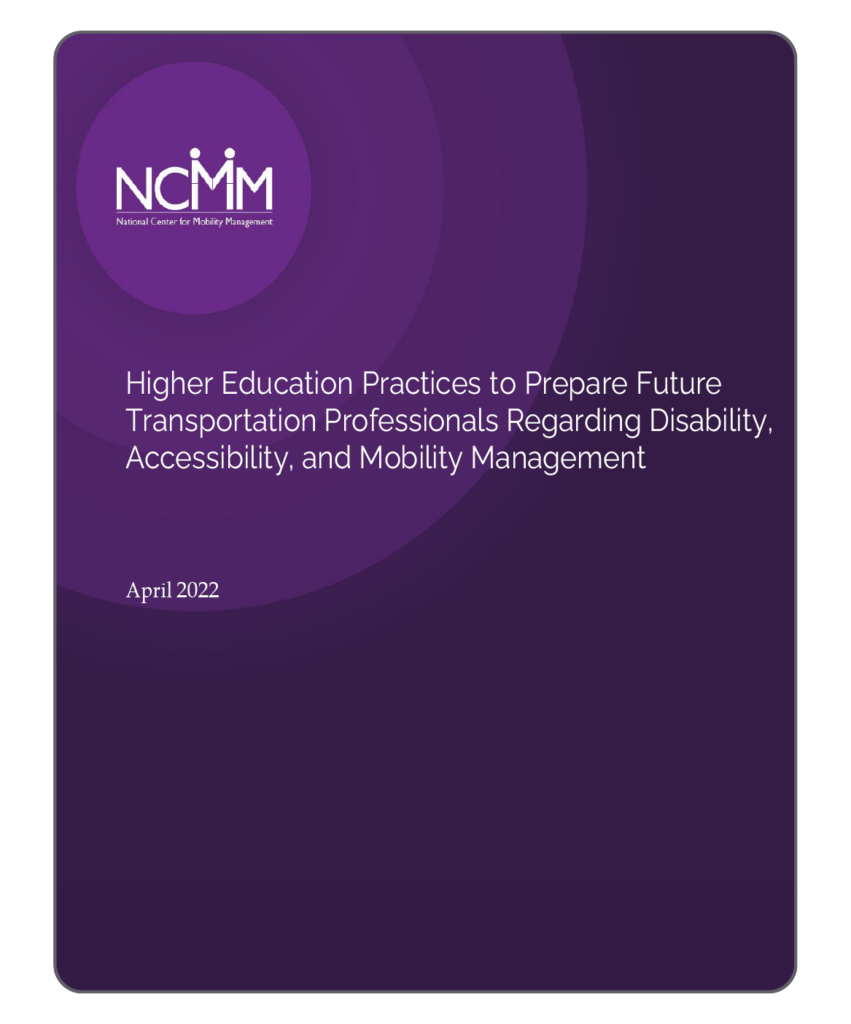
Higher Education Practices to Prepare Future Transportation Professionals Regarding Disability, Accessibility, and Mobility Management
This National Center for Mobility Management (NCMM) Information Brief provides the results of a NCMM study regarding mobility management, disability, and accessibility content in higher education preparation programs. This brief offers recommendations regarding how to integrate such content, as well as information on the recruitment and retention of individuals with disabilities in the transportation industry.
Please click the link below to view NCMM’s Mobility Management in Practice Series; this brief is listed among several 2022 publications.
National Center for Mobility Management (NCMM)
April 2022
TOPICS: Community Engagement , Hiring and Recruitment , Retention , Training
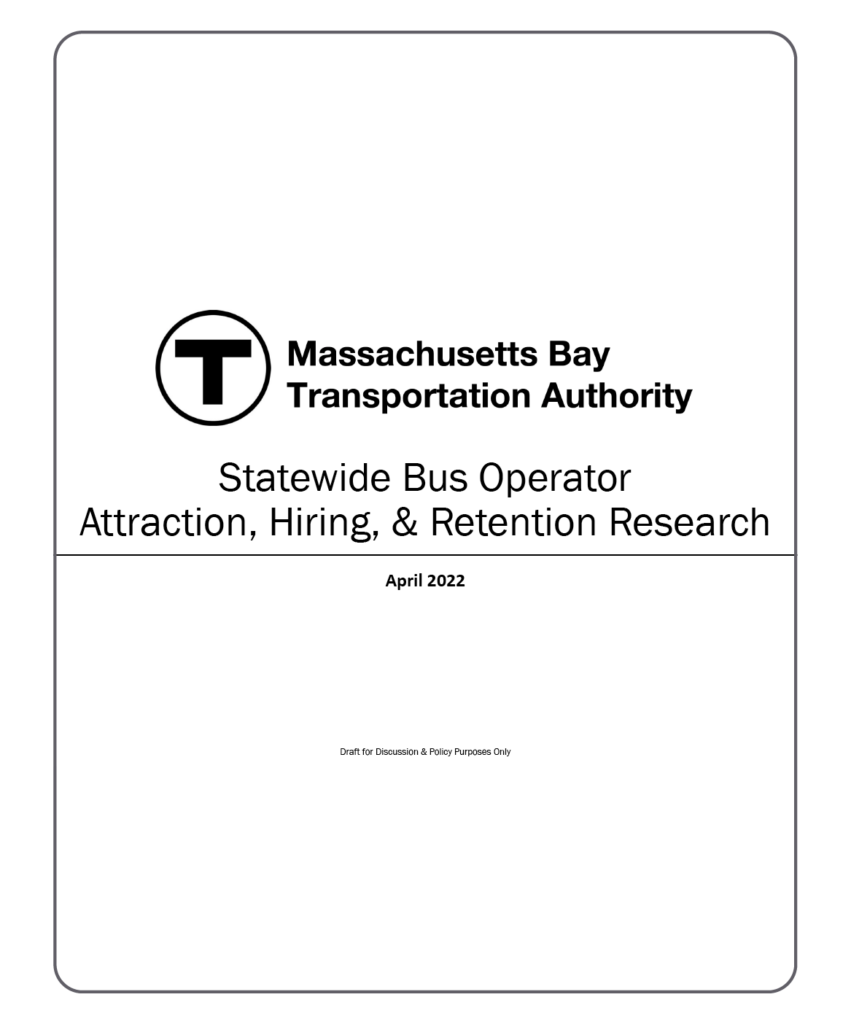
Statewide Bus Operator Attraction, Hiring, & Retention Research
These slides were used in a presentation outlining research conducted to better understand the shape and scale of the bus operator shortage in Massachusetts public transit and the adjustments agencies are making to confront these challenges.
Massachusetts Bay Transportation Authority
April 2022
TOPICS: Hiring and Recruitment , Retention , Workforce Shortage
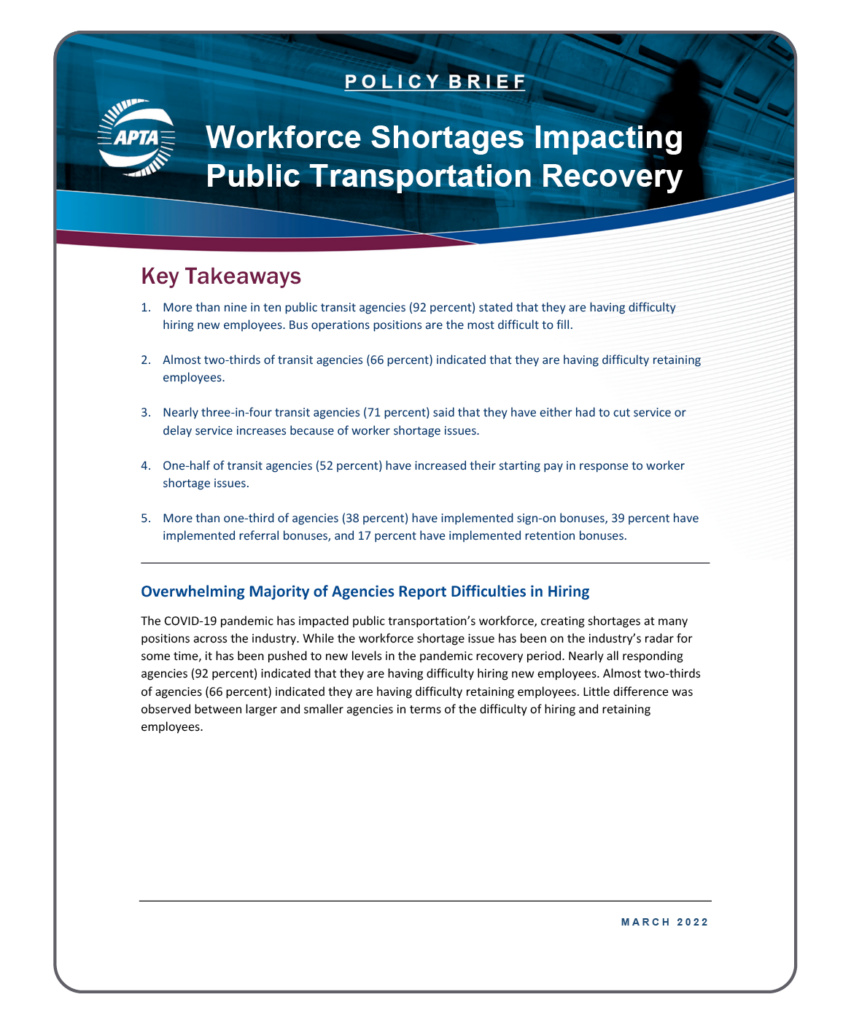
Workforce Shortages Impacting Public Transportation Recovery
This policy brief summarizes results from a survey the American Public Transportation Association (APTA) conducted with transit agencies in early 2022. The majority of responding agencies reported difficulties with hiring, with bus operator recruitment being the biggest challenge.
American Public Transportation Association
March 2022
TOPICS: Hiring and Recruitment , Workforce Shortage
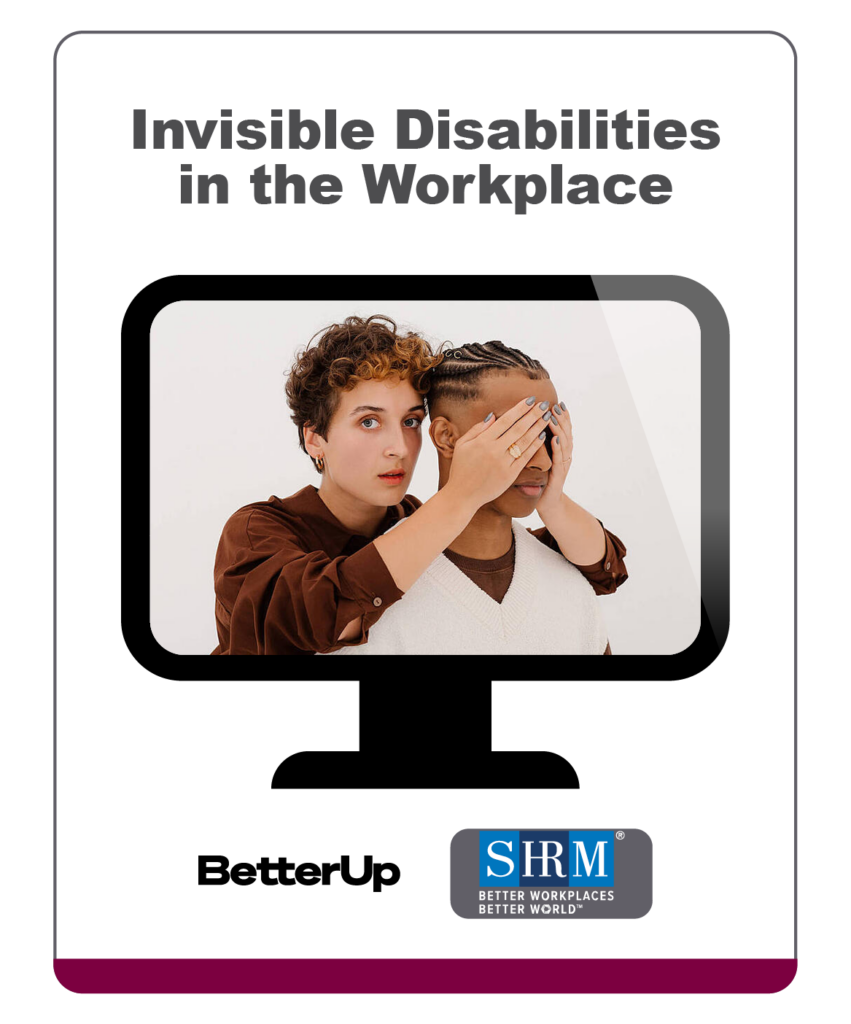
Invisible Disabilities in the Workplace
These two resources provide insight for employers into what “invisible” or “hidden” disabilities are, how to provide opportunities for employees to voluntarily disclose them, and how to support individuals with such disabilities to be successful in the workplace.
BetterUp; SHRM
February 2022
TOPICS: Community Engagement , Hiring and Recruitment , Retention
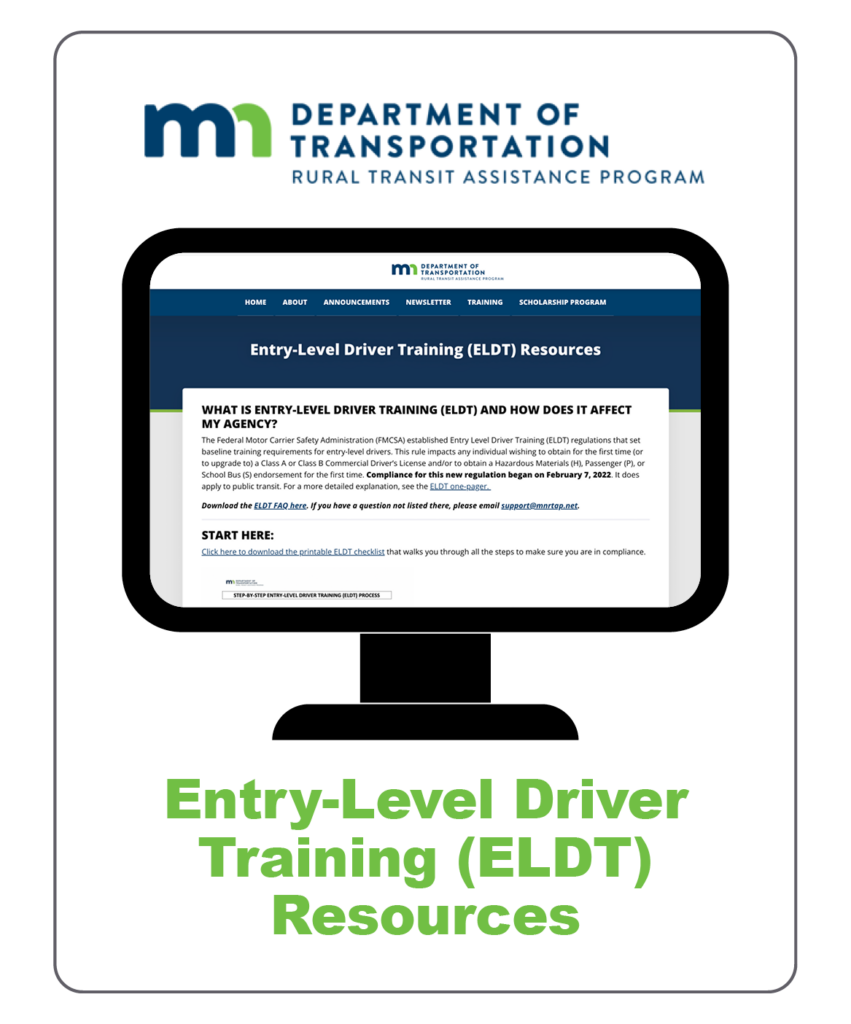
Entry-Level Driver Training (ELDT) Resources
The Federal Motor Carrier Safety Administration (FMCSA) established Entry Level Driver Training (ELDT) regulations that set baseline training requirements for entry-level drivers. This rule impacts any individual wishing to obtain for the first time (or to upgrade to) a Class A or Class B Commercial Driver’s License. These resources from the Minnesota Rural Transit Assistance Program (RTAP) provide information about the regulations, training materials, training providers, checklists, etc. to assist transit agencies in complying with regulations.
Minnesota Rural Transit Assistance Program
February 2022
TOPICS: Career Pathways , Hiring and Recruitment , Training
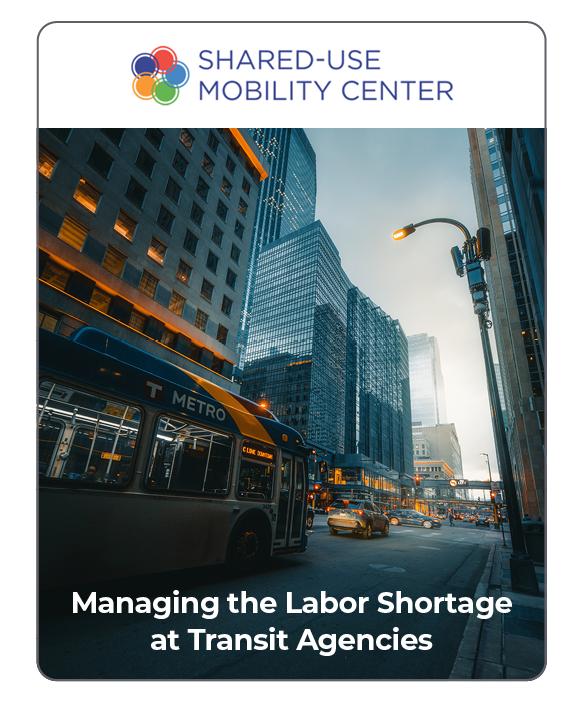
Managing the Labor Shortage at Transit Agencies
This article examines labor shortages in the public transit industry. It focuses on the following points:
- Transit agencies across the United States are experiencing a significant shortage in labor, that the COVID-19 pandemic has worsened. This shortage is negatively impacting the services they provide to the public.
- Employees at transit agencies have a significantly higher median age than employees in other industries.
- Transit agencies should use data and information to consider recruiting and retaining employees for the long term.
Shared-Use Mobility Center
November 2021
TOPICS: Hiring and Recruitment , Retention , Workforce Shortage
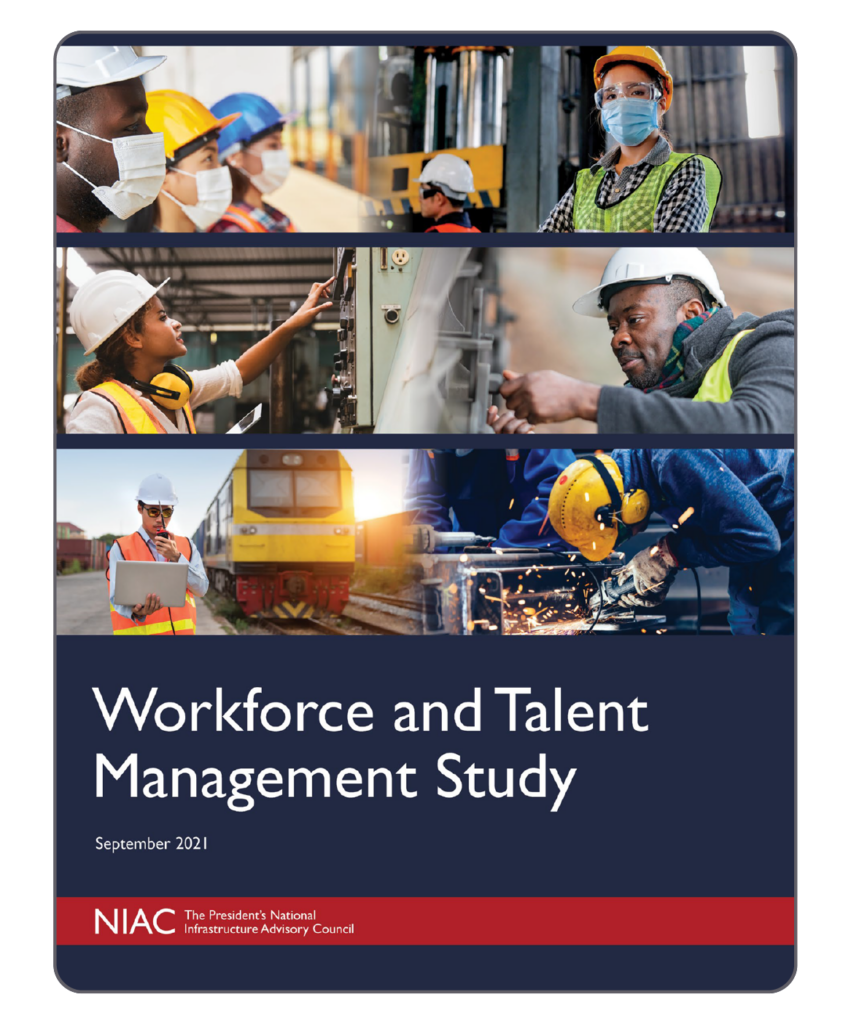
Workforce and Talent Management Study
This study provides an in-depth examination of the U.S workforce development system and offers nine recommendations to inform future policy development and keep the critical infrastructure workforce nimble in the face of change. The recommendations are guided by the principle that all workers must have access to the education, training, and resources necessary to begin and advance in critical infrastructure careers
National Infrastructure Advisory Council
September 2021
The Education/Career Readiness Continuum graphic on page 11 of the report might be useful to agencies considering comprehensive workforce development plans.
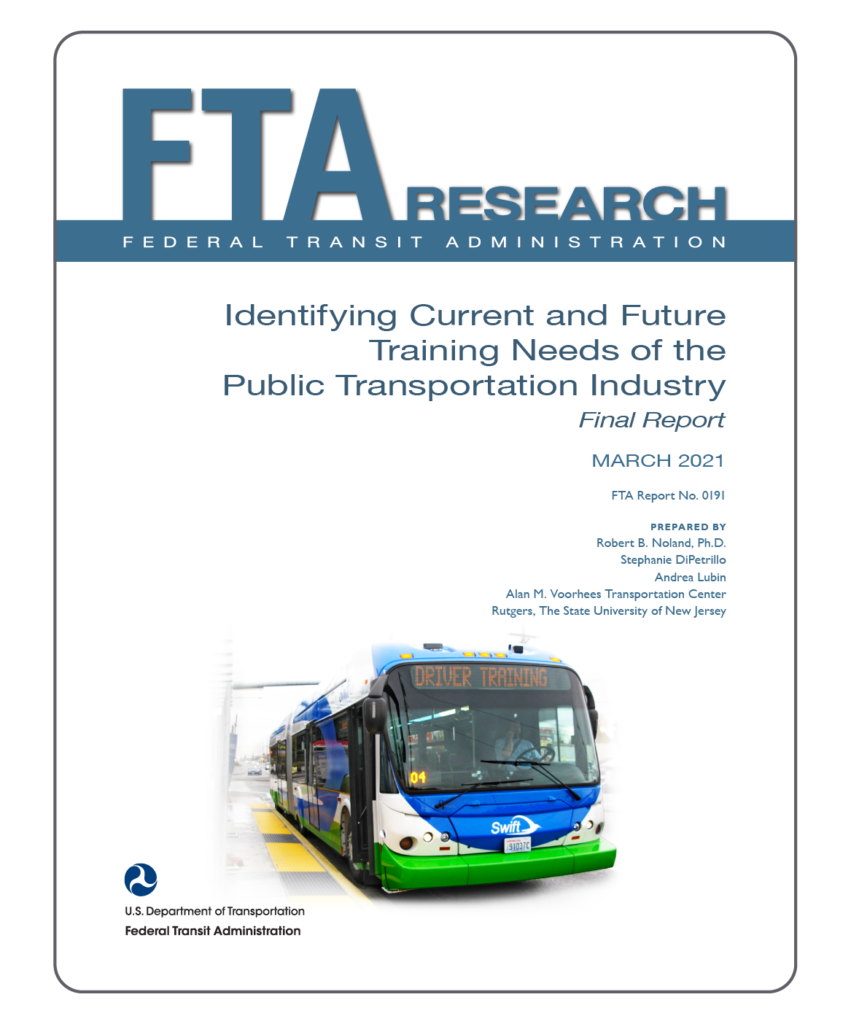
Identifying Current and Future Training Needs of the Public Transportation Industry
This report documents a study commissioned by the National Transit Institute (NTI) as part of its work to address training needs. The study investigates skills gaps among the workforce of the U.S. public transportation industry, identifies strategies to address those gaps, and explores approaches to more successfully recruit and retain the full spectrum of the transit workforce, from frontline to technical to professional staff.
Federal Transit Administration; National Transit Institute
June 2021
TOPICS: Hiring and Recruitment , Policy and Planning , Retention
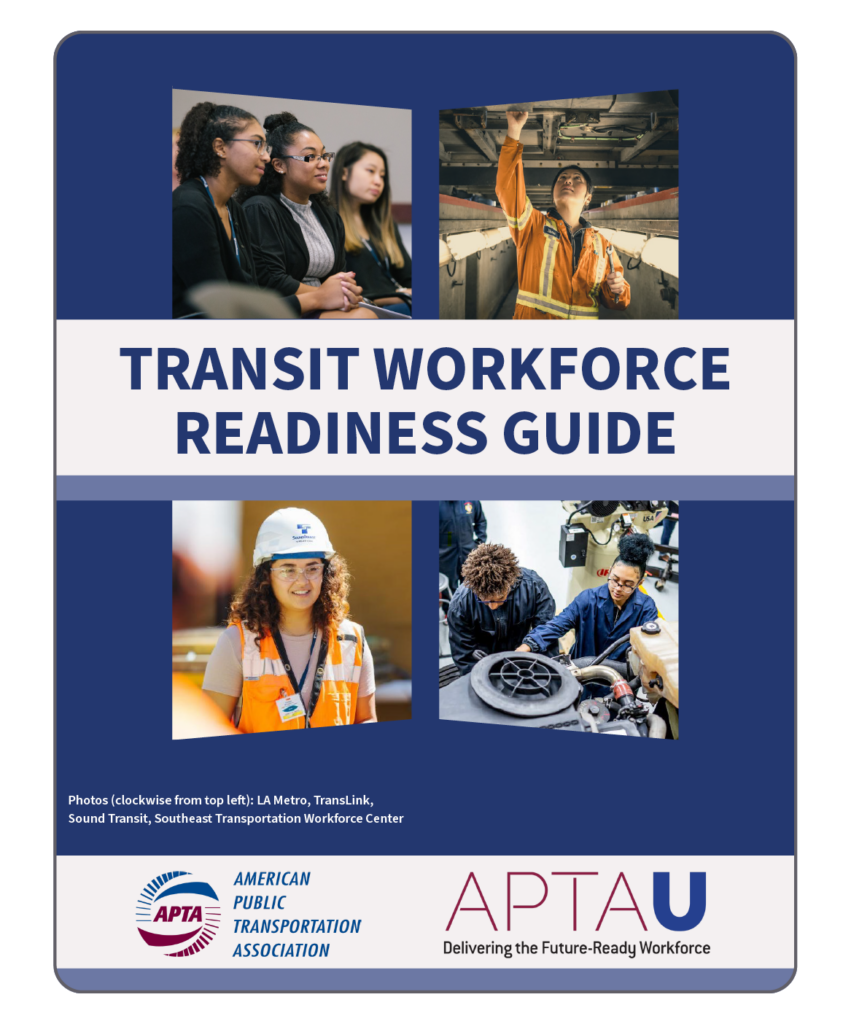
APTA Transit Workforce Readiness Guide
APTA’s Transit Workforce Readiness Guide is a highly interactive and easy-to-use online resource for executives and their staff to assist organizations in building a talent pipeline by attracting high school students into entry-level transit positions.
American Public Transportation Association
March 2021
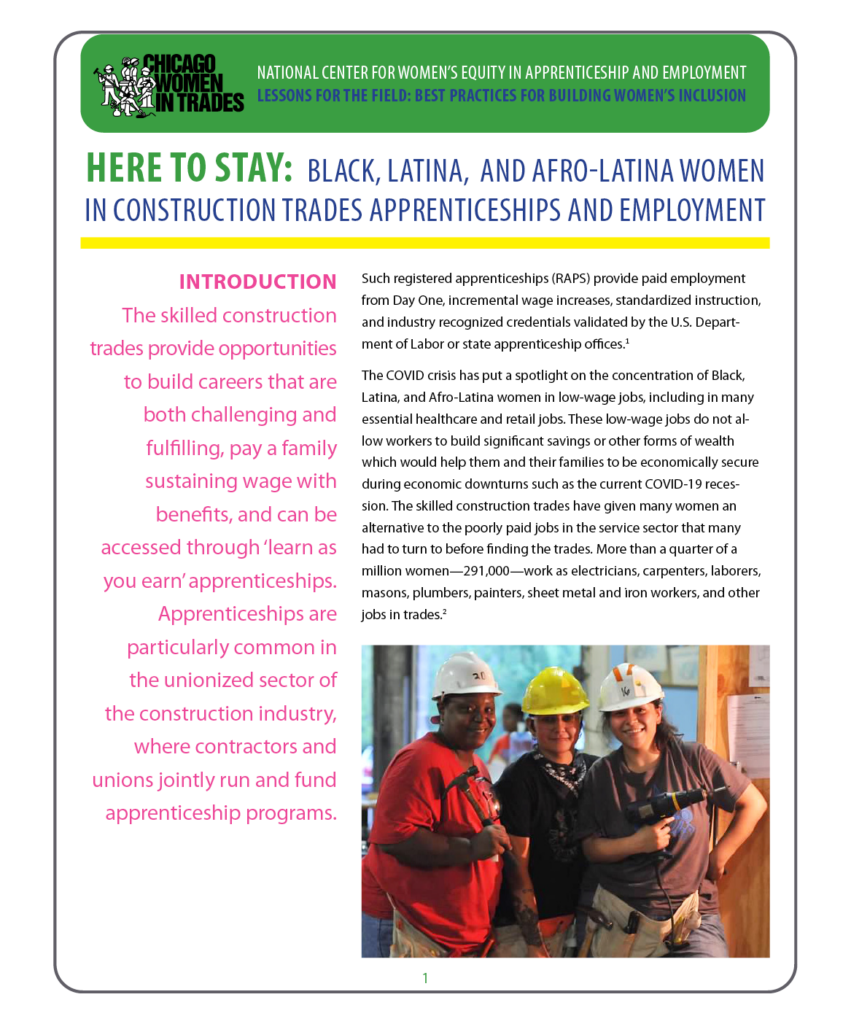
Here to Stay: Black, Latina, and Afro-Latina Women in Construction Trades Apprenticeships and Employment
Chicago Women in the Trades; Institute for Women's Policy Research
March 2021
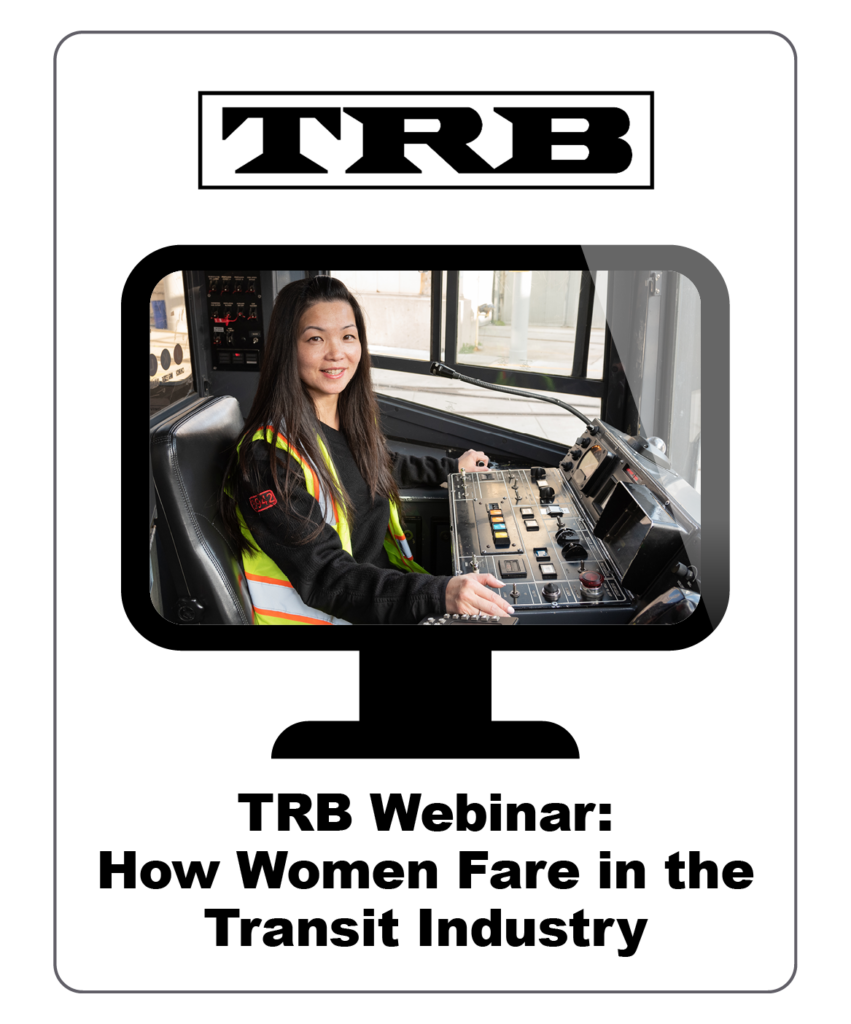
How Women Fare in the Transit Industry
In this TRB webinar, panelists discuss strategies to support women in transit and share examples of transit agencies that have effectively implemented programs to retain and advance women in the industry.
Transportation Research Board
September 2020
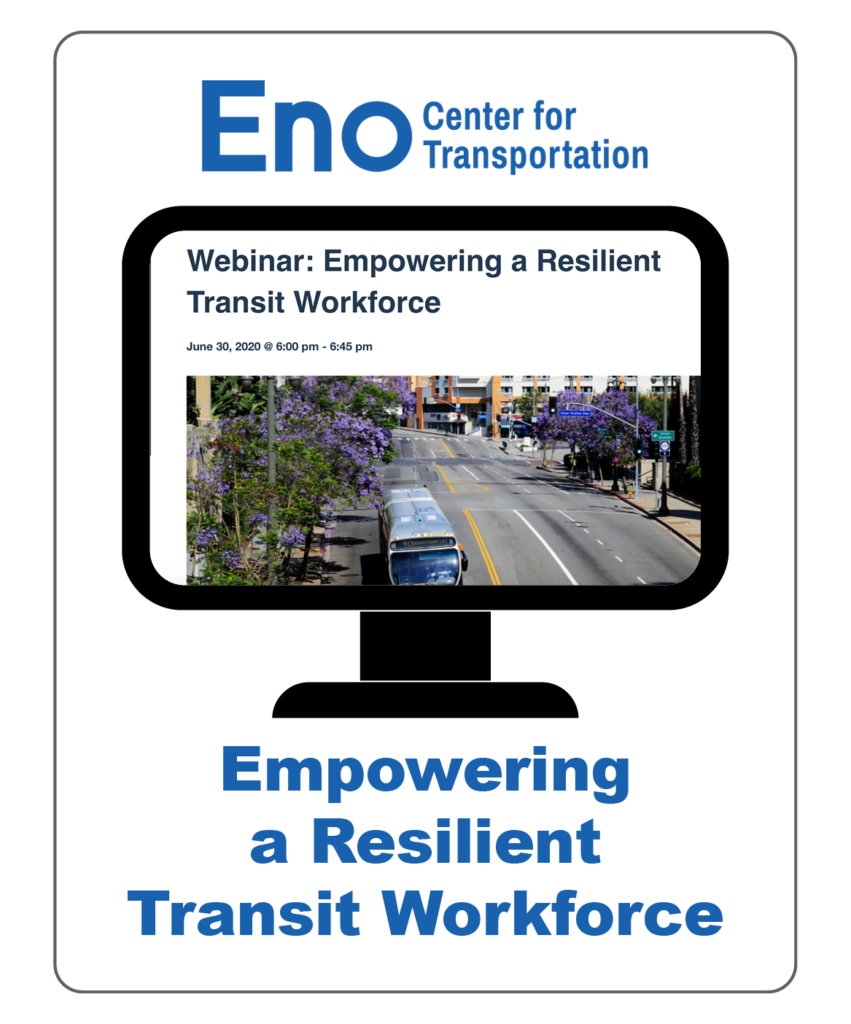
Empowering a Resilient Transit Workforce
This webinar identifies critical labor market benchmarks and addresses ways to cultivate a more resilient and empowered transit workforce, particularly in the post-COVID world. The speakers delve into resiliency challenges and education and training solutions.
Eno Center of Transportation
June 2020
TOPICS: Hiring and Recruitment , Retention , Workforce Shortage
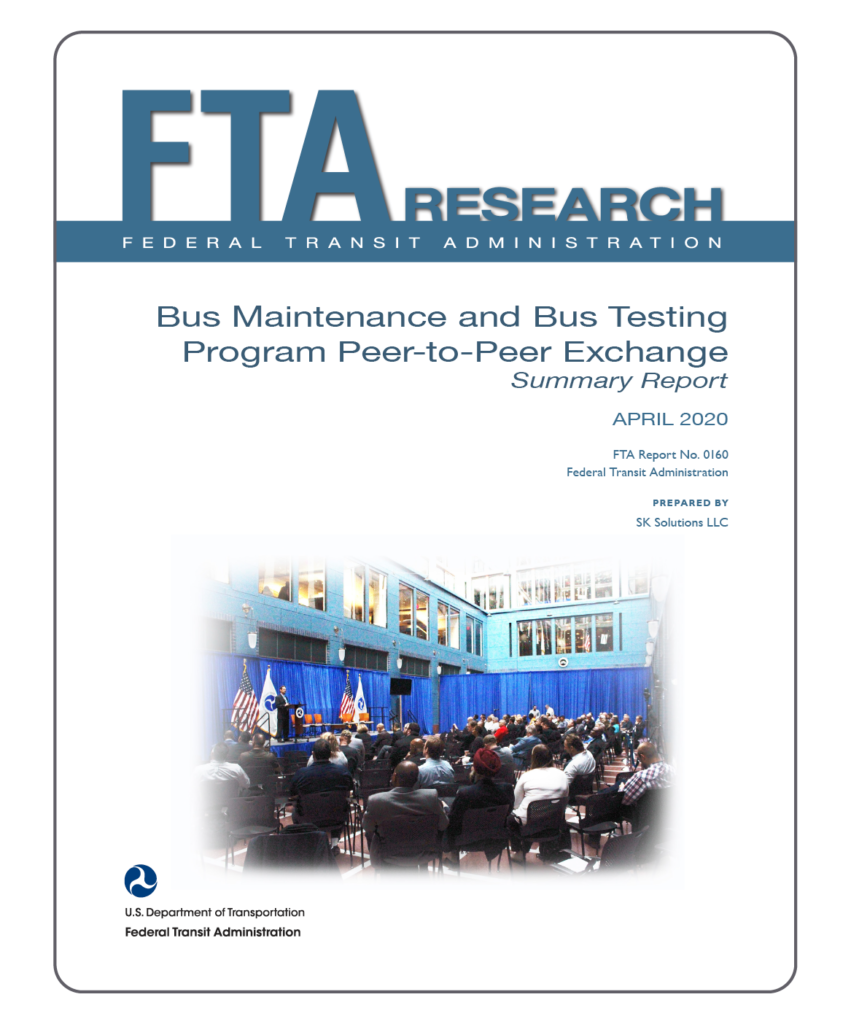
Bus Maintenance and Bus Testing Program Peer-to-Peer Exchange
This report presents a summary of the bus maintenance worker training peer exchange, hosted by the Federal Transit Administration (FTA). Significant shifts in the types of transit buses being procured (e.g., from traditional buses to alternative fuel/low- and no-emission buses) require new and different types of frontline worker training. Through the peer exchange, stakeholders, including industry representatives, shared knowledge about bus maintenance worker training and discussed best practices for developing the next generation of highly-skilled bus technicians.
Federal Transit Administration
May 2020
TOPICS: Hiring and Recruitment , Low-No , Policy and Planning , Procurement , Training
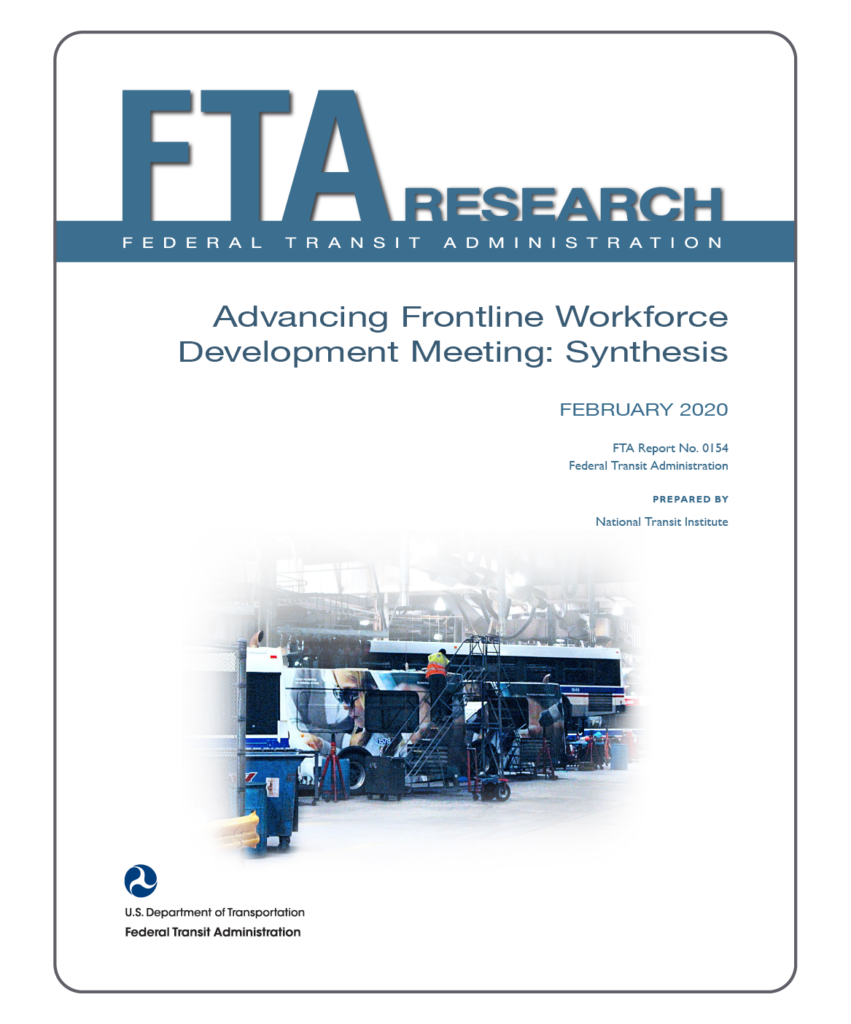
Advancing Frontline Workforce Development Meeting: Synthesis
This report synthesizes findings from a two-day gathering of more than two dozen transit industry labor and management representatives who engaged in in-depth discussions on frontline workforce training needs across the U.S. The purpose of the meeting was to identify immediate, short-term, and long-term training needs for the frontline public transportation workforce in the U.S. and ways to connect apprenticeship and formal training programs to support these needs.
National Transit Institute; Federal Transit Administration; International Transportation Learning Center
February 2020
TOPICS: Apprenticeship , Hiring and Recruitment , Policy and Planning , Training
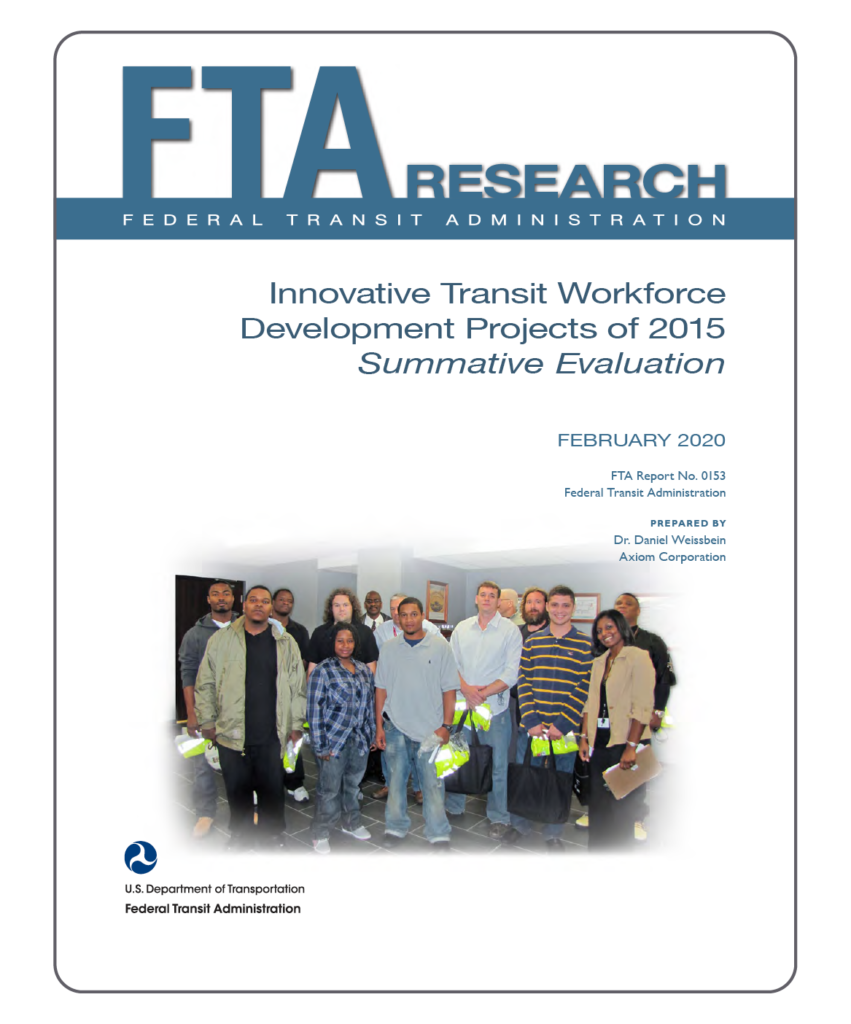
Innovative Transit Workforce Development Projects of 2015: Summative Evaluation
This report provides the results of an evaluation of Innovative Transit Workforce Development Program projects awarded in Fiscal Year 2015. Based on a competitive application process, FTA awarded 16 workforce development projects to transit authorities, higher education institutions, Native American tribes, and nonprofit organizations individually or as a consortium.
Federal Transit Administration
February 2020
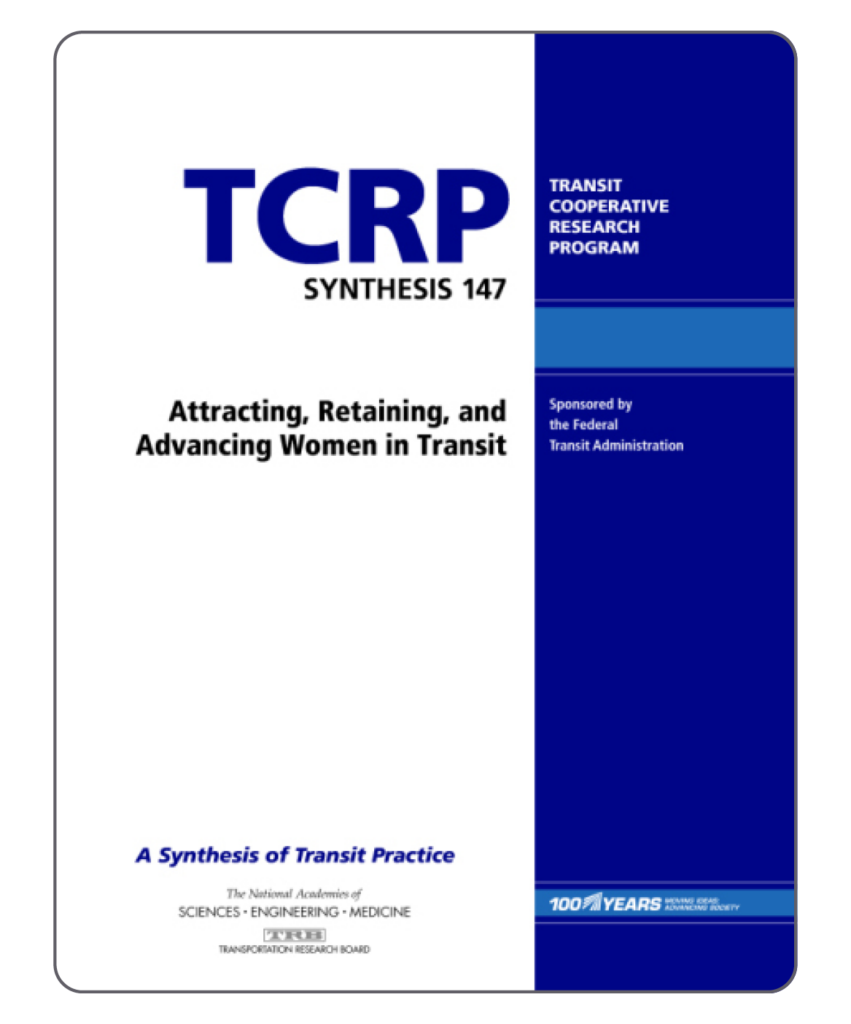
Attracting, Retaining, and Advancing Women in Transit
This TCRP report explores the strategies that have been deployed in transit and other related industries in order to attract, retain, and advance women in a variety of roles. It includes a survey and case studies from several major transit agencies.
Transit Cooperative Research Program
January 2020
TOPICS: Community Engagement , Hiring and Recruitment , Retention
Contributor(s): National Academies of Sciences, Engineering, and Medicine; Transportation Research Board; Transit Cooperative Research Program; ICF Allison Alexander
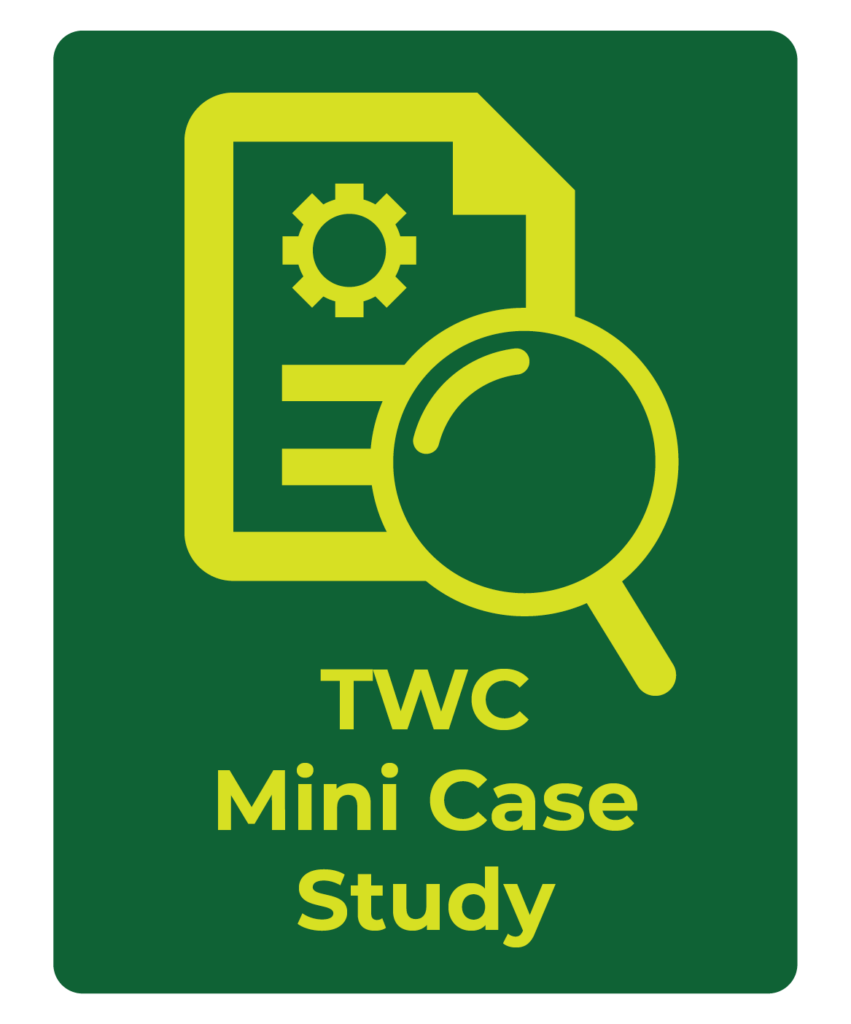
Emerging Leaders Presentation: Recruiting & Retaining Bus Operators
This slidedeck, from the APTA Emerging Leaders Program class of 2019 presentations, provides an overview of research and transit agency case studies to capture key themes on the topics of bus operator recruitment and retention.
American Public Transportation Association
December 2019
TOPICS: Career Pathways , Community Engagement , Hiring and Recruitment , Retention
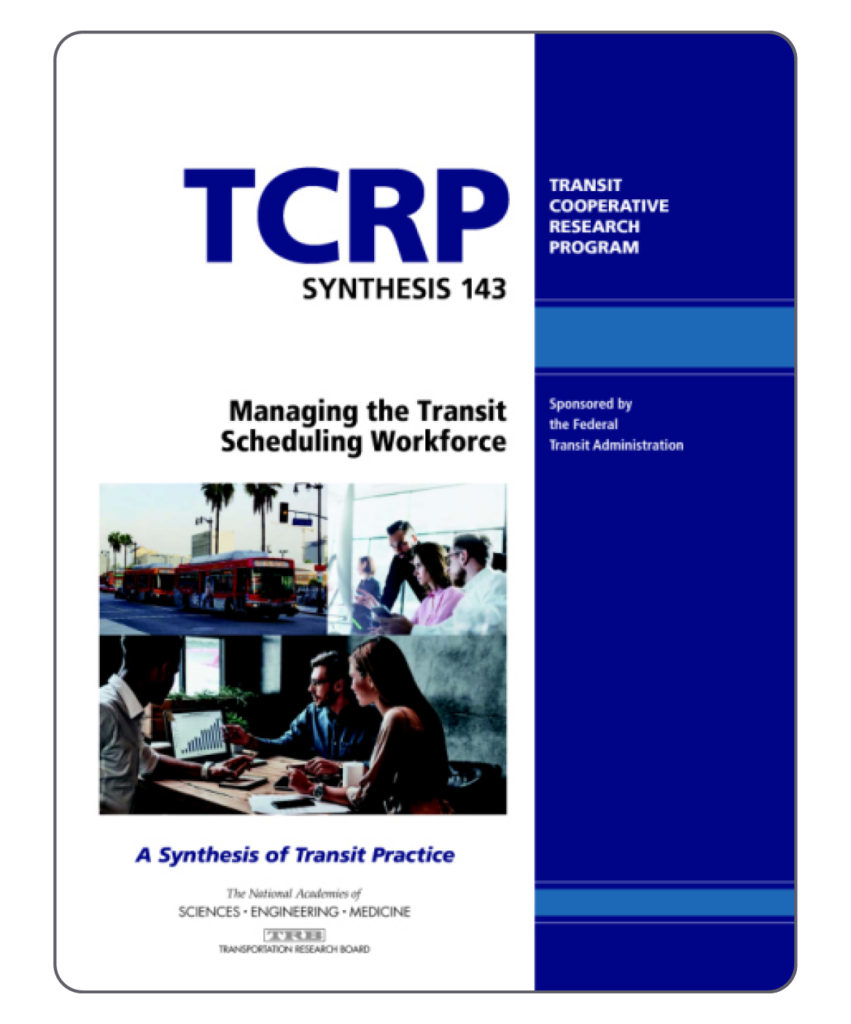
Managing the Transit Scheduling Workforce
Transit Cooperative Research Program
TOPICS: Career Pathways , Hiring and Recruitment , Training
This report is designed to assist transit agencies in managing their transit scheduling human capital. The report presents an overview of the practices and procedures transit agencies use to manage their scheduling workforce and will allow agencies to compare what they are currently doing with what others are doing in this area. The report also analyzes how transit systems are evolving their practices to adapt to industry and technological changes. It provides transit systems with new ideas and strategies to retain good schedulers.
Contributor(s): National Academies of Sciences, Engineering, and Medicine; Transportation Research Board; Transit Cooperative Research Program; Transit Cooperative Research Program Synthesis Program; Michael J. Walk; James P. Cardenas; Kristi Miller; Jessica Alvarez; Sandy Davis; Peter Hadley
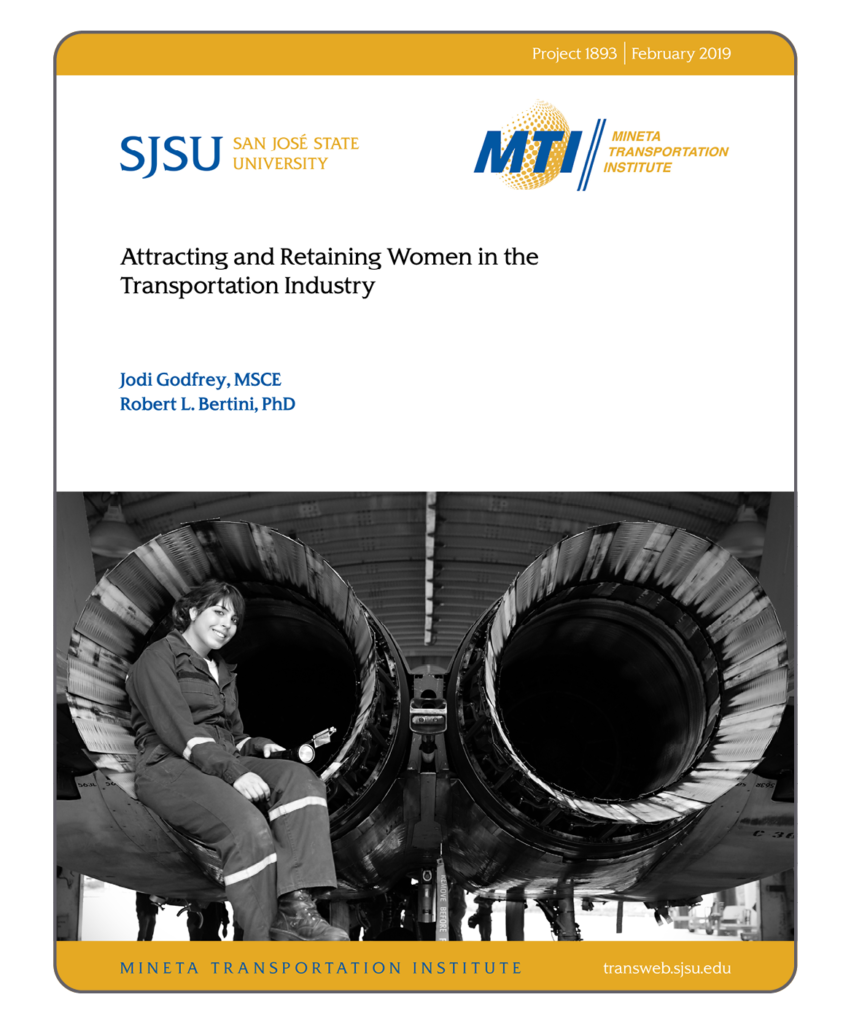
Attracting and Retaining Women in the Transportation Industry
This study synthesizes previously conducted research and identifies additional research needed to attract, promote, and retain women in the transportation industry, particularly emphasizing the importance of community-orientation and mentoring.
Mineta Transportation Institute
February 2019
TOPICS: Community Engagement , Hiring and Recruitment , Mentorship , Retention
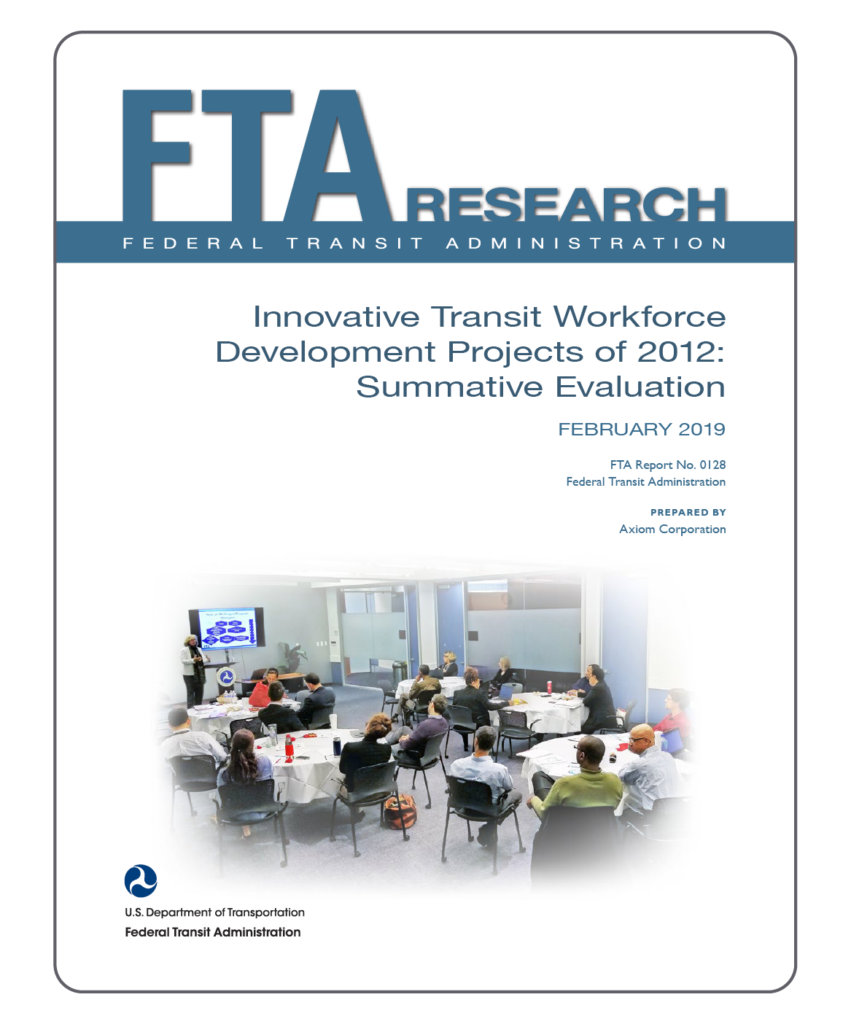
Innovative Transit Workforce Development Projects of 2012: Summative Evaluation
This report provides the results of the Innovative Transit Workforce Development Program Evaluation of projects awarded in Fiscal Year 2012. FTA awarded a total of $7,048,898 for 16 workforce development projects. Recipients included transit authorities, higher education institutions, Native American tribes, and nonprofit organizations.
Federal Transit Administration
February 2019
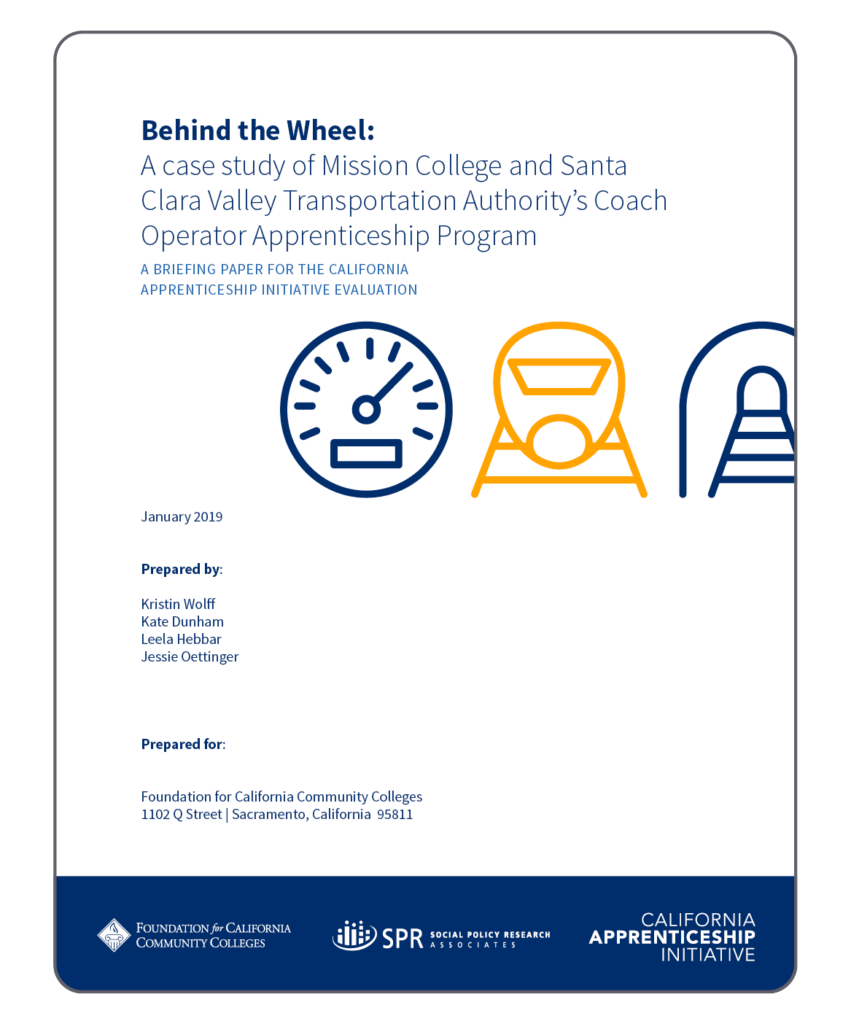
Behind the Wheel
This report, Behind the Wheel: A case study of Mission College and Santa Clara Valley Transportation Authority’s Coach Operator Apprenticeship Program, is part of the Social Policy Research Associates’ evaluation of the California Apprenticeship Initiative. The case study describes the development of the Coach Operator and Transportation Apprenticeship, including why the partners chose an apprenticeship model to meet their training needs, how the program was developed and structured, and what apprentices and employers report about their experiences in the program.
Foundation for California Community Colleges; Social Policy Research Associates
January 2019
TOPICS: Apprenticeship , Career Pathways , Hiring and Recruitment , Training
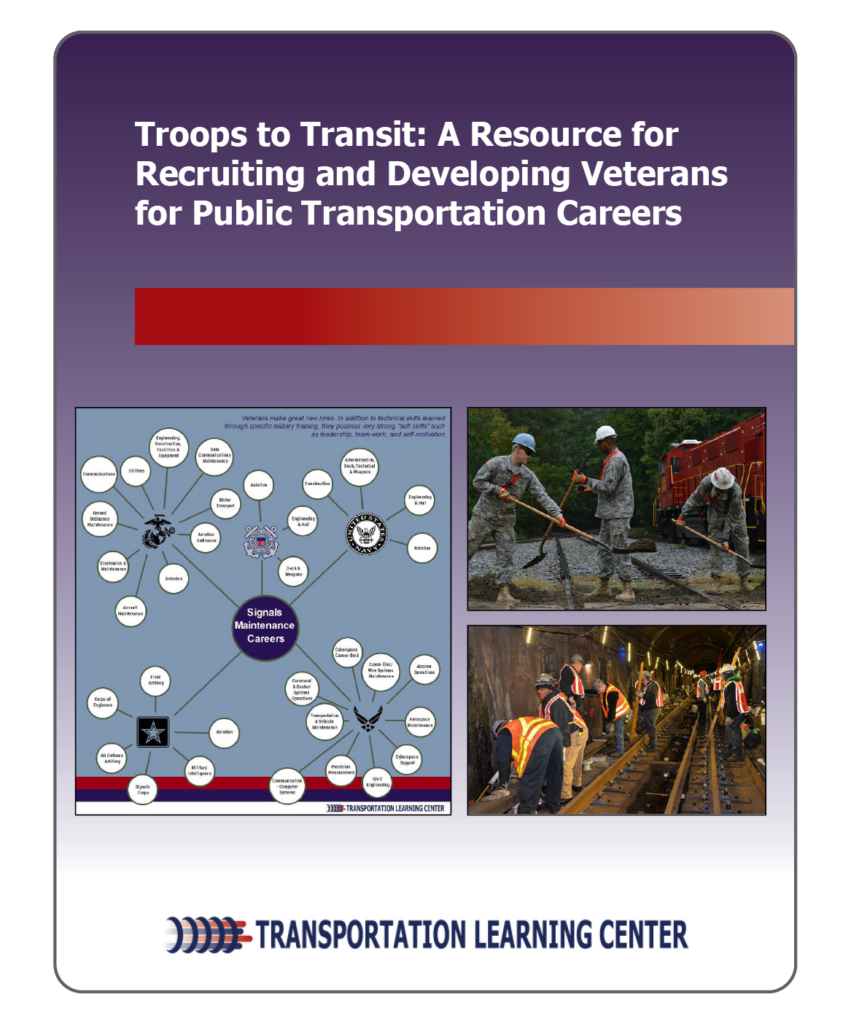
Troops to Transit: A Resource for Recruiting and Developing Veterans for Public Transportation Careers
The International Transportation Learning Center’s analysis of Bureau of Labor Statistics data has shown that the transportation industry in large will likely see a massive front-line labor shortage in the next ten years unless it is able to find and hire skilled workers. In fact, it is estimated that 126 percent of today’s transit workforce will have to be hired and trained in the next ten years.
In order to help fill this need, the center has produced a Veterans Crosswalk tool (see Excel document below) which matches skill-sets learned during military service with the kinds of skills that public transportation agencies look for when hiring signals maintainers. This product was produced in cooperation with a Veterans Taskforce made up of veterans who are also Subject Matter Experts in the field of Signals Maintenance. This detailed matrix has been distilled down into a user-friendly Veteran’s Factsheet (see PDF below) which provides at-a-glance information for both veterans interested in a signals career and for agencies looking to hire skilled veterans.
The tool is accompanied by a summary report.
International Transportation Learning Center
November 2016
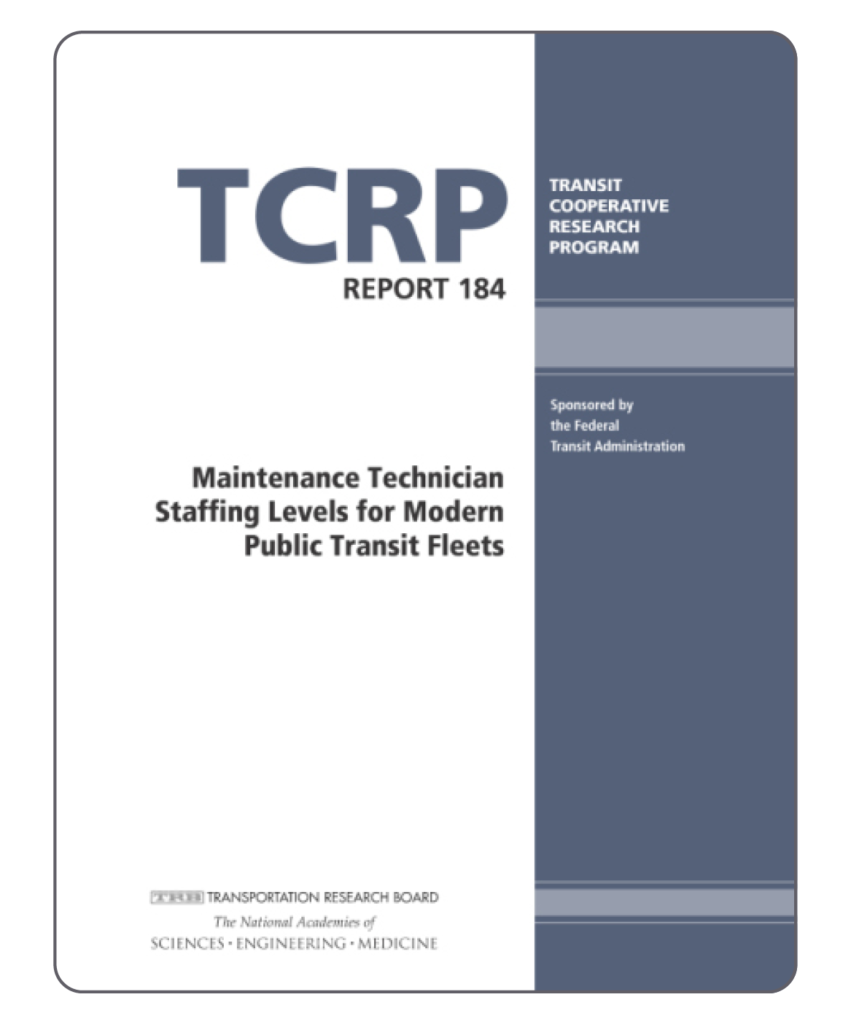
Maintenance Technician Staffing Levels for Modern Public Transit Fleets
This report identifies existing tools and practices used to determine optimum maintenance technician staffing levels and provides an analysis of variables that influence maintenance technician staffing needs. A Microsoft Excel maintenance staffing calculator and user guide is available.
Transit Cooperative Research Program
August 2016
Contributor(s): National Academies of Sciences, Engineering, and Medicine; Transportation Research Board; Transit Cooperative Research Program; Ken Mall; June Sekera; the Transportation Learning Center and Transit Resource Center
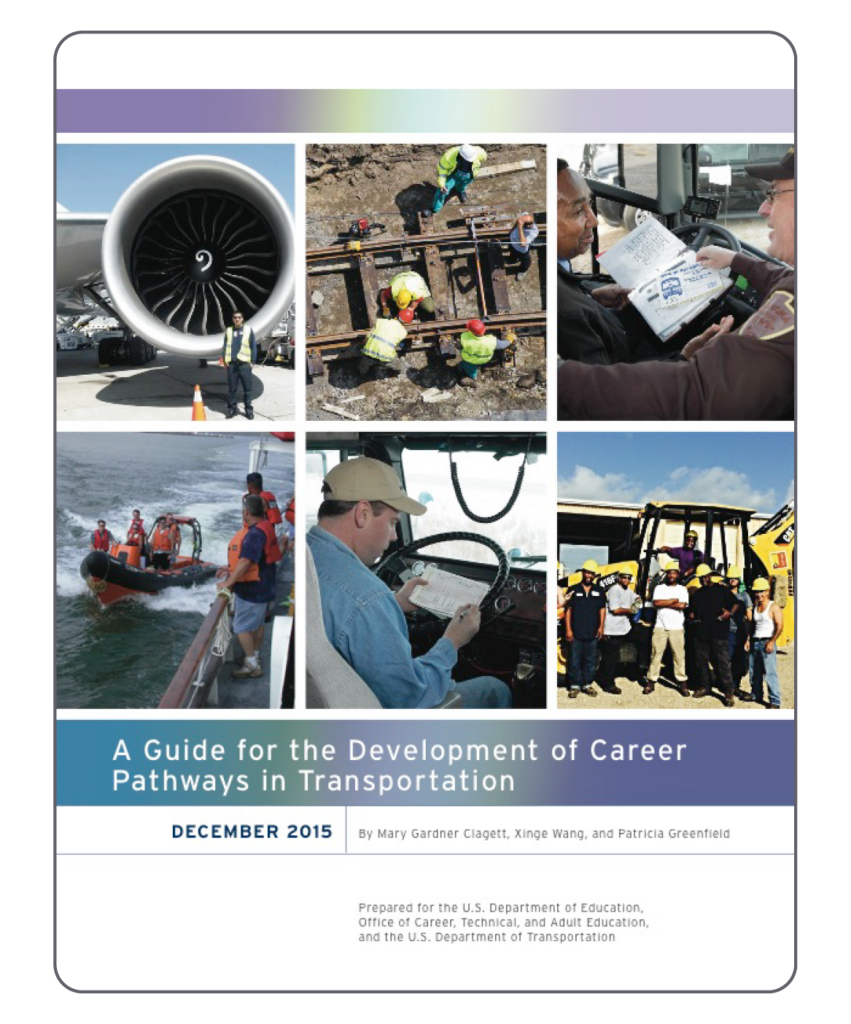
A Guide for the Development of Career Pathways in Transportation
This guide outlines the steps that transportation industry stakeholders can take to develop or expand Career Pathways to focus on the skills, competencies, and credentials needed for high-demand jobs in the transportation industry and its subsectors.
U.S. Department of Education; Jobs for the Future; International Transportation Learning Center
December 2015
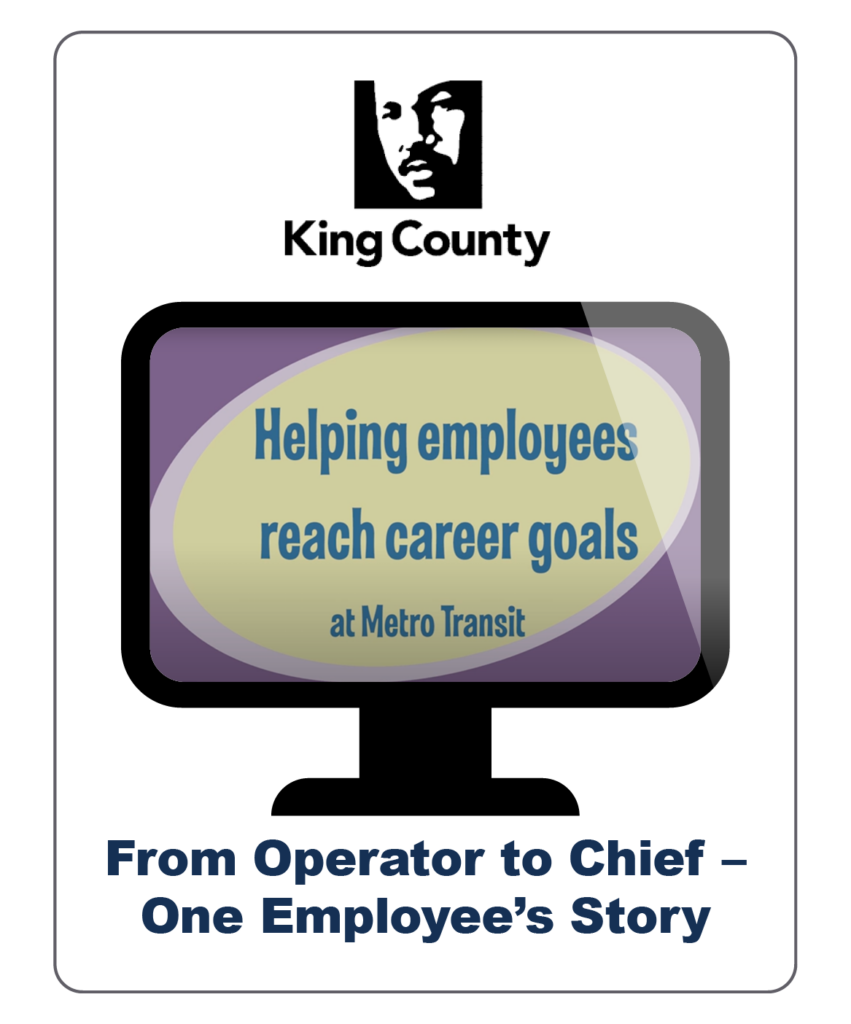
From Operator to Chief – One Employee’s Story
This video provides a description of King County DOT’s program for recruitment and advancement options for current employees, along with one employees’ story about how he was supported in his journey from bus operator to Base Chief.
King County Department of Transportation
October 2015
TOPICS: Career Pathways , Community Engagement , Hiring and Recruitment , Retention , Training
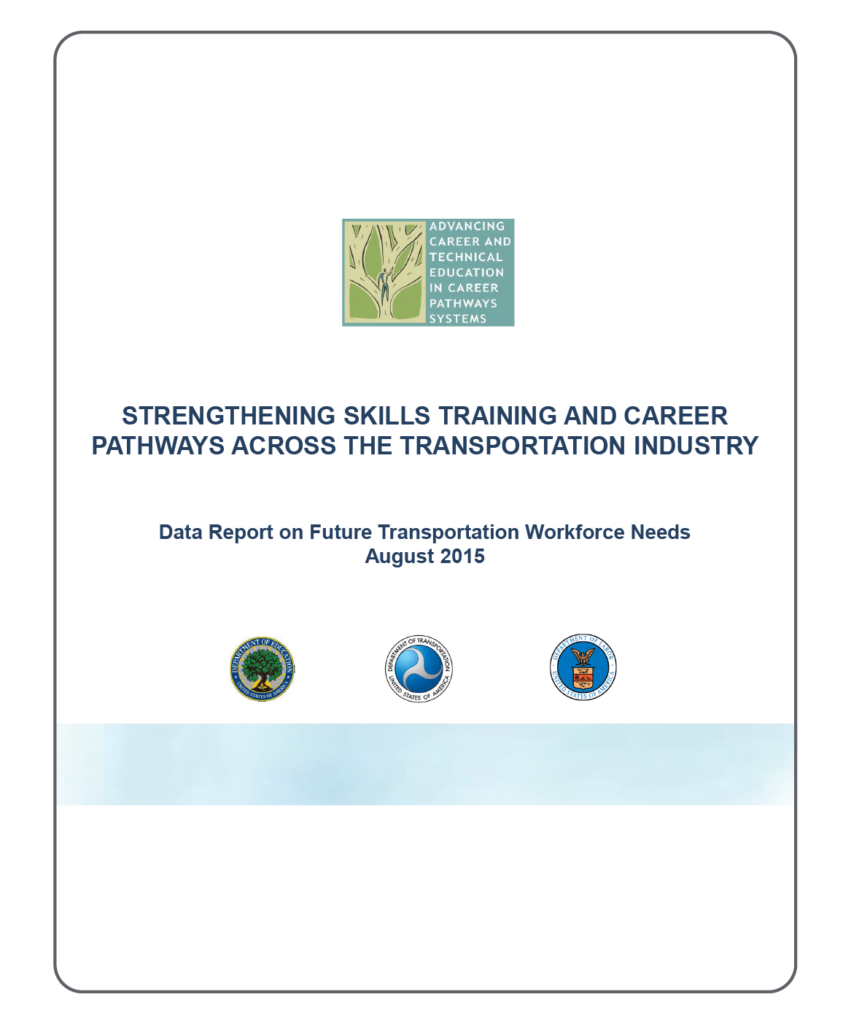
Strengthening Skills Training and Career Pathways Across the Transportation Industry
This report identifies high-demand jobs with good wages in transportation, discusses the role data plays in identifying future workforce skill needs, and analyzes the patterns in the education and work experience required for entry, as well as on-the-job training required for new entrants to gain full competency.
U.S. Department of Education, Office of Career, Technical, and Adult Education; U.S. Department of Transportation; U.S. Department of Labor
August 2015
TOPICS: Apprenticeship , Career Pathways , Hiring and Recruitment , Training
The Office of Career, Technical, and Adult Education (OCTAE) and the Department of Transportation acknowledge the important contributions to this report made by the following people: Xinge Wang, Deputy Director, and Jack Clark, Executive Director, Transportation Learning Center; and Mary Clagett, Director for Workforce Policy, Lois Joy, Senior Program Manager, and Dudney Sylla, Program Manager, Jobs for the Future, for their analysis and writing.
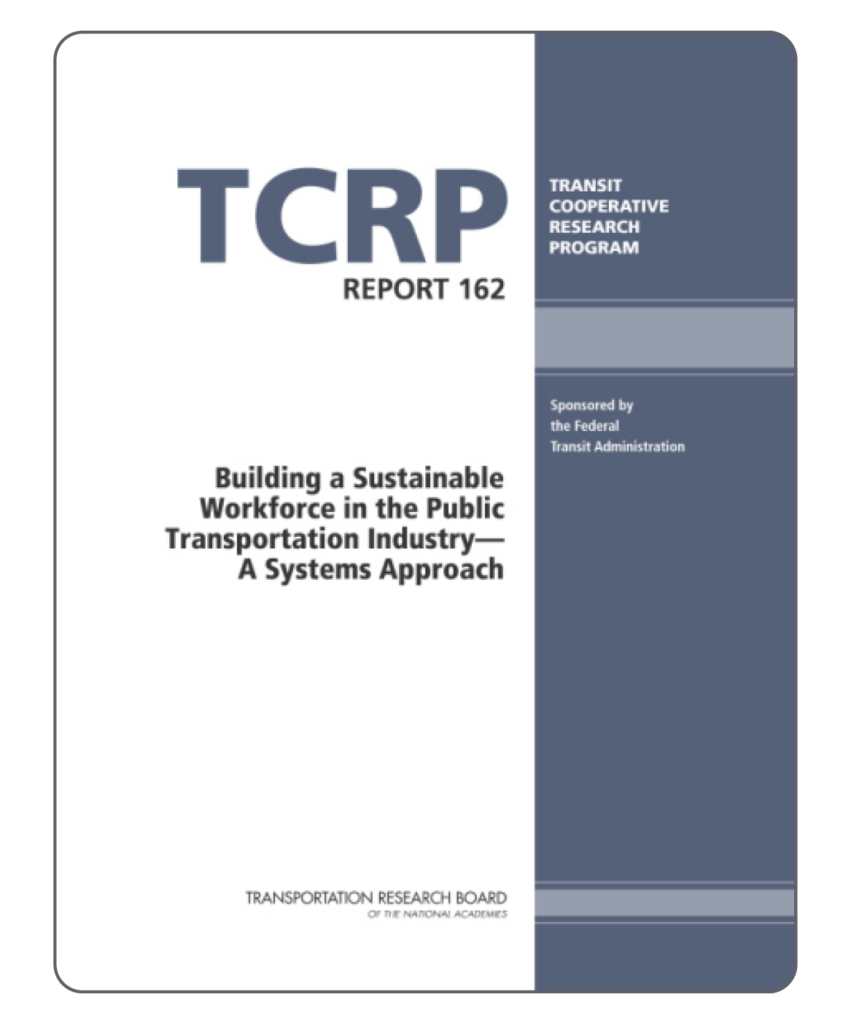
Building a Sustainable Workforce in the Public Transportation Industry—A Systems Approach
TRB’s Transit Cooperative Research Program (TCRP) Report 162: Building a Sustainable Workforce in the Public Transportation Industry—A Systems Approach provides a guidebook that addresses contemporary issues in workforce development, retention, and attraction, and public transportation image management.
The guidebook provides practical tools to transit agencies on a variety of workforce issues including workforce strategies that enhance organizational processes, performance metrics to evaluate the impact of workforce strategies, image management techniques that improve perceptions of the public transportation industry, and benchmarking processes that allow for continuous organizational improvement.
The guidebook is separated into modules that may be used independently or together in the form of the fully integrated guidebook.
Transit Cooperative Research Program (TCRP)
January 2013
TOPICS: Hiring and Recruitment , Policy and Planning , Retention , Training
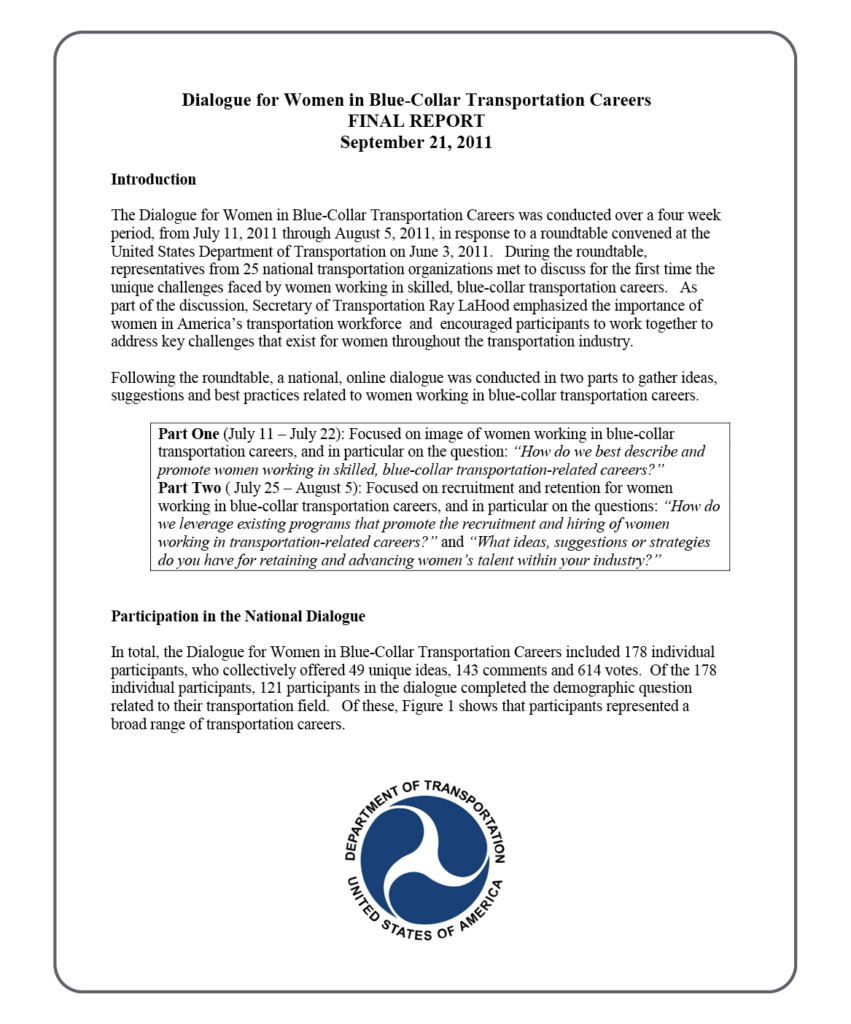
Dialogue for Women in Blue-Collar Transportation Careers
This short summary report describes unique challenges and recommendations regarding women in blue-collar positions in transportation.
US Department of Transportation
September 2011
TOPICS: Community Engagement , Hiring and Recruitment , Retention
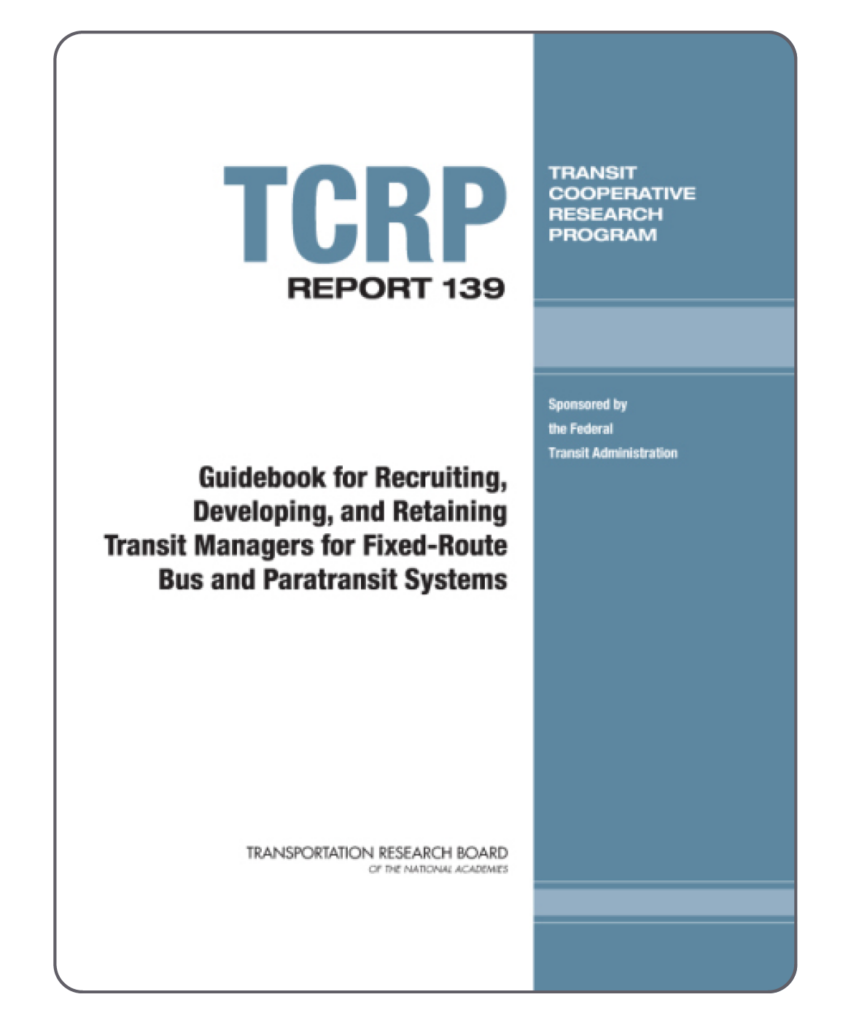
Guidebook for Recruiting, Developing, and Retaining Transit Managers for Fixed-Route Bus and Paratransit Systems
TRB’s Transit Cooperative Research Program (TCRP) Report 139: Guidebook for Recruiting, Developing, and Retaining Transit Managers for Fixed-Route Bus and Paratransit Systems explores resources for fixed-route bus, general public demand response, and Americans with Disabilities Act (ADA) paratransit systems resources to assist in the recruitment, development, and retention of managers.
Transit Cooperative Research Program
March 2010
TOPICS: Hiring and Recruitment , Policy and Planning , Retention , Workforce Shortage
Contributor(s): National Academies of Sciences, Engineering, and Medicine; Transportation Research Board; Transit Cooperative Research Program
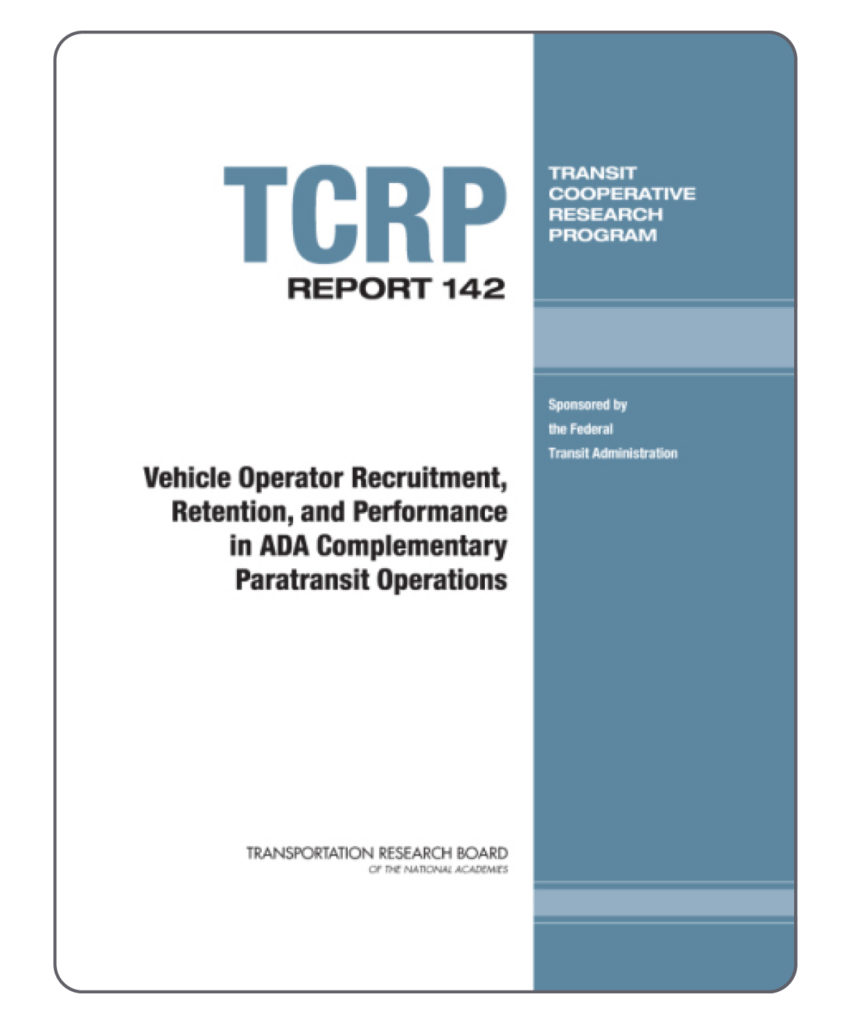
Vehicle Operator Recruitment, Retention, and Performance in ADA Complementary Paratransit Operations
TRB’s Transit Cooperative Research Program (TCRP) Report 142: Vehicle Operator Recruitment, Retention, and Performance in ADA Complementary Paratransit Operations provides guidance for understanding the relationships that influence and enhance operator recruitment, retention, and performance in Americans with Disabilities Act (ADA) complementary paratransit services.
Transit Cooperative Research Program (TCRP)
TOPICS: Hiring and Recruitment , Retention , Training
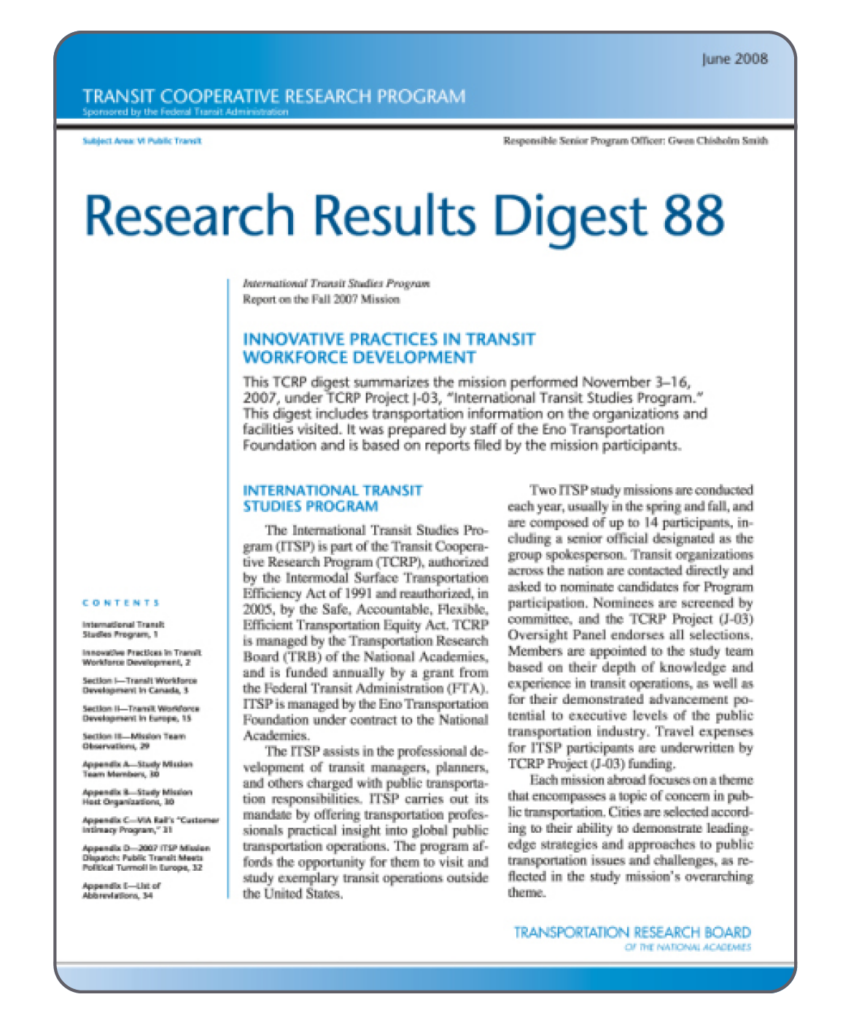
Innovative Practices in Transit Workforce Development
TRB’s Transit Cooperative Research Program (TCRP) Research Results Digest 88: Innovative Practices in Transit Workforce Development examines innovative practices in workforce development in several cities in Canada, France, and Belgium.
Transit Cooperative Research Program (TCRP)
June 2008
TOPICS: Hiring and Recruitment , Policy and Planning , Training
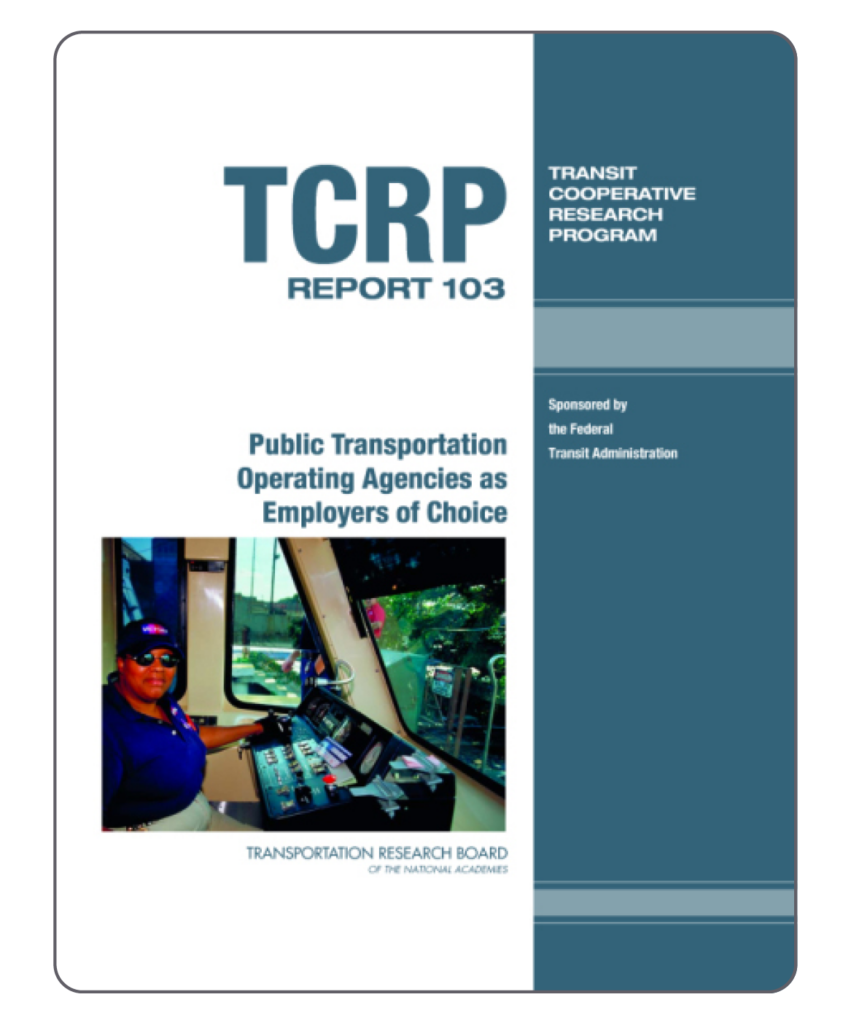
Public Transportation Operating Agencies as Employers of Choice
TRB’s Transit Cooperative Research Program (TCRP) Report 103 documents principles, techniques, and strategies that are used in workforce recruitment, development, and retention. The report includes a companion document, “Communications Strategy and Implementation Plan, Positioning the Public Transportation Operating Agency as an Employer of Choice” that describes strategies and solutions that offer the greatest potential for positioning public transportation operating agencies as an employer of choice.
Contributors: Watson Wyatt Worldwide and Focus Group Corporation
Transit Cooperative Research Program
January 2004
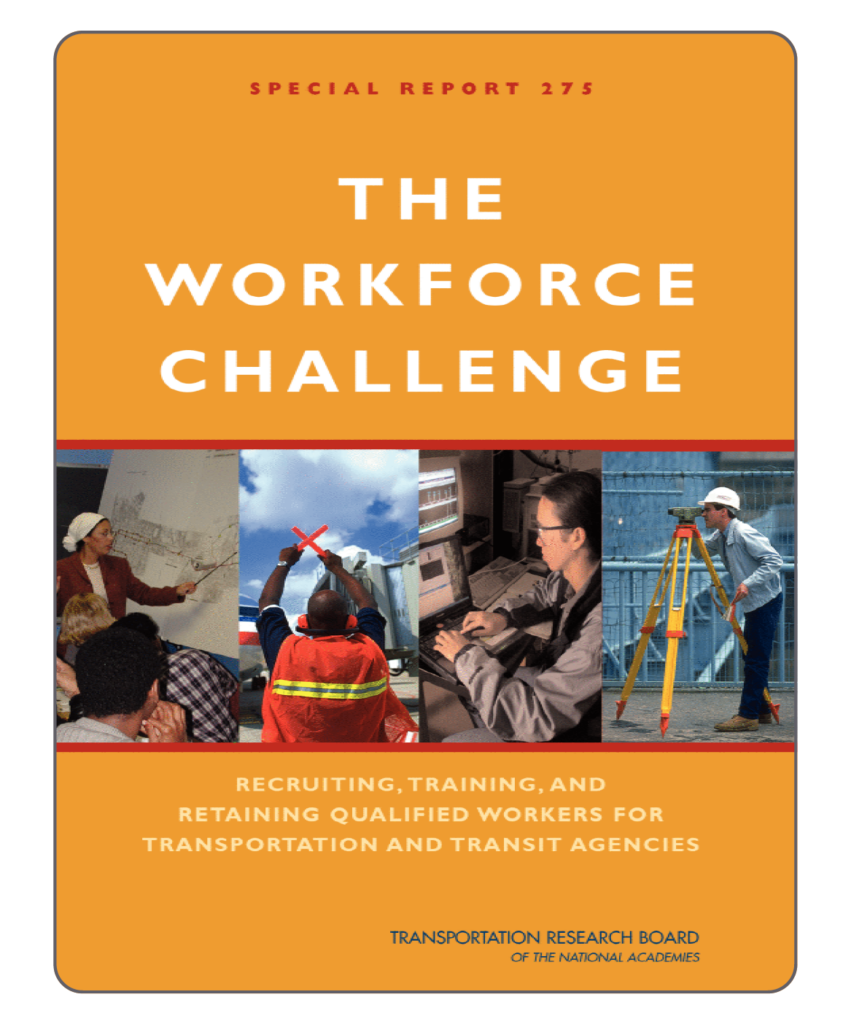
The Workforce Challenge
This report compiles research about the issues facing the transportation workforce, including changing skills, an aging workforce, and low prioritization of training. The report recommends working to expand existing federal and academic resources, create an institutional focus for the issue, and establish human resources management as a strategic function within the transportation community.
Transportation Research Board
January 2003
TOPICS: Hiring and Recruitment , Policy and Planning , Procurement , Retention , Training
Contributor(s): National Academies of Sciences, Engineering, and Medicine; Transportation Research Board; Committee on Future Surface Transportation Agency Human Resource Needs: Strategies for Recruiting, Training, and Retaining Personnel
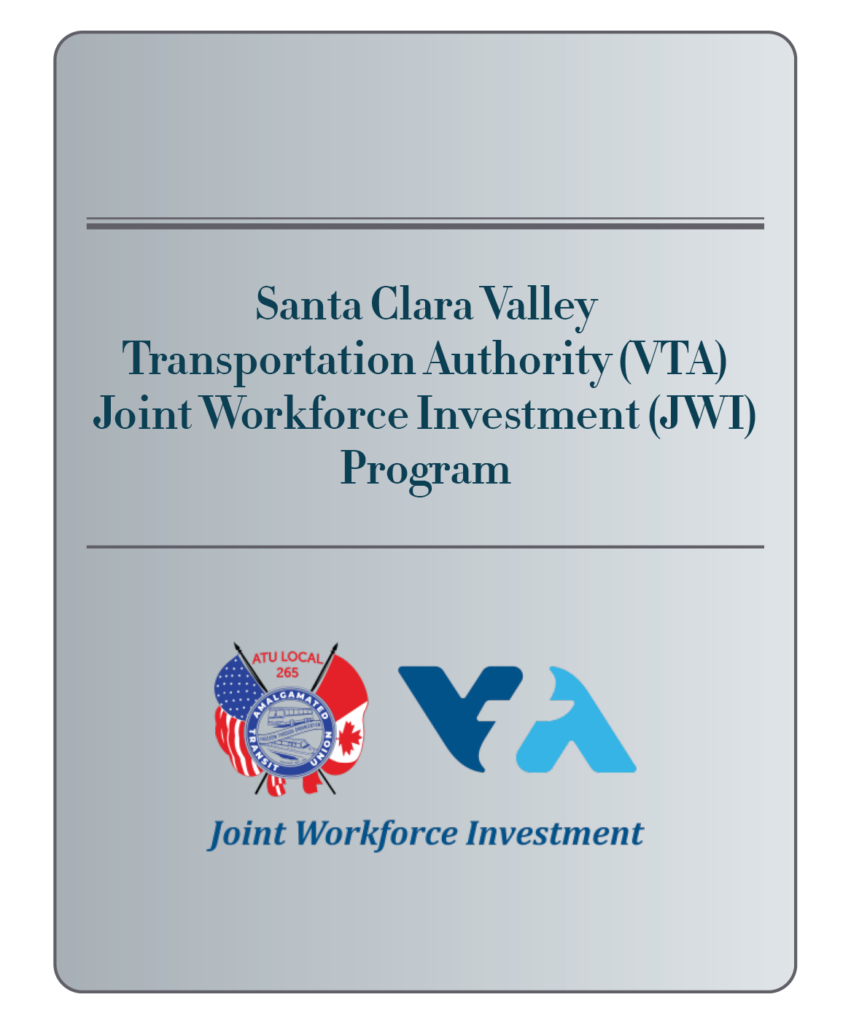
Santa Clara Valley Transportation Authority (VTA) Joint Workforce Investment Program
This case study examines the Joint Workforce Investment (JWI), established in 2006, which is a joint labor management partnership between the Santa Clara Valley Transportation Authority (VTA) and the Amalgamated Transit Union Local 265 (ATU). It includes discussion of three primary programs brought together under the JWI initiative: the Maintenance Career Ladders Training Project (MCLTP), New Operator/Mentor Pilot Project, and Health and Wellness Project.
ICF International
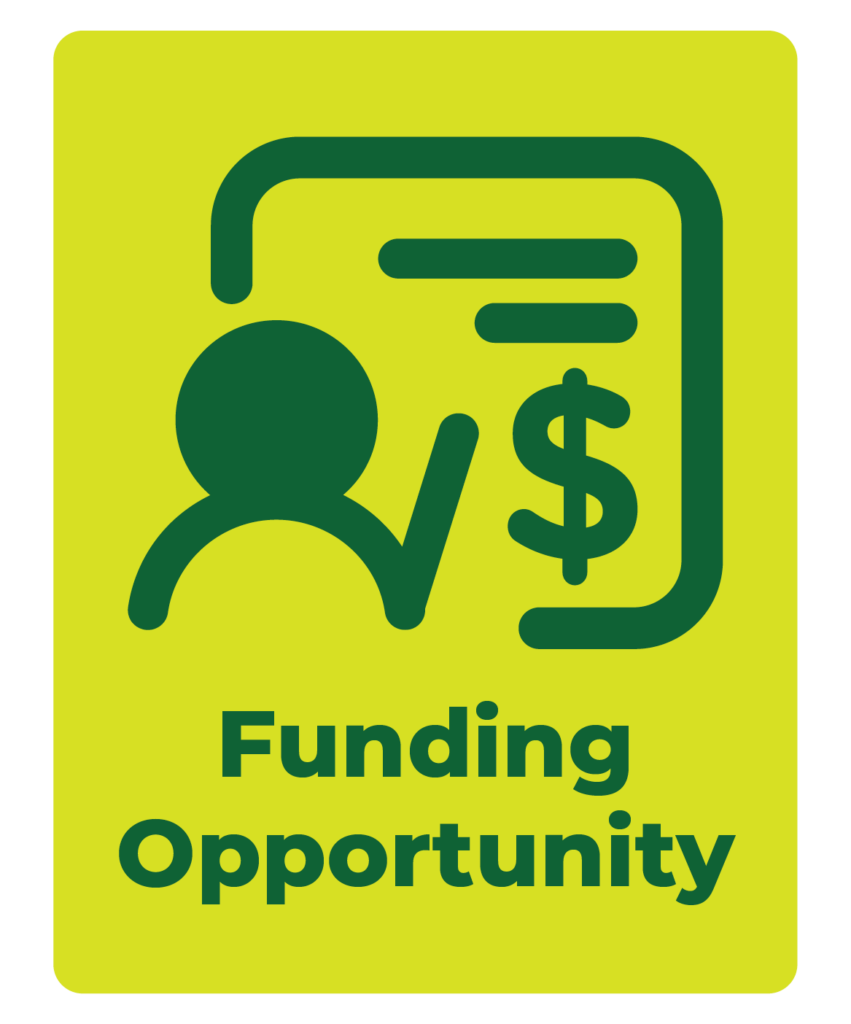
Appalachian Regional Initiative for Stronger Economies (ARISE)
Administering Agency: Appalachian Regional Commission (ARC)
Closing Date for Applications: Applications will be accepted on a rolling basis
Funding Range: $73.5M available total
Geographic Scope: Regional
Description: ARISE is an ARC initiative that aims to drive large-scale, regional economic transformation through multistate, collaborative projects across Appalachia.
With the additional funding provided by the Bipartisan Infrastructure Law, also known as the Infrastructure Investment and Jobs Act of 2021, ARC launched ARISE to strengthen Appalachian business and industry, and to grow and support the development of new opportunities across multiple states.
Posted January 20, 2023 to TWC Resource Center. Please refer to the link below for the most up to date information from the funder.
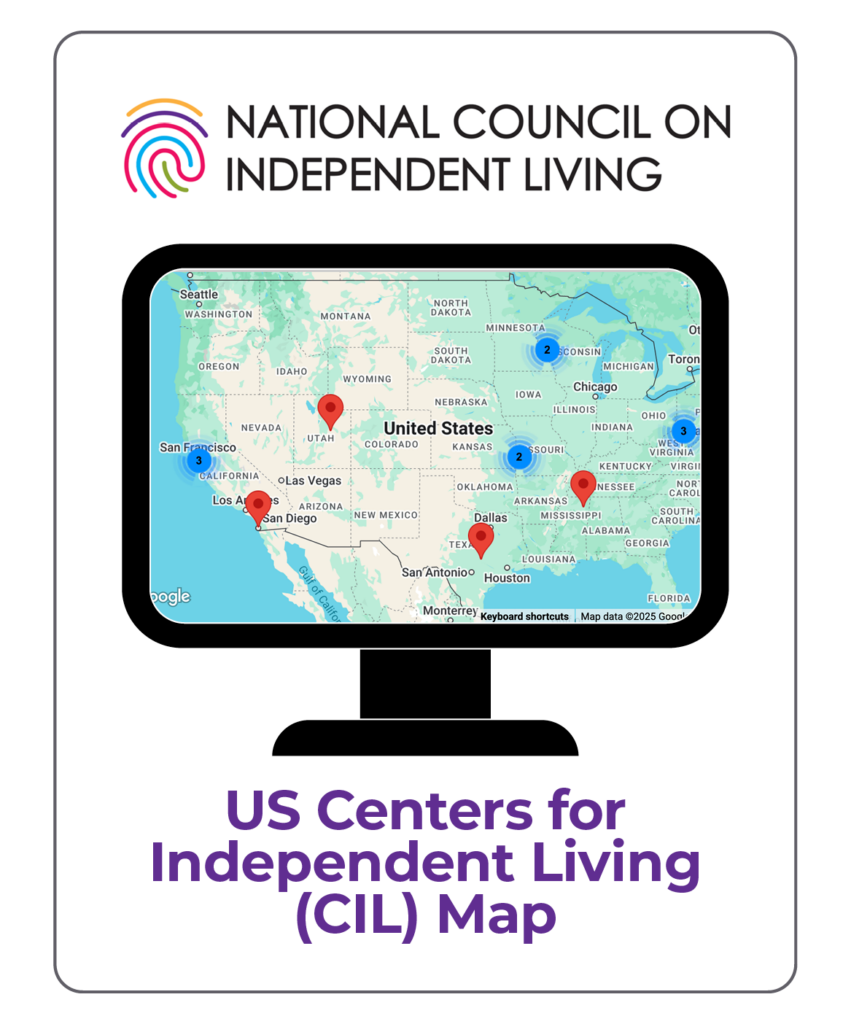
US Centers for Independent Living (CIL) Map
National Council on Independent Living
NCIL maintains a map of US CILs on their website. CILs can be a great partner in connecting people with disabilities to transit jobs. CILs are advocacy organizations run by and for people with disabilities in local communities. CILs provide peer support, independent living skills training, information and referral, individual and systems advocacy, and transition from institutions and secondary education. Use the link below to find the nearest your nearest CIL.








